Thoughts on 150+ PC Game Pass games
Is PC Game Pass worth it? Yeah, I think it mostly is, unless you’re ideologically opposed to it. You can stop reading now if you want. Otherwise…
I play quite a few games - about a hundred each year. Not all to completion, mind you, as I’ve learned not to push myself to play games I don’t enjoy. And sometimes I’m just curious to get a feel for the game even if I know I won’t be interested in playing it for long. If I were in the games industry, I’d call it professional curiosity. But I’m not - I still have a day job, and as of the last couple of months I even have a kiddo to keep fed and entertained.
So I’ll have to admit - I’ve been kind of living under a rock. I do follow gaming news and gaming releases somewhat closely, but anything with the word “subscription” or “Xbox” (being almost exclusively a PC gamer) just flies over my head. And so “Xbox PC Game Pass as a subscription” went past my metaphorical spam filter. My eyes glazed over whenever I heard someone talk about it.
Well, last month I got curious. Turns out PC Game Pass has over 400 games in it, and for $11.99 a month it felt like I had to check it out. It had a few releases I anticipated but was apprehensive about picking up, namely Avowed and S.T.A.L.K.E.R. 2: Heart of Chernobyl. In my mind, I felt like I would’ve paid $120 to check those two games out - which “buys” me 10 months of PC Game Pass. Fine Microsoft, I’ll try your subscription box.
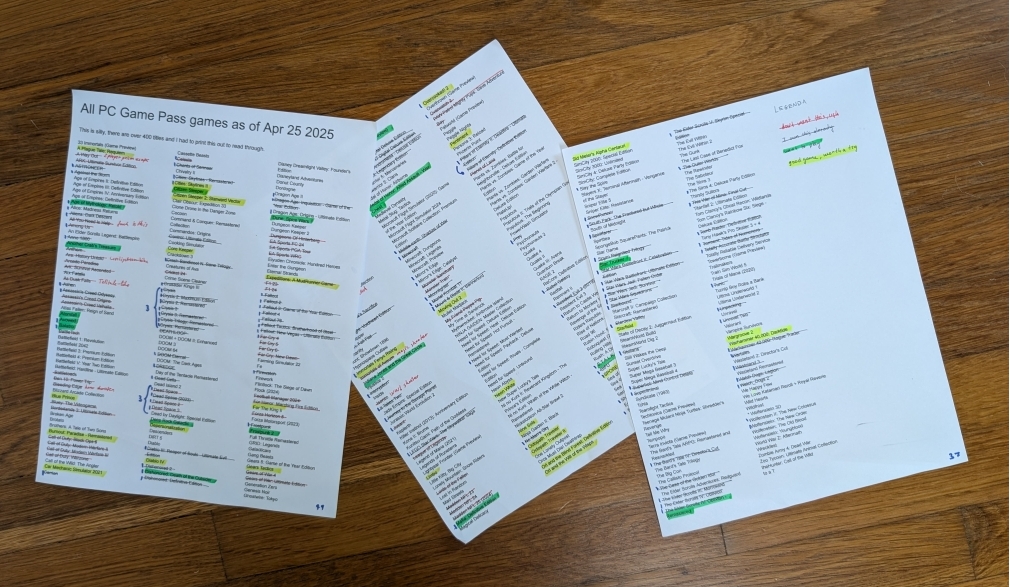 Did I spend three weeks doing this? Yes I did. Was it worth it? Yes it was.
Did I spend three weeks doing this? Yes I did. Was it worth it? Yes it was.
But guess what - I played a sizable number of games on PC Game Pass, and there are a few games I haven’t yet played but have good things to say about them (and in a few cases - not-so-good things, but I try to largely form my own opinions). Initially, I planned to include thoughts on all 400-or-so games on PC Game Pass. Turns out I don’t have the patience for that, and after spending a couple of days researching and finding the best way to describe these games - it felt like I was just regurgitating information available elsewhere, from folks who have done a better job covering those titles. So I’ll be only talking about the titles I played, titles in my backlog, and titles I’ve heard a lot about (and just can’t keep quiet).
In fact, I don’t have the patience to count how many games I included in this 15,000 word post, but it’s somewhere between 150 and 170: my counts aren’t adding up, and it’s getting late. So - “Thoughts on 150+ PC Game Pass games” it is.
Let’s go through all the games I played or have uneducated opinions on in batches… maybe genre-by-genre? These are all just my opinions (and for games I haven’t played - opinions of reviewers I trust superimposed on my genre and mechanical preferences). I’m not a professional game reviewer, so these aren’t particularly balanced either.
For the sake of being informative, I’ll assume you’ve never heard of any of these games (“what’s Grand Theft Auto?”), and I’ll include a brief pitch for each one. I’ll clearly specify if I haven’t played the game and the opinions aren’t my own. If a game you like isn’t on this list - let me know - maybe that’s a game I just must play!
PC Game Pass added many games and even removed some while I was writing this – it took me three weeks to go through my own thoughts on the games I’m familiar with, and as I’m getting ready to hit publish I see a dozen new titles. Either way, I apologize for this list being out of date even before it goes live. I still hope it’s an entertaining read – because I’m having a good time putting it together.
I’ll be going down the list in reduced order of familiarity with the genres.
Role playing games
PC Game Pass has a pretty damn great selection of RPGs, games that’ll keep you occupied for hundreds of hours. And not the “looter-shooter where has my time gone” type, but you’ll be closing these games with a thoughtful face on and thinking about the storylines on your way to work. Or school/kindergarten, if you’re new at being alive.
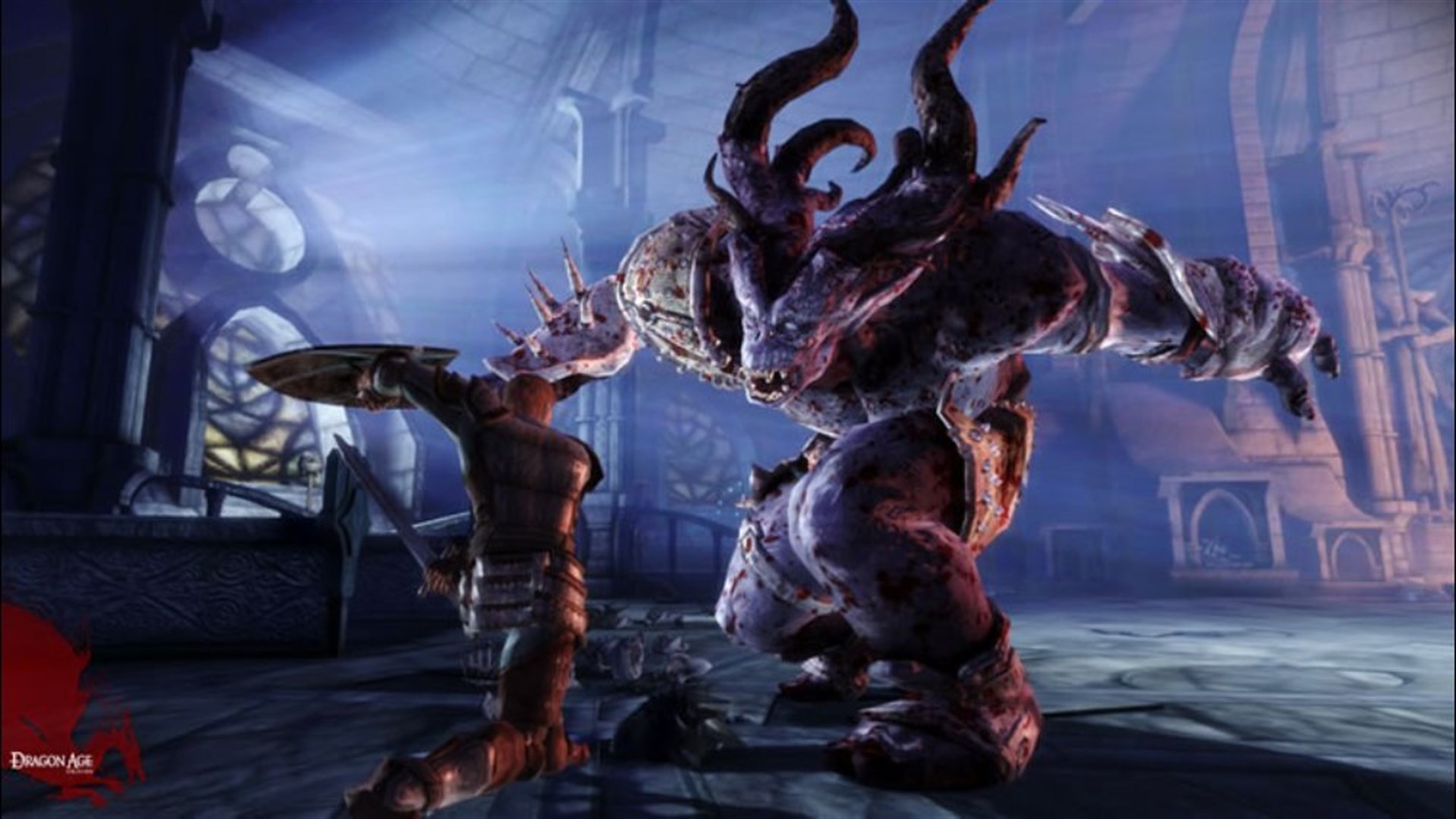 Dragon Age: Origins - it’s about companions, quests, and, of course, slaying monsters.
Dragon Age: Origins - it’s about companions, quests, and, of course, slaying monsters.
There’s Dragon Age: Origins (2009), and Dragon Age II (2011), both fantastic role-playing games which provide a breadth of narrative choices. Origins is my personal favorite, as the game revolves around the selection of six origins which completely change the early game and influence the rest of the playthrough. PC Game Pass has Dragon Age: Inquisition (2014) too, but I didn’t care to play more than a couple of hours back when it came out - I had a visceral reaction to the streamlined combat system, and the characters didn’t grip me. Your mileage may vary.
The post-apocalyptic survival Fallout games. We have two developers here making two different types of games. Black Isle Studios, the original developers of Fallout 1 (1997) & Fallout 2 (1998), lost the rights to the series, but came back for 2010’s Fallout: New Vegas (which is technically Fallout 3.5, and is made by Obsidian Entertainment - former employees of Black Isle Studios). Bethesda acquired the rights to the Fallout franchise and made Fallout 3 (2008), Fallout 4 (2015), and Fallout 76 (2018). Fallout 76 is an MMO, but it’s not particularly good at being neither a Fallout game nor an MMO.
There’s also Fallout: Brotherhood of Steel (2001) - a tactical RPG spin-off that didn’t gain much popularity. I played it a bit, it didn’t leave much of an impression.
In the unlikely event you’ve never played and want to see what it’s all about, I’d recommend playing Fallout: New Vegas (2010) and Fallout 4 (2015). These are the two most recent single-player installments from both studios, and you’ll be exposed to the best the Fallout universe has to offer. Dive into prior titles based on your enjoyment of these two (I’d especially recommend Fallout 2).
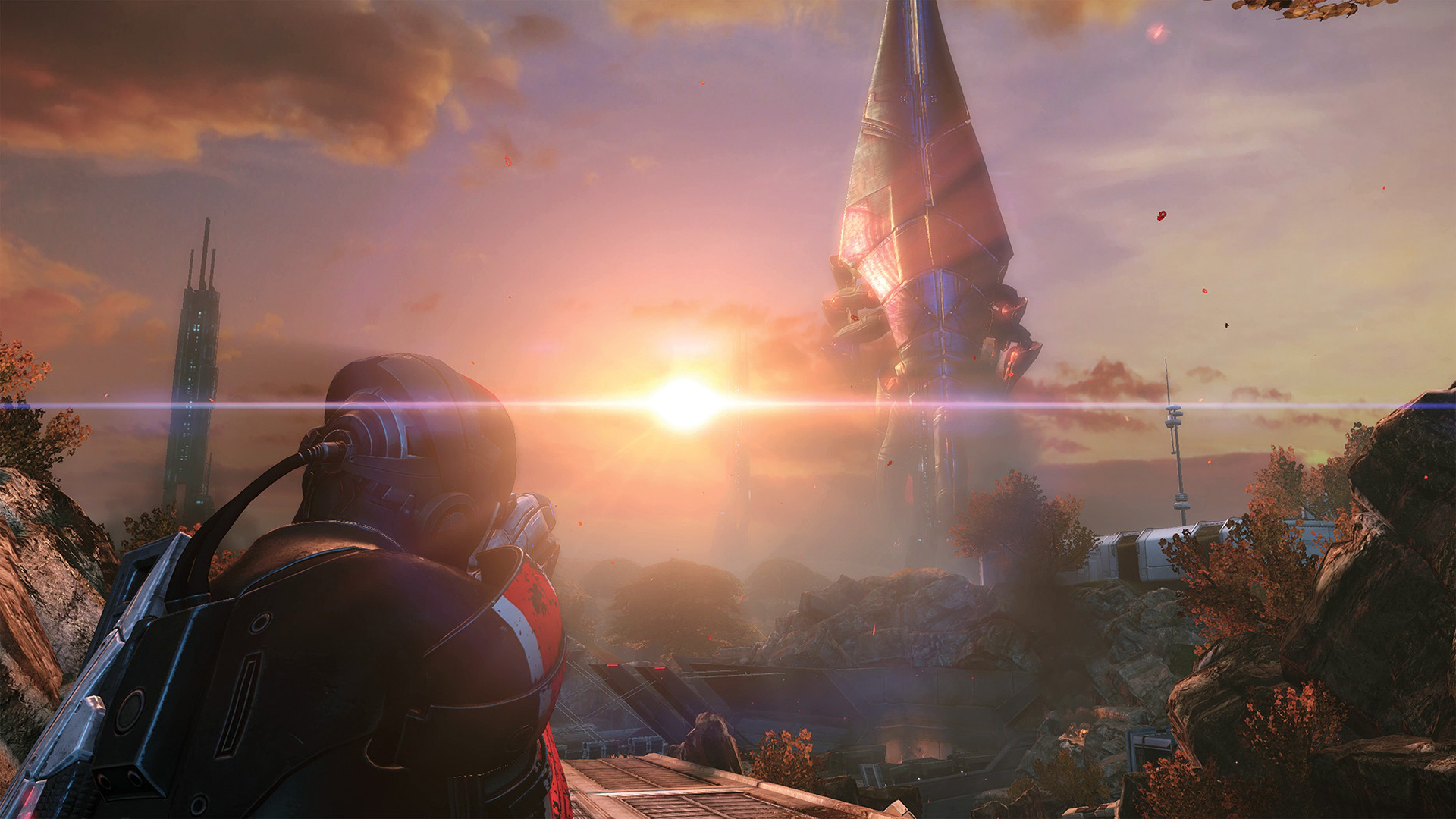 Mass Effect: Legendary Edition includes the first (best) three Mass Effect games, remastered.
Mass Effect: Legendary Edition includes the first (best) three Mass Effect games, remastered.
The Mass Effect series - the original trilogy has been updated in 2021 with the release of Mass Effect: Legendary Edition. Real characters - the companions will feel like your friends by the end of the journey, a fantastic story where victories feel earned, an engaging world with established lore, and - thanks to updates to the Legendary Edition - fun and dynamic third-person combat. If space operas or anything sci-fi excites you - you have three amazing games packaged here. Don’t touch Mass Effect: Andromeda, it’s missing a soul. Or you know, whatever generates your mass effect fields, commander.
I have deep appreciation for the Pillars of Eternity (Definitive Edition: 2017) franchise. These are isometric Computer Role Playing Games with a capital C: fantasy world, memorable characters, companions, character sheets with pages of stats. And it’s nearly single-handedly responsible for a modern revival of CRPGs. But ultimately I ended up taking a break after 30-or-so hours of Pillars of Eternity (which is maybe a third to half way into the game’s story). This was in big part due to where I was in my gaming journey at the time: Pillars of Eternity universe lore is dense, and I mean really dense. And I wasn’t ready to immerse myself in a completely new universe, with its own deities, jargon, and dialects. Each character you meet is thrilled to shower you in pages and pages of exposition. The writers built a deep and meaningful world, and felt so excited to share everything about it with the player: and I think that was to the game’s detriment.
I believe Pillars of Eternity II: Deadfire (2018) addresses many of these concerns - being closer to The Lord of the Rings than to The Silmarillion, and the game is sitting in my backlog - I’m excited to give it a shot when I have 60-90 hours to kill. Avowed was a recent entry in the series, adopting a first-person perspective and making the gameplay much more dynamic: and you can read my mixed thoughts about it here, but I did feel like it suffered from many of the issues I’ve had with the first game.
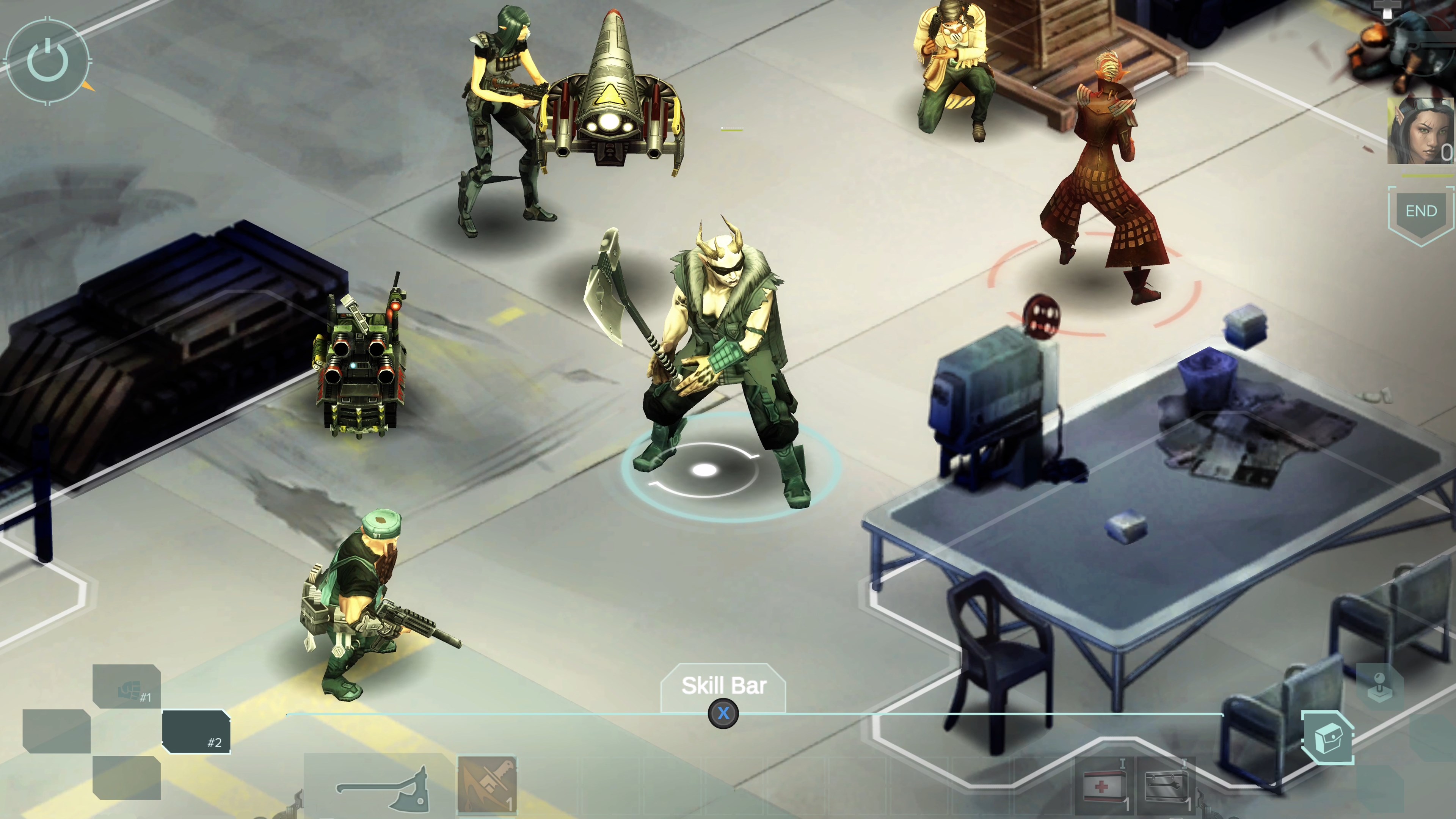 The Shadowrun trilogy - combat is serviceable, but it’s the non-combat encounters and storylines that are known to be the highlights.
The Shadowrun trilogy - combat is serviceable, but it’s the non-combat encounters and storylines that are known to be the highlights.
I’m yet to meaningfully play the Shadowrun Trilogy (the games are sitting in my CRPG backlog), but I only hear praise about the series. It’s an odd cyberpunk-meets-magic world, complete with troll netrunners and high elf commandos. It sounds weird, whimsical, and from my early impressions the game just oozes style. I’ve been told Shadowrun: Hong Kong is the best entry point into the series, if the premise grips you.
Bard’s Tale series is funny as hell. If you want an isometric RPG that doesn’t take itself seriously, this is your game. I’ve given this series a shot with The Bard’s Tale III, and while I’ve stopped playing after 5-or-so hours (I’m sure life got in the way), I had a lot of fun with it.
The Elder Scrolls series needs no introduction. But in case it does: you are dropped in a vast, intricately handcrafted and lore-filled open world (take note, Pillars of Eternity - I think engaging lore must be drip-fed), and you’re free to do whatever you want and express yourself through unique character builds. You can pick up Skyrim (Special Edition - 2016), Oblivion Remastered (2025, read my thoughts here), and my personal favorite - Morrowind (2002). PC Game Pass even includes Battlespire (1997) and Redguard (1998), the two games I haven’t played. Oh, and The Elder Scrolls I: Arena (1994) and The Elder Scrolls II: Daggerfall (1996) are free to play (free-free, not just Game Pass free), if you’re curious about the older games.
The Outer Worlds (2019) is a role-playing game from Obsidian studios (those are the guys that made Fallout: New Vegas). While this satire of space corporate dystopia falls short of the studio’s heights, it can be a good time. I wouldn’t pick it over many other titles on this list, but it’s a humorous, at times poorly paced, but an earnest role-playing game that stays in its lane and generally respects your time (it only takes about 20 hours to beat).
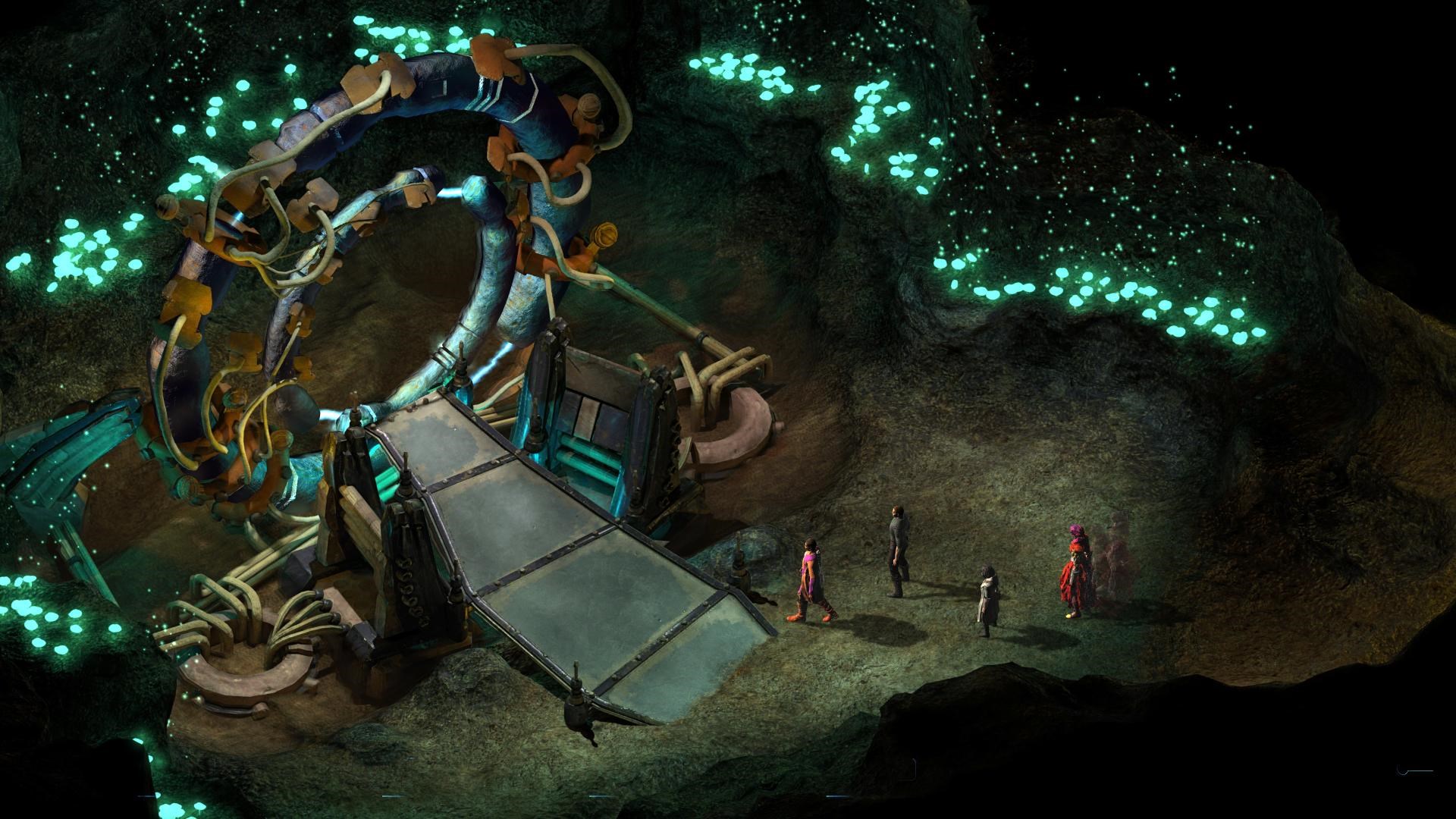 Torment: Tides of Numenera - all magic is merely long forgotten and poorly understood technology.
Torment: Tides of Numenera - all magic is merely long forgotten and poorly understood technology.
Torment: Tides of Numenera (2016) is one of my all-time favorite CRPGs. And I didn’t even finish its direct inspiration - Planescape: Torment. There’s something exciting about the Ninth World - a world so old, that the incomprehensible technology of civilizations past is the magic of today. I enjoyed the writing, companions, and story too. I highly recommend it if you enjoy being in a weird, whimsical, and magical world.
Warhammer 40k: Rogue Trader (2024). I have a love-hate relationship with Owlcat games (the studios behind the Pathfinder PC games, as well as Rogue Trader). They build deep, engaging, and epic sagas, but they often require an equal level of investment - you have to learn the complicated CRPG systems, familiarize yourself with dozens of leading characters and in-depth lore, play through acts as long as many other games, and be ready to sink North of a hundred hours into the experience. But you get what you put in - these are damn good CRPGs. I’m 90 hours in, and still in the 4th act (out of 6) of my Rogue Trader playthrough: I have my cathedral of a spaceship, entire worlds under my dominion, and a big looming threat that needs to be dealt with.
I was late to the party and didn’t play the original Wasteland, nor its follow-up Wasteland 2 (2013). Somewhat of a shame, since the original Wasteland game is the predecessor of the Fallout series. But I did play Wasteland 3 (2020), and it was awesome. I enjoyed the predictable but well-paced story, packed-to-the-brim world, vibrant characters, and difficult but fair tactical gameplay. The game doesn’t take itself too seriously, and works well - it’s a tight, focused experience that I highly recommend to any tactical RPG fan. I heard Wasteland 2 offers similarly enjoyable tactical gameplay, but has noticeably weaker story and bland characters. The original Wasteland was remastered in 2020 to mixed reviews, and I’m still curious to check it out some day.
We’ve also got the Diablo series: it’s an action RPG, but you’ll just have to tolerate this being on the same list as Pillars of Eternity. Diablo is a top-down monster-killing, loot-gathering, and stat-leveling role-playing game where the protagonist (you) cuts through hordes of enemies - with lots of mouse clicking. The original Diablo (1996) was a revolutionary title (real-time combat was seen as a crazy choice for an RPG), but it’d probably be hard to play today if you haven’t played the original. Diablo III turns up the brightness, adds some color to the world, and streamlines many of the systems. This is a go-to title for travel co-op on our Nintendo Switch for my wife and I (although there’s no split screen on PC). Diablo IV returns to a darker world and implements an open world - although I haven’t played that one yet.
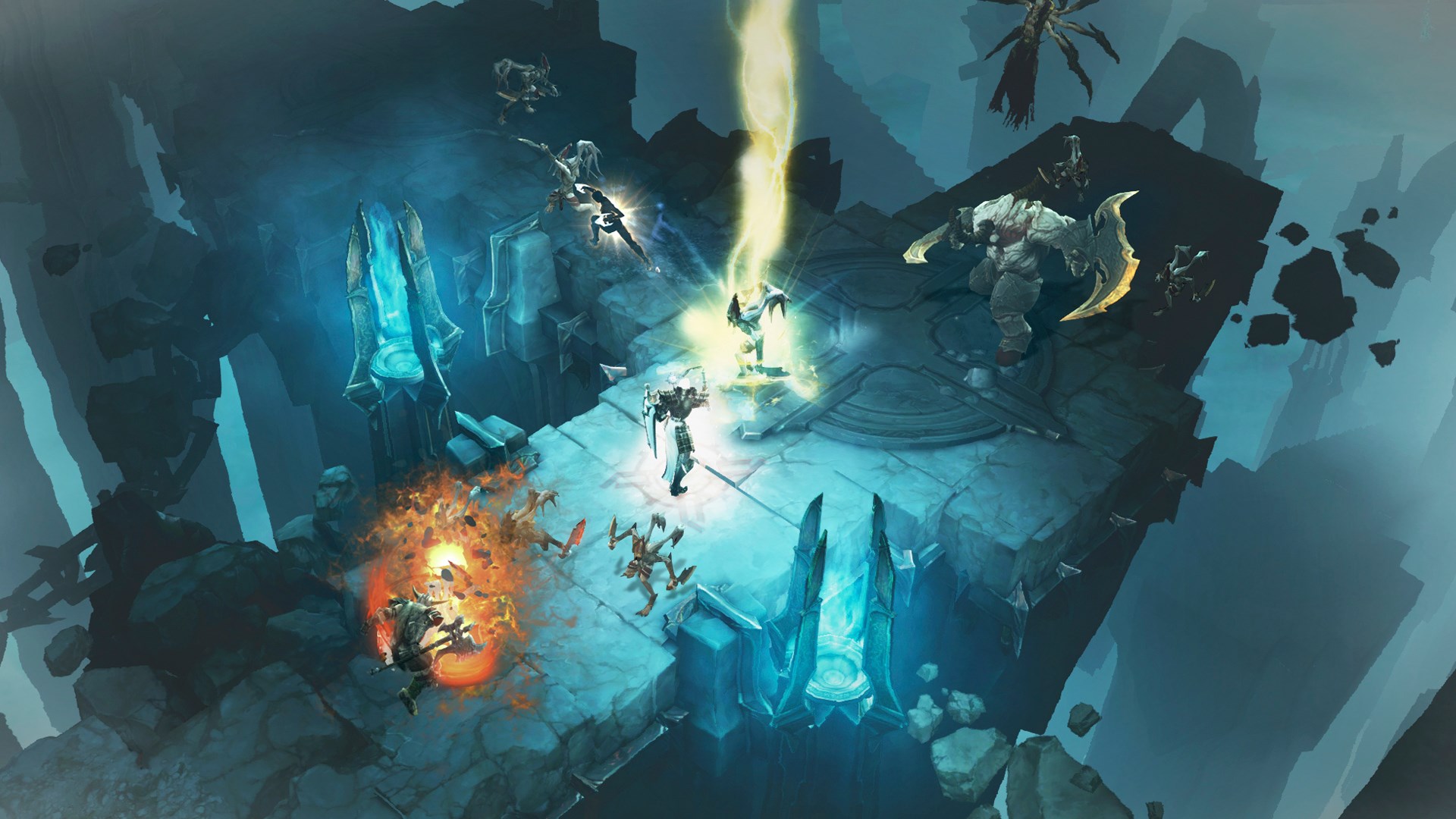 Diablo III: Reaper of Souls - good old mindless carnage, just what the doctor ordered.
Diablo III: Reaper of Souls - good old mindless carnage, just what the doctor ordered.
There were a number of controversies around Diablo III’s launch - around always-online requirements, server availability (which is a nightmare when you have to be connected to the Internet to play “offline”), and a real-money in-game auction house. Diablo III is still always-online, but the microtransactions were removed. It’s still a fun title, but I do have mixed feelings post-launch.
My personal favorite - Diablo II Resurrected (as I’ve spent an ungodly amount of time playing the original Diablo II as a kid) is absent from PC Game Pass. We truly live in a wonderful time for nostalgia re-releases.
Now we’re getting to the games I’m less familiar with - I’m relying on external impressions, and will include quips for each game. I’m not relying on Metacritic scores or any particular reviewers, just on a “the vibe” I built up about these games over the years. Take these with a grain of salt, but I figured it might be helpful to get some summaries out.
- Arx Fatalis (2002): Arkane Studios’ first-person action RPG is set in a world where the sun has failed, forcing civilization underground. It features the exploration of expansive caverns, environmental puzzle-solving, and a unique rune-drawing magic system, offering a deep dungeon-crawling experience inspired by Ultima Underworld. This one’s a classic and it’s firmly placed in my backlog.
- Clair Obscur: Expedition 33 (2025) - touted as an early game of the year contender by some reviewers. A somewhat Westernized JRPG with a unique abstract world and a focus on the theme of grief (a topic close to my heart). The combat is a blend of typical turn-based JRPG mechanics with real-time rhythm-based input. I’m planning to pick it up, despite my lack of experience with JRPGs.
- For the King II (2024): This roguelike RPG blends elements of tabletop games and strategy. I played the first installment, but found it somewhat boring. Maybe the second game’s more fun? It has co-op too!
- I played South Park: The Stick of Truth (not on Game Pass), and ended up not sticking with it - for whatever reason. South Park: The Fractured but Whole (2017) is a follow-up to the first game. Raunchy and juvenile South Park humor, party-based character RPG, turn-based combat with a basic grid in place, flexible class system, and an epic tale about the clashing of two superhero factions. If you like South Park, the humor is what will keep you invested. I might pick this one up eventually.
- Jade Empire: Special Edition (2007): An action RPG from BioWare’s golden days set in a fantasy world inspired by ancient China. The game centers on a protagonist who masters various martial arts styles and makes significant moral choices throughout the story. It’s a shame I haven’t played this.
- Octopath Traveler (2018) and Octopath Traveler II (2023): I must disclose that I’m not a huge Japanese Role Playing Games fan, probably due to lack of exposure. I played a demo back when Octopath Traveler released. This is a critically acclaimed turn-based JRPG with a unique pixel art style following the interconnected journey of eight different protagonists (with extensive backstories, from what I could tell).
- Starfield (2024): Bethesda’s latest release - this game critically stumbled, the premise didn’t grip me, and mentions of hundreds of loading screens put me off the game. I’d like to make up my own opinion on Starfield some day, so it’s nice to see it included in PC Game Pass.
There are a few dozen more RPG names I recognize on PC Game Pass (mostly JRPGs), but I’m not familiar enough with those to provide a meaningful quip. Needless to say, the RPG selection here is top-notch.
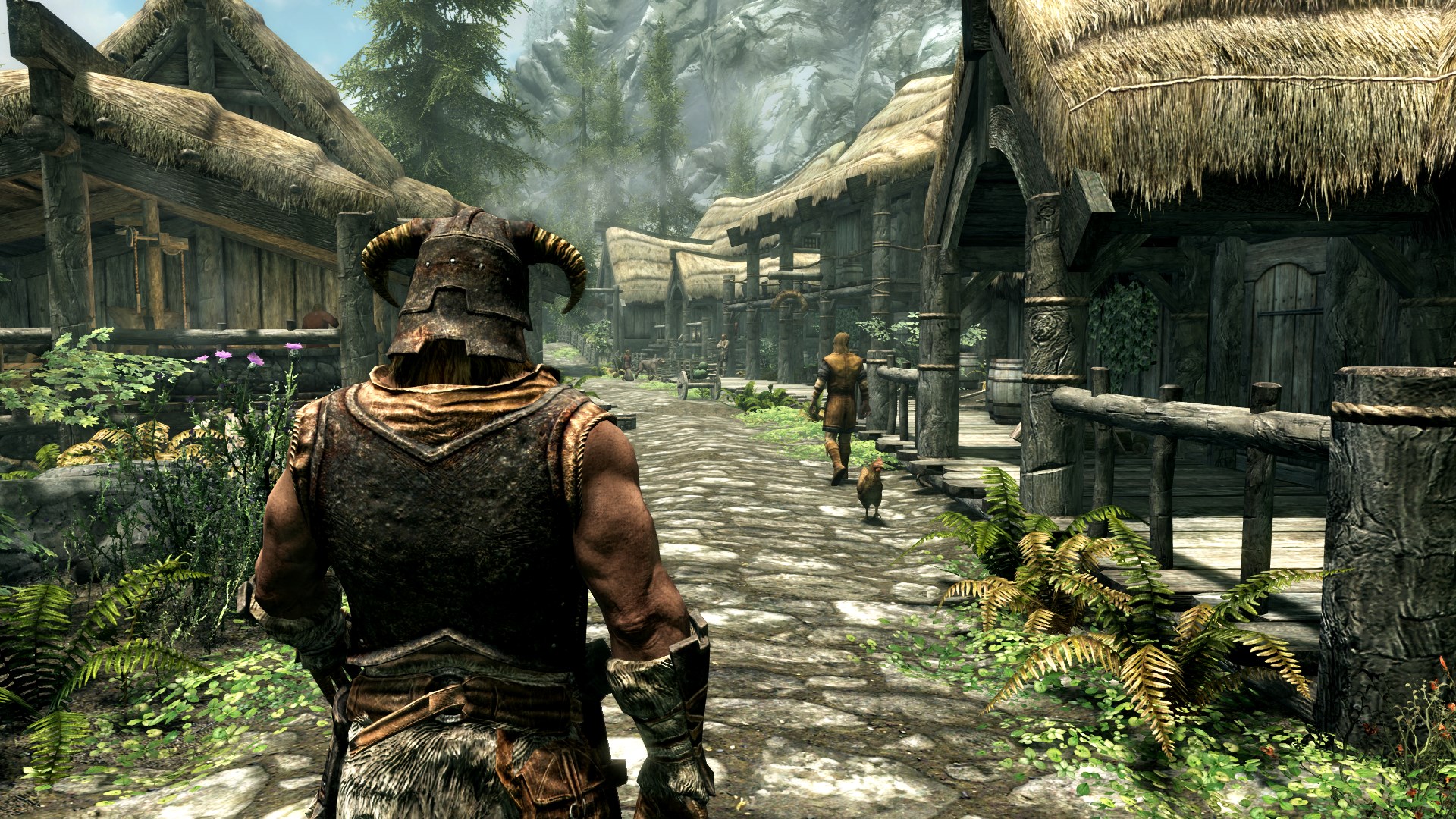 The Elder Scrolls V: Skyrim Special Edition - ah shit, here we go again.
The Elder Scrolls V: Skyrim Special Edition - ah shit, here we go again.
Now, we live in a modern day and age, and some of these games have been released ten, fifteen, and in some cases even twenty-five years ago. If I were to pick a play order for the RPGs from this list that I’ve played, I’d do:
- The Mass Effect: Legendary Edition
- This is a polished, contained, epic, modernized experience. It’s long (that’s three games in one package), but is easy to get into and is well worth the time investment.
- The Elder Scrolls V: Skyrim (Special Edition - 2021)
- One of the best-selling games of all time. Follow that up with The Elder Scrolls IV: Oblivion Remastered. I’d love to recommend The Elder Scrolls III: Morrowind, but I understand that my love is tainted by nostalgia, and a game from the early 2000s would not be easy to get into in 2025.
- Warhammer 40k: Rogue Trader (2024)
- I’d play this if you’re willing to sink countless hours and some mental fortitude into the game: you’ll get a great story of epic proportions, and there’s a lot of game inside this game.
- Torment: Tides of Numenera (2016)
- While Pillars of Eternity 2: Deadfire is an isometric CRPG with better critical reception, and might even have more going for it - I think Torment: Tides of Numenera is a focused and unique experience. The visuals of modern-era isometric CRPGs age particularly well.
City, empire, and family builders
This is a loose category including city builders, tycoons, but also story generators like Crusader Kings and Stellaris - couldn’t think of another place to toss them. While there aren’t as many options as for RPGs, there’s still a sizable library of quality games.
Cities: Skylines (2014) is one of the greatest city builders of all time (or really, a traffic manager in disguise). But PC Game Pass offers a version of the game that’s been backported from Xbox (probably for compatibility). There’s no mod support, and it only comes with one expansion (out of nearly a dozen available since the game’s release), and graphically it looks behind the Steam version. While I sunk hundreds of hours into designing my own villages, towns, and cities, I don’t think this is the best way to experience this wonderful game, not even close.
 Cities: Skylines II - here’s a tip: your cities will look much better if you don’t rely on grids and instead follow terrain curves.
Cities: Skylines II - here’s a tip: your cities will look much better if you don’t rely on grids and instead follow terrain curves.
Its sequel, Cities: Skylines II (2023), isn’t as well received as the first game, but I think that’s in big part because of the breadth and depth of side content the first game collected over the years. I played Cities: Skylines II and felt like it fell short of its predecessor. But it has better UI than the first game, looks better, and if you’re a newcomer to the series - a fine introduction. And as a base game, Cities: Skylines II is much better than Cities: Skylines stripped of its expansions (which cost money, lots of money).
Crusader Kings III (2020) is commonly referred to as the medieval incest simulator - yeah you heard that right. While you can play Crusader Kings as a typical grand strategy, this game shines when you focus on personal drama between various rulers and members of their courts. Backstab, blackmail, and sleep your way to securing an empire, only to have it fall apart when your children start a civil war trying to divide it among themselves. Don’t play this game to win, play for the drama, it’s a fantastic time.
While Crusader Kings III is the medieval incest simulator, Stellaris (2016) is the alien species genocide playground. You get to design your own intergalactic species - be it mercantile zealous slug people who eschewed their bodies in favor of robotic vessels, sentient democratic lizards secretly ruled by a shadow council, or even a ravenous gestalt consciousness made up of apes. On my last playthrough, I played as an empire of sentient mushrooms who ruled the galaxy with an iron fist after being elected the custodian of the galaxy under a (manufactured) premise of containing an intergalactic threat. It was rad.
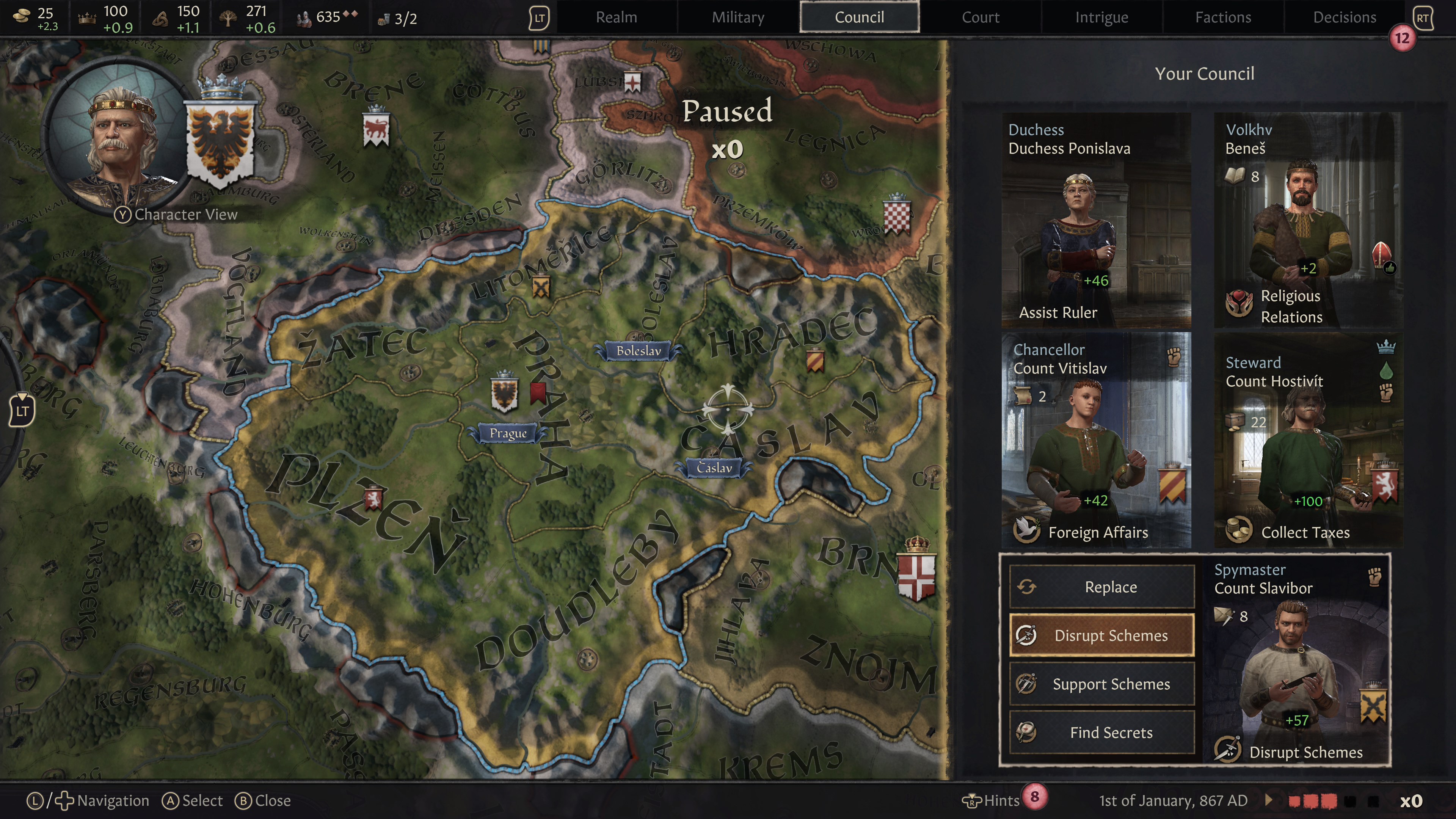 Crusader Kings III: honest council members are hard to come by and cost their weight in gold.
Crusader Kings III: honest council members are hard to come by and cost their weight in gold.
Anno 1800 (2019) is a grand colonialism city (or more precisely: cities and outposts) builder. It’s all about utilizing the available space, satisfying citizen needs, establishing trade routes, and there’s some naval combat and neighbor diplomacy. The game opens up once you discover the new world and try to set up complicated naval supply chains across the new and the old world to keep your economy running. I’d give the campaign a shot to get familiar with the mechanics, and then dive straight into the sandbox.
I’ve played Frostpunk (2018), and had a good time with it. Frostpunk nails in-game progression and avoids much of the late-game bloat that’s common for city builders. As it gets colder, your population decreases, and your city shrinks - and you have to make tough choices and make do. I’m yet to play Frostpunk 2 (2024), but it doubles down on the idea - starting you with a prebuilt city, and you having to shrink and tear it apart as the resources dwindle. It sounds fun, it’s in my backlog.
In Jurassic World: Evolution 2 (2021), you get to build a Jurassic Park (d’oh). It’s a perfectly adequate take on a zoo tycoon genre. The dinosaurs can escape and chomp on the visitors, and you can hop into a vehicle in third person to tranquilize them, which can be pretty cool the first couple of times. Play if you’re a fan of Jurassic Park.
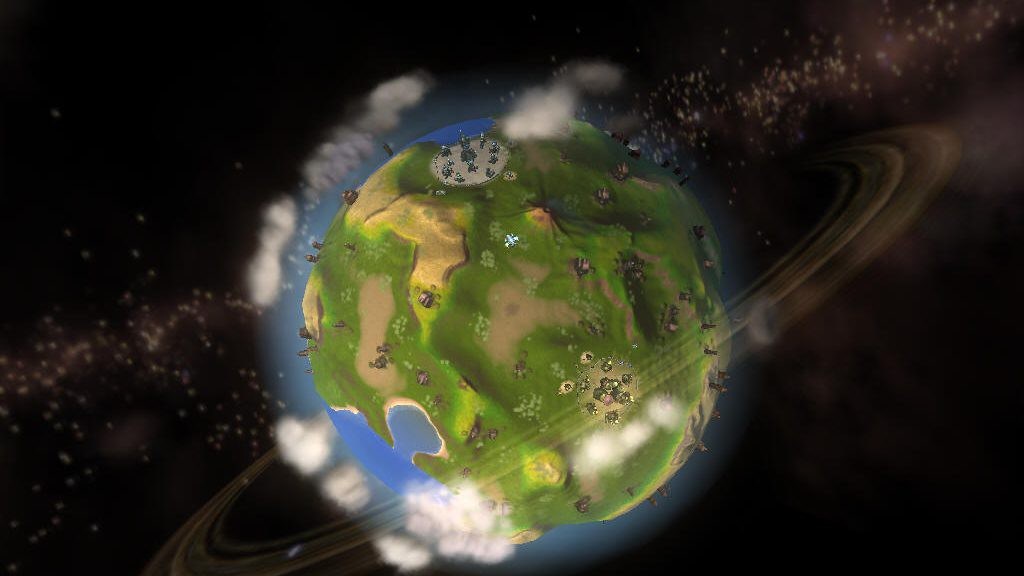 Spore - the whole planet, nay, universe is yours to play with.
Spore - the whole planet, nay, universe is yours to play with.
In Spore (2008), you build a creature piece by piece as it advances from being a single-celled organism to a space-faring civilization capable of terraforming other worlds to their liking. It’s four-to-five games in one, really: a 2D cell stage, a 3D roam-around RPG-lite creature stage, real-time strategy tribal and city stages, and (yet another RPG-lite) adventure space stage. It’s an ambitious title which doesn’t deliver in certain areas, but it has lots of charm, and what’s there is a good time.
I’ve only played the first Sims - back in the early 2000s. I heard the second game is awesome, but the game strayed further and further into microtransaction and paid pack territory, culminating with the complete The Sims 4 experience clocking in at $1,235 as of late 2024. Although who am I to judge, one of my favorite game series is Total War: Warhammer, and all the base games and DLCs clock in at a little under $500. I haven’t played The Sims 3 (2009) nor The Sims 4: Deluxe Party Edition (2014), but the games have a cult following for a reason, and if you can get over the price of the DLCs - you’ll have a good time. I think you get base The Sims 3, and a single expansion pack (out of a whopping 98 currently sold) included for The Sims 4.
Two more games I haven’t played but have definitely heard the most about:
- Manor Lords (early access) - I’m really excited about this one - a village/town builder with battles and ability to pop into third-person view - but it’s in early access, and I try to avoid games until they’re finished. Life’s too short to pay to test games.
- SimCity 2000: Special Edition (1995), SimCity 3000: Unlimited (2000), SimCity 4: Deluxe Edition (2003), SimCity: Complete Edition (2013) - critically acclaimed city builders. Critical reception for SimCity (2013) isn’t that great, but outside of that - this is the original city builder.
If you haven’t played many games of this genre, I’d recommend you pick up one of the giants included with PC Game Pass. If you’re interested in a more grounded game, consider engaging in the traffic simulation disguised as a city builder that is Cities: Skylines II (2023). If medieval intrigue is your calling, try plotting against your neighbors in Crusader Kings III (2020). If you’re into sci-fi, see your own species through centuries in Stellaris (2016).
Strategy and tactics games
Yeah-yeah, strategy and tactics games are two completely different beasts, but I don’t have as much to say about the genre when it comes to the PC Game Pass offerings. I commit a further travesty of combining real-time and turn-based games on one list - it’s slim pickings when it comes to games I’ve personally played in the turn-based genre.
Against the Storm (2023) is a fun indie real-time roguelite city builder strategy game. I wouldn’t bundle it with other city builders - it’s not a particularly relaxing experience, and playing it feels a lot more like playing (an albeit slow-paced) RTS. You establish temporary settlements in harsh, storm-ravaged forests as you gather resources and complete objectives before the inevitable Blightstorm hits and wipes away all traces of civilization. I’d recommend playing on a higher difficulty once you get your bearings (as it unlocks the engaging blight mechanic).
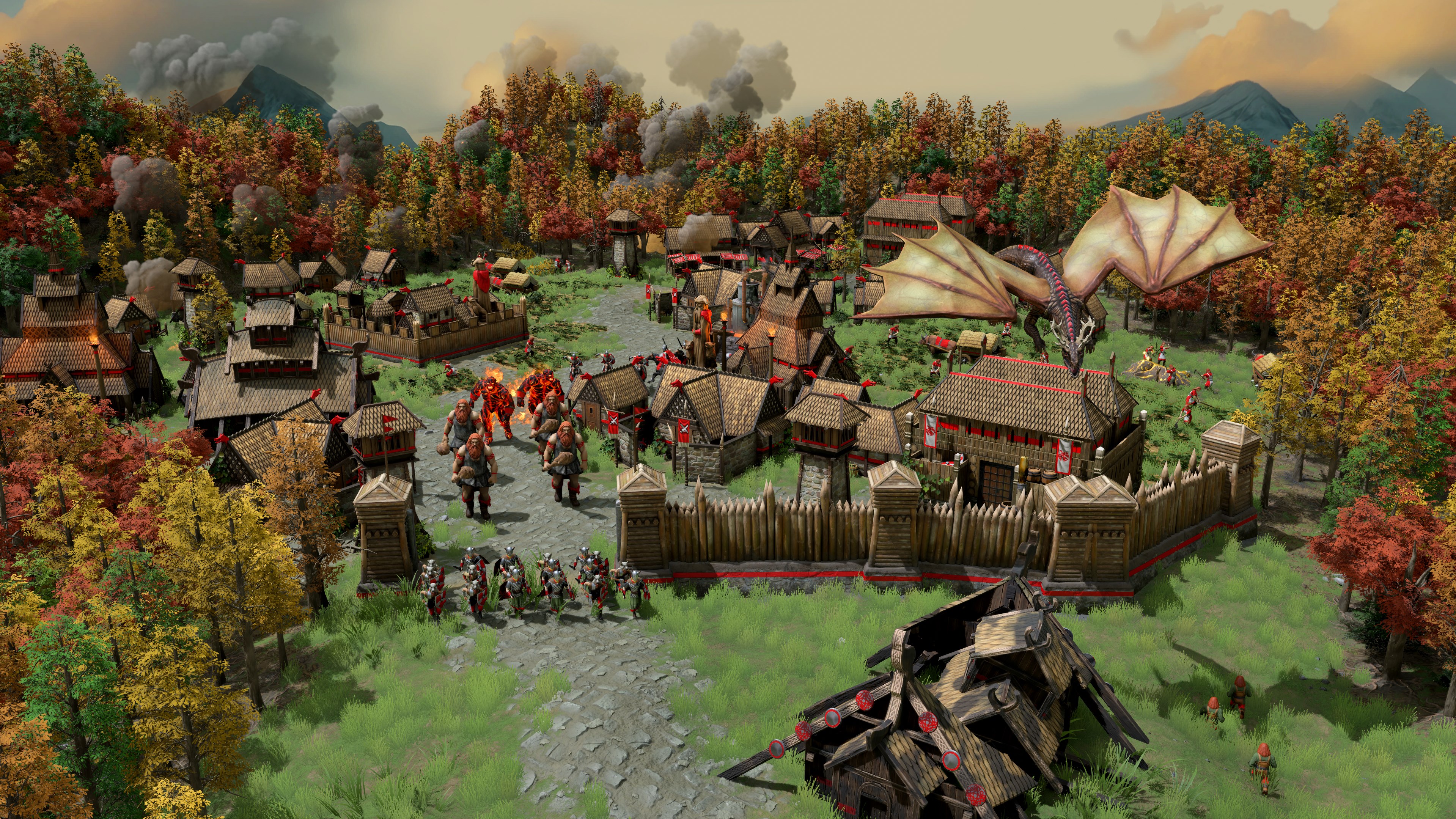 Age of Mythology: Retold - not a mere graphic overhaul, many of the game systems were improved.
Age of Mythology: Retold - not a mere graphic overhaul, many of the game systems were improved.
Age of Mythology is one of my all-time favorite strategy games. That’s my childhood speaking right there if you can’t hear it. In this game you control Greek, Egyptian, Norse, and Atlantean civilizations, gather resources, build and clash armies, and summon mythical units as you advance through different ages. I find the remake available on PC Game Pass - Age of Mythology Retold (2024) - to be inoffensive. It improves graphics, animation, and sounds - bringing this real-time strategy into the modern day and age. It makes much needed balance improvements and adds a trove of new features - improving magical god powers and introducing a new late-game age - the age of wonders. The single-player campaigns are engaging and tell a good story. It’s fun to pop into the occasional skirmish match too.
In real-time tactics Aliens: Dark Descent (2023) you control a squad of four marines as you try to get off an infested planet and descend deep into xenomorph hives. The movement sensor beeps with tension, the rifles sound just like they did in the movies, and xenomorphs are terrifying. I had a really good and stressful time playing through the game, but I locked myself into a hard difficulty and, since you can’t drop down the difficulty, gave up on it at around the halfway point after banging my head against the wall one too many times. I’d still like to come back to this game in the future to play at a difficulty I could hack, my backlog’s ever-growing.
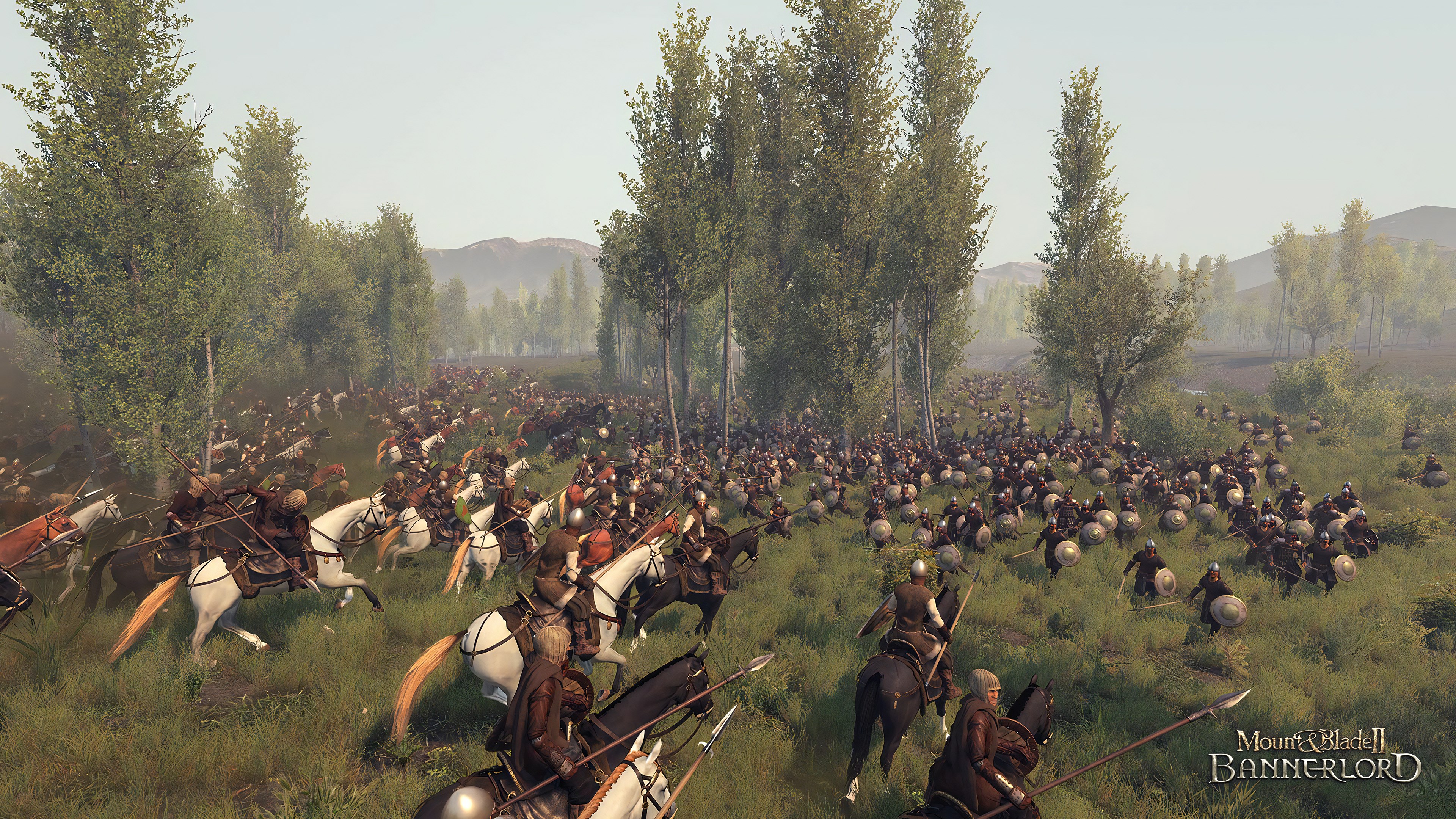 Mount & Blade II: Bannerlord - a true general personally leads their troops in battle.
Mount & Blade II: Bannerlord - a true general personally leads their troops in battle.
Mount & Blade II: Bannerlord (2020) on the other hand isn’t a particularly difficult game. It also doesn’t exactly belong in the RTS territory, but I don’t think it belongs anywhere else either. You create a character, recruit an army from nearby villages, and fight or trade your way to glory - by getting hired as a mercenary, making alliances, owning a workshop, running caravans, or even starting your own kingdom. Although be prepared that the castle you just successfully besieged will get claimed by your liege who swooped in last moment with the “we got it from here” attitude. The gameplay can get a bit shallow at times, but Bannerlord’s sheer quantity of medieval warlord simulation mechanics makes up for occasional lack of depth.
Totally Accurate Battle Simulator (2019) is a fun little auto battler. You have access to a set of units (some more ridiculous than others), a set amount of points to spend, and an enemy force to defeat. Place your pawns, hit play, and watch them fight (or get destroyed). It’s a fun little title to mess around in for a few hours.
Wartales (2021). If the name Battle Brothers rings a bell - Wartales is a streamlined 3D version of Battle Brothers. If it doesn’t, in Wartales you play as a band of mercenaries who wander the (low) fantasy world and perform odd jobs for cash, which always involve fighting. Or you can be a brigand and ambush caravans - that’s fine too. You customize and level up your crew, manage your camp, explore the map, and, of course, fight. Each companion can die, and I enjoyed the little stories that happened as a result.
Dune: Spice Wars is on my backlog after the Dune films reignited my passion for Frank Herbert’s novels, but I haven’t been able to make time for it.
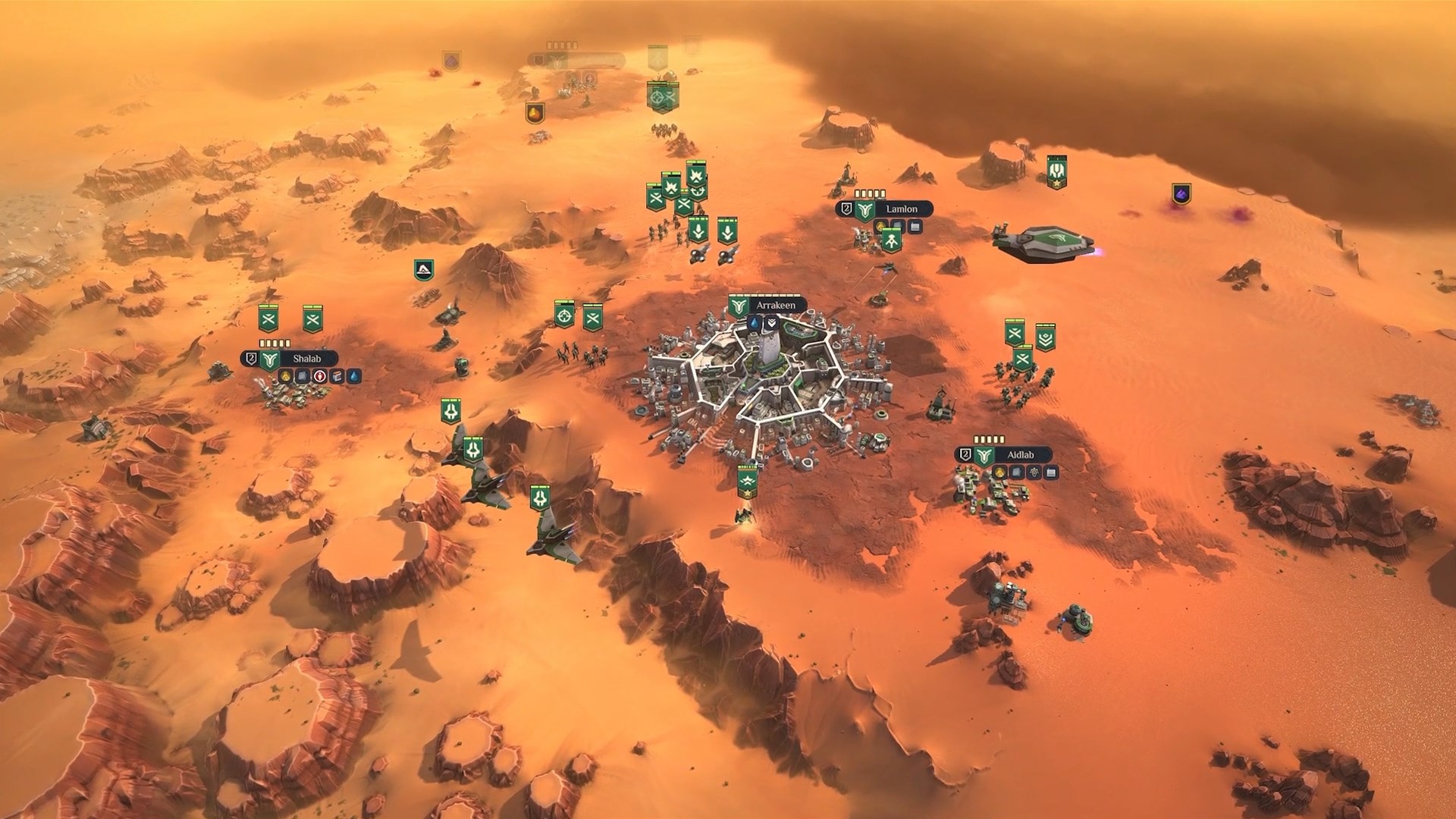 Dune: Spice Wars - this looks exactly how I would imagine a dune RTS would look like, and that’s great.
Dune: Spice Wars - this looks exactly how I would imagine a dune RTS would look like, and that’s great.
And here’s my pile of shame: I haven’t played a large number of classical RTS - specifically Age of Empires I through IV, and Starcraft I and II. In my defense, I extensively played WarCraft 3 and Cossacks as a kid. These are not on PC Game Pass, I just wanted you to know that I’m not a complete buffoon.
It’s hard to go wrong with most of the titles I listed, but if I had to pick one or two - it’d be Age of Mythology Retold (2024) and Against the Storm (2023). Age of Mythology is a classic real-time strategy with an engaging campaign and fine-tuned mechanics. Against the Storm is a fresh, bite-sized take on a city builder/RTS hybrid. I haven’t played Starcraft, but there’s a reason it has a cult following.
Souls-likes and fighting games
I love the Dark Souls series, so this genre’s up my alley. This is a loose collection of difficult third-person combat games with some elements popularized by the Souls series. There are a few great options for Souls-likes on PC Game Pass, regardless of your familiarity with the genre.
Souls-like doesn’t really have a strict definition - especially since the Dark Souls series is well loved for more than one aspect, but for the sake of this write-up, let’s focus on combat: games with tight, sometimes methodical melee combat, often high difficulty. Oh, and Dark Souls nor any other From Software studio games aren’t included on PC Game Pass.
I’m throwing in fighting games in the same bucket as the Souls-likes - I think both genres have a way of getting you in the zone, and I only have so many fighting games I want to talk about.
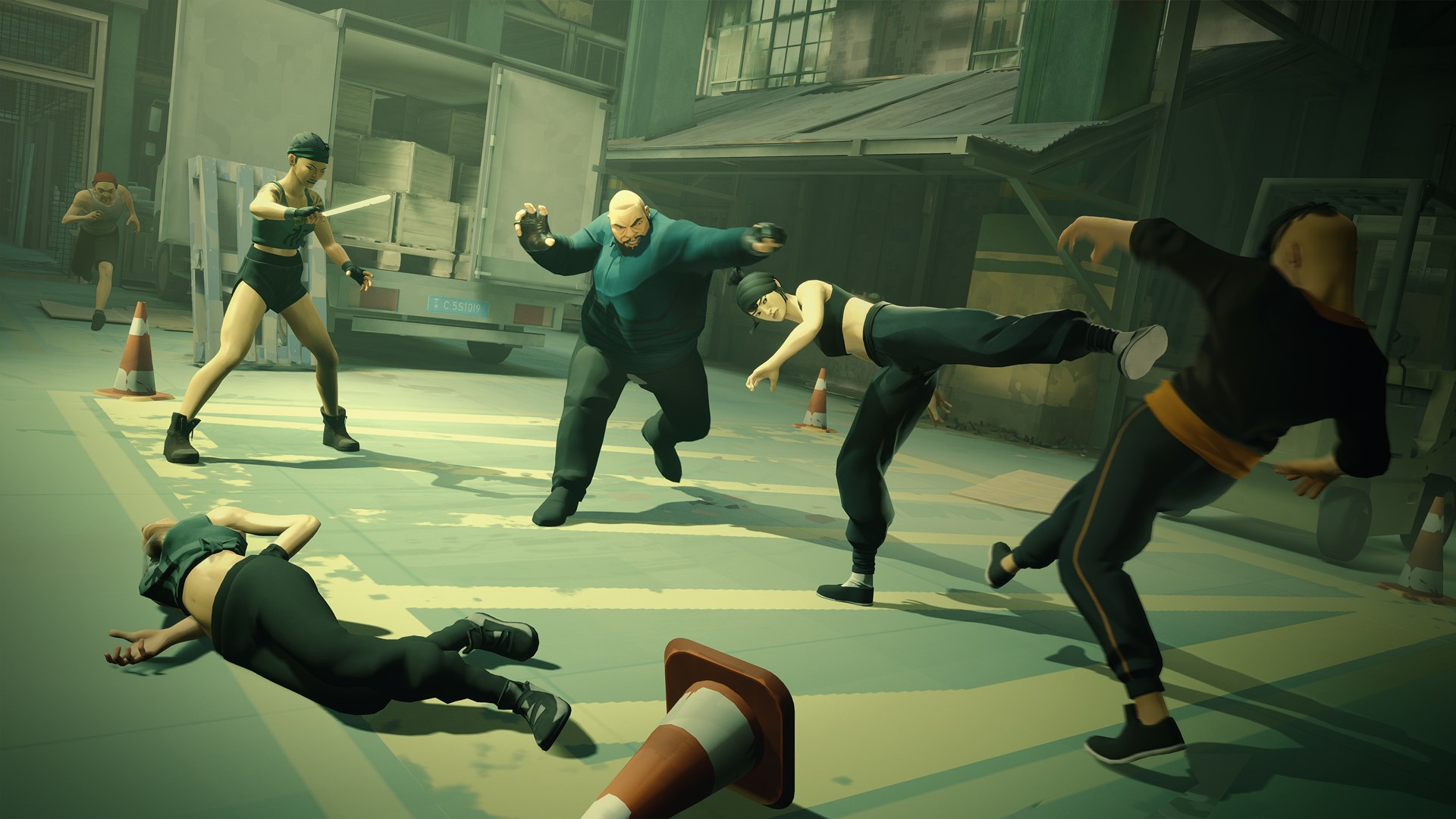 Sifu - becoming progressively less terrible at the game makes you feel like a kung-fu god.
Sifu - becoming progressively less terrible at the game makes you feel like a kung-fu god.
Sifu (2021) is a difficult, stylish beat ‘em up where you embark on a revenge quest using kung-fu. On the surface, there are only five stages in the game: but you have to make it through the whole game in one go - with each death your character ages, reducing their health, and increasing their damage. After hours of practice, the feeling of breathing through the first couple of stages is unparalleled - almost like you’re pulling off the world’s most brutal dance. There’s a twist in here too, which I won’t spoil.
Sifu left a lasting impression on me, specifically the feeling of mastery over the game’s system that you’re required to achieve to finish the game. I know kung-fu!
Unless you don’t pay any attention to gaming media, the name Electronic Arts likely makes you uncomfortable. Electronic Arts, after all, was voted worst company in America two years in a row. Well, two games here are not like the others: Star Wars Jedi: Fallen Order (2019) and Star Wars Jedi: Survivor (2023). No microtransactions, no excessive trend chasing, just a good souls-like with difficult combat (although accessibility options are available), fun exploration, engaging characters, and an emotional story. Being a Jedi feels great, even when you’re one of the last Jedi hunted by the Empire.
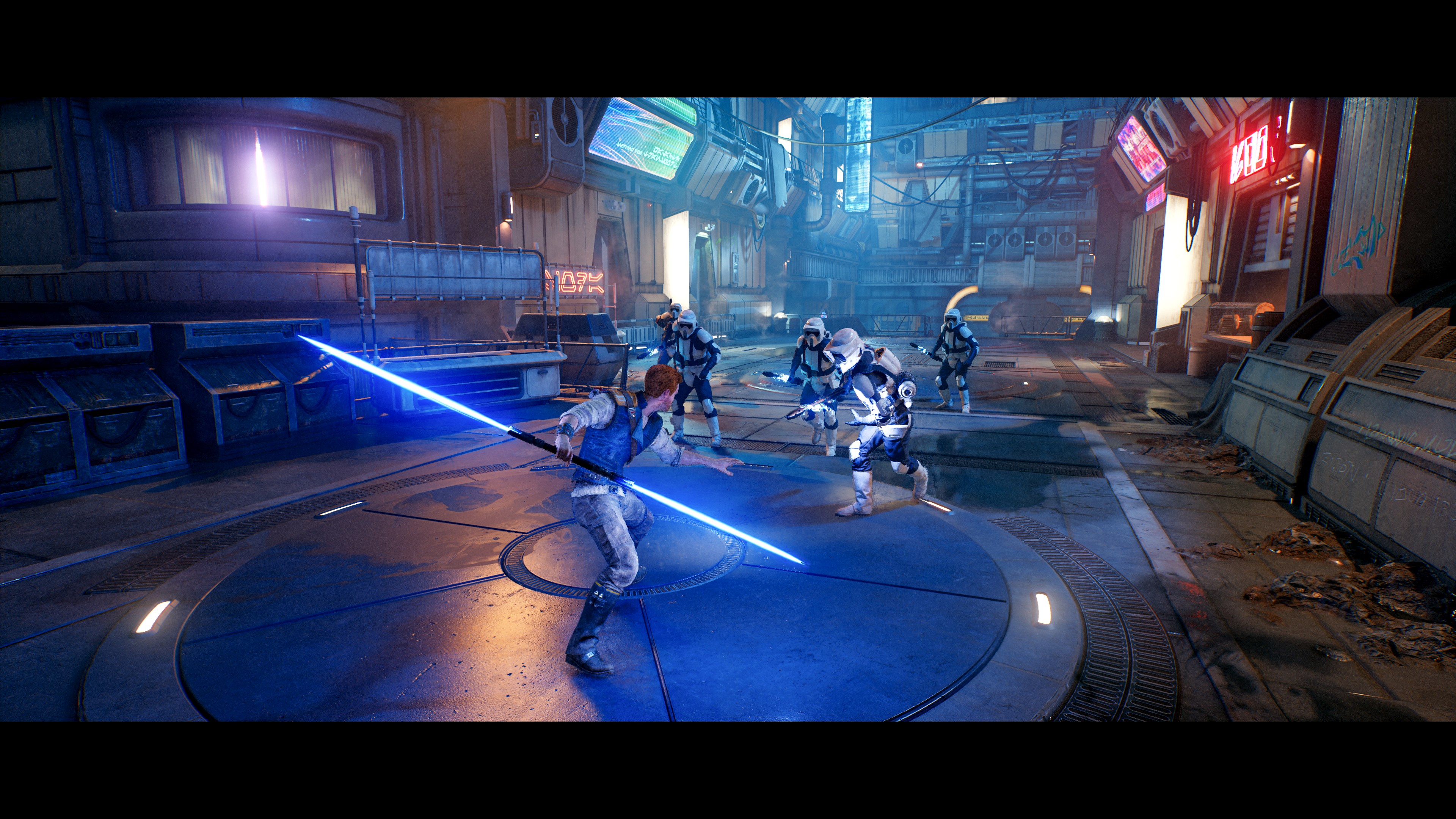 Star Wars Jedi: Survivor - being a stormtrooper is a particularly dangerous occupation.
Star Wars Jedi: Survivor - being a stormtrooper is a particularly dangerous occupation.
Both of these are great games, although the second game - Star Wars Jedi: Survivor - was poorly optimized at release, and still might require a beefier PC than you might expect. It’s still a worthy sequel, with improvements to gameplay, character development, and a punchy story. Hard not to recommend.
Ashen (2018) is a low-poly take on Dark Souls - it wears its inspiration on its sleeve, but does try to do a few unique things. The world is a bit more hopeful and less bleak, companions play a large role in gameplay and story, and the story’s a lot less obtuse and more centerpiece compared to Dark Souls. I haven’t finished Ashen - life got in the way and my attention got away from me, but I had a good time with it.
When it comes to games I haven’t played, Another Crab’s Treasure ranks high on my backlog and I’m excited to pick it up. A comedic take on the genre, I’ve been told the mechanics are tight and the story punches above its weight. That’s all I need to hear.
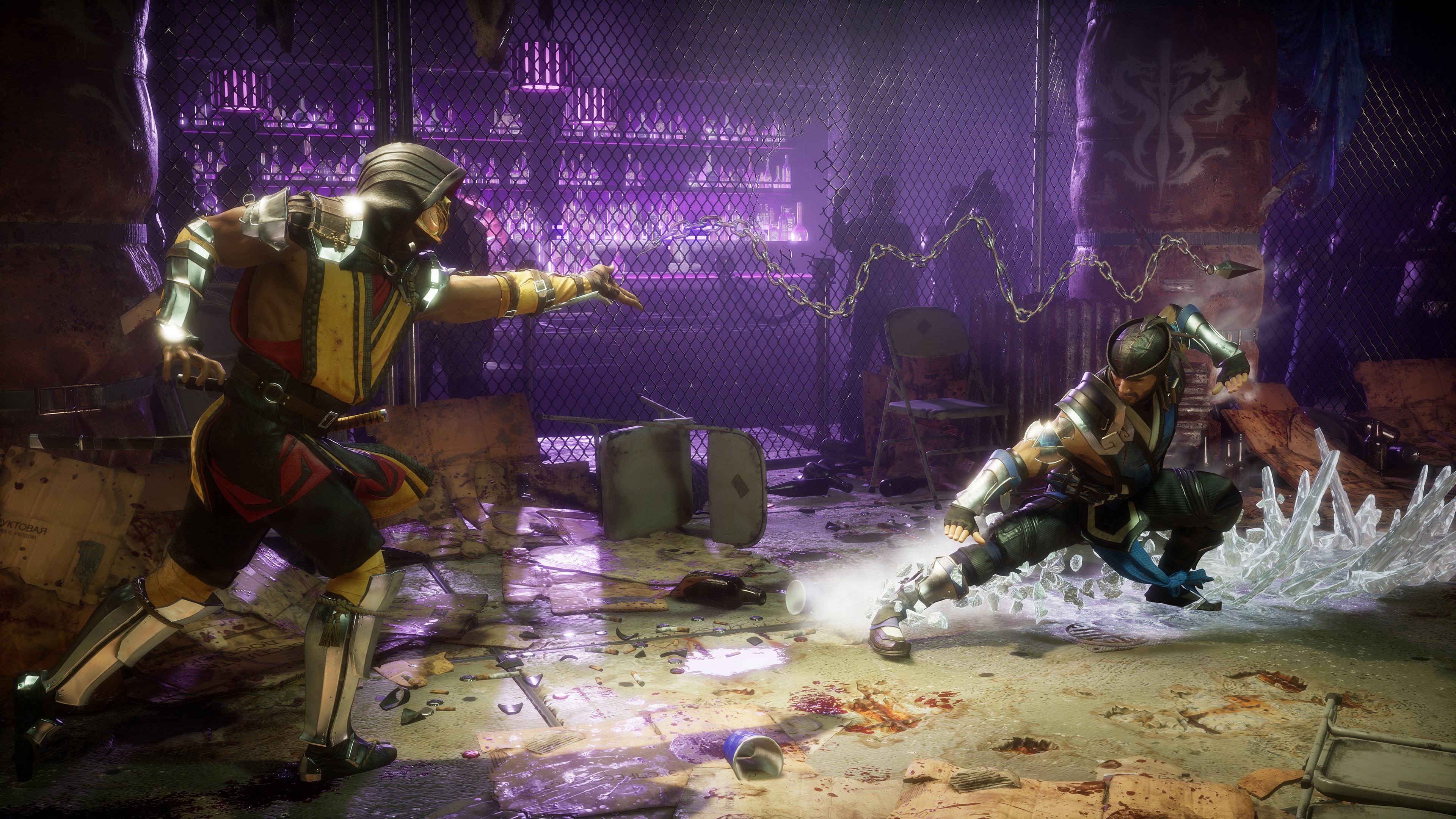 Mortal Kombat 11 - the least gore-filled promotional material for the game I could find.
Mortal Kombat 11 - the least gore-filled promotional material for the game I could find.
Mortal Kombat 11 (2019) is a gore-filled, brutal, vicious, fast-paced fighting game. Besides the fact that there’s local split-screen support on PC (which is always nice for fighting games), there’s not much else to say. I don’t have much experience in the genre, but I had a good time playing occasional matches here and there.
Given the length of the section, I feel like I must only recommend a single title if you haven’t played any of the games on this list. It’s a hard choice, but I think it must go to the Star Wars Jedi series due to its wider appeal – it nails the Souls-like mechanics and captures the feeling of being a rebel Jedi on the run in the Star Wars universe.
Immersive sims
Immersive sims are a genre of games heavily reliant on the game’s interconnected systems: there are often many ways to accomplish an objective. The systems are designed first and foremost, and the objectives are designed later - and having imagination really pays off when it comes to immersive sims, because you can think of things developers may not have. Locked door? There must be a key somewhere, or you might be strong enough to bash it down, or maybe you can crawl through the air vents, or stack some boxes to climb in through the window.
I was introduced to immersive sims rather early, around the year 2000 (for someone in my mid-30s - that’s early). My uncle introduced me to the best of the best: Deus Ex. Now I’ll be honest - I didn’t make it past the first couple of levels. I didn’t know what to do, I didn’t pay attention during the tutorial, and I didn’t read the mission objectives nor did I listen to the dialogue. But I did run around Liberty Island, Battery Park, or other iconic New York landmarks (like the subways). I still have a soft spot for New York at night, and I make my way to Battery Park every time I find myself in Manhattan. I’m one of the few people who’s sad to see fewer rats every year - these critters made New York authentic to Deus Ex. Bummer.
Immersive sim selection is slimmer on Game Pass, but does have a few banger titles - specifically highlights of the catalogue from Arkane Studios.
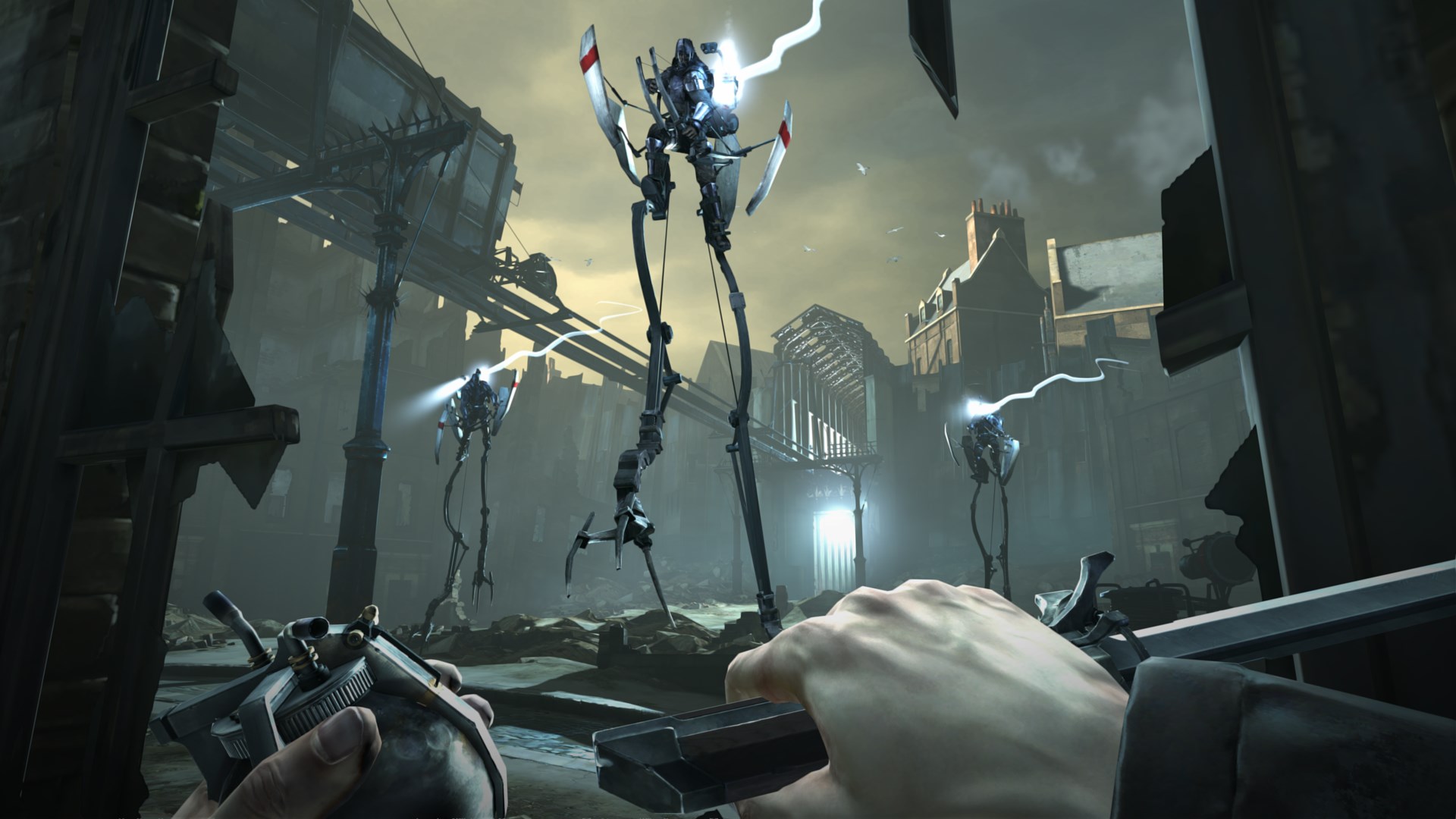 Dishonored - the game’s whaler-punk is a dark and imaginative setting.
Dishonored - the game’s whaler-punk is a dark and imaginative setting.
The Dishonored series is set in a grim whaler-punk low-magic plague-ridden industrial world. Well, through a pact with an unknown entity you now have supernatural abilities - from teleportation to summoning rats and freezing time. It’s a first-person stealth assassination game, and the more people you kill, the darker and more plague-ridden the world gets. There are more rats too - so many rats, and those aren’t your New York rats - these rats will eat you alive and won’t leave a bone standing. Dishonored (2012) holds up well, blends inventive stealth gameplay with a gripping story. The game level design is top-notch - with clever use of verticality and sightlines. You can even go for a so-called pacifist playthrough, although one could argue there are fates worse than death.
Dishonored 2 (2016) improves on Dishonored in just about every regard: and you get a chance to play as the first game’s protagonist or his (now all grown) ward. Dishonored: Death of the Outsider (2017) sees you playing as one of the side characters - providing gameplay encouraging experimentation. It tries to wrap up the story neatly, but stumbles to hit the highs of the first two games. Both games and the expansions are incredible immersive sims which I can’t recommend enough.
Prey (2016) has you explore a space station after an outbreak caused by an alien parasite. Lots of freedom on how to play the game, from accomplishing minor objectives, to choosing how to complete the game - there are a number of endings differentiated by the path you take through the game. I had an incredible time with Prey - it offers many interesting tools, pits you against dangerous enemies and difficult situations, and expects you to creatively find clever solutions. The narrative and the mystery are engaging (although the ending might stumble a bit), the space station feels lived in (up until the incident).
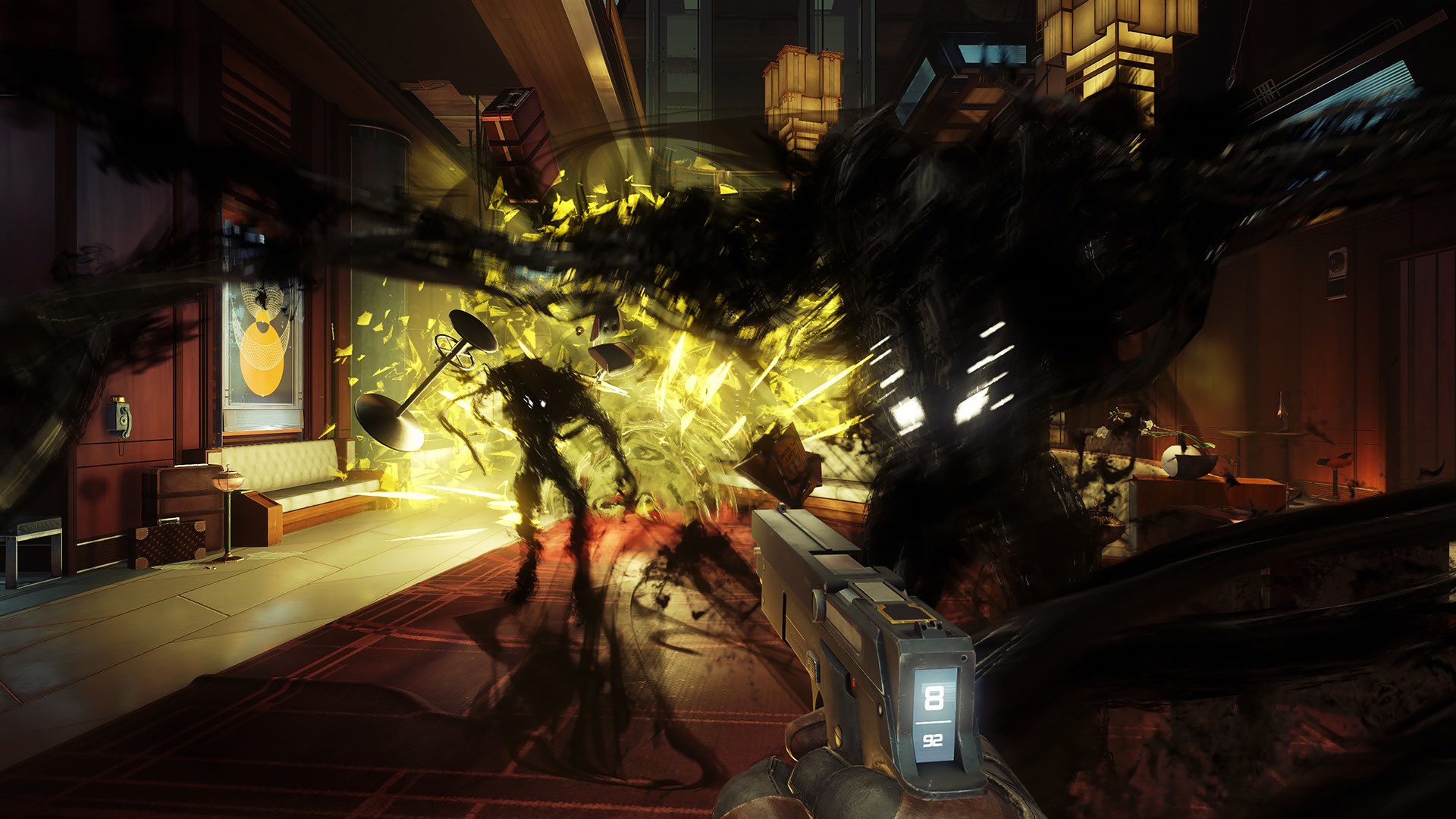 Prey - confronting the alien threat heads-on is often the last resort: there are many imaginative and engaging ways to deal with obstacles.
Prey - confronting the alien threat heads-on is often the last resort: there are many imaginative and engaging ways to deal with obstacles.
I briefly tried Deathloop (2021), but it felt derivative of prior Arkane titles. Dishonored and Prey have done this before, and haven’t aged poorly yet. Maybe you’ll have a better time with the title - but to me it felt like we’ve been there before.
If you haven’t played any immersive sims, I think Prey (2016) is the best ticket into the genre: it offers truly unparalleled freedom to accomplish your goals within the Talos station you’re stranded on.
If you’re new to immersive sims, PC Game Pass offers some excellent entry points. For a masterclass in environmental puzzle-solving and creative problem-solving in a sci-fi setting, Prey (2016) is an unparalleled experience. If you prefer a blend of stealth, supernatural abilities, and a distinct “whaler-punk” aesthetic, the Dishonored series provides incredibly well-designed levels and multiple ways to approach objectives. Both are fantastic examples of the genre’s strengths.
Survival games
Survival games combine crafting, exploration, survival, and building elements - these games master a loop getting you thinking about your next building project, resource gathering run, or uncharted planet. While I feel like the survival genre has been somewhat oversaturated for the past decade, there are some quality titles on PC Game Pass.
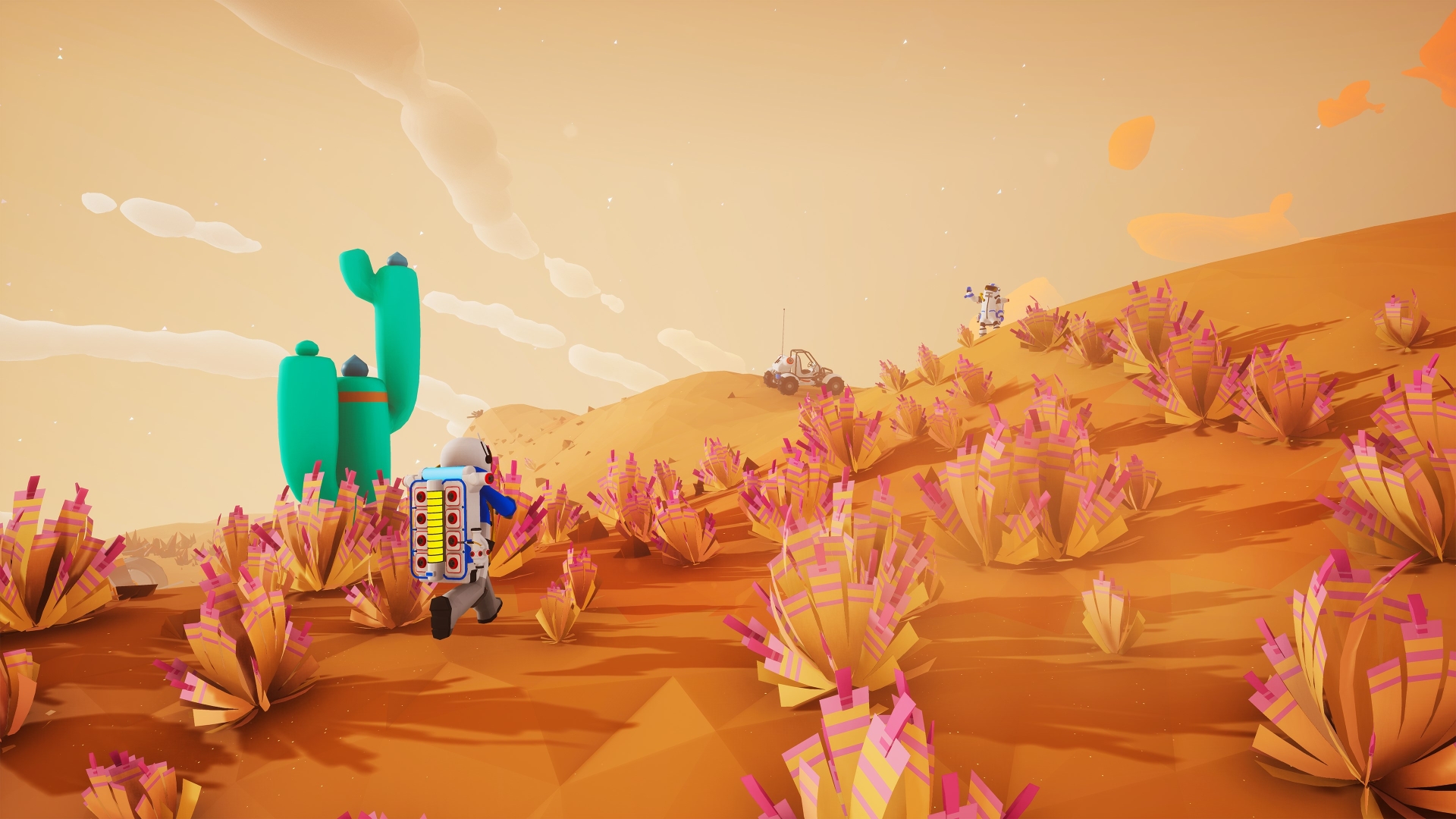 Astroneer - bright, colorful, and cheery. Don’t forget to run your oxygen tethers though.
Astroneer - bright, colorful, and cheery. Don’t forget to run your oxygen tethers though.
Astroneer (2016) is a charming, low-pressure space exploration and sandbox game. You land on procedurally generated planets, armed with a tool that can vacuum up terrain and extract resources. The core loop is simple: explore, gather resources, expand your base, build vehicles and rockets, and hop to another planet. It’s less about intense survival combat and more about creative expansion across a solar system - and there’s always some milestone to work towards. There’s a bit of mystery here too, although nothing too crazy.
I’m also a huge fan of the way astroneer handles in-game HUD and inventory - you can see the contents of your backpack right there on your back. Love seeing when interfaces take a step to immerse you further into the game.
I felt like Astroneer shines as you land on a new planet, find new types of resources and shiny things to explore, and build new tools to experiment with. As you dig, you’ll encounter sprawling procedurally generated caverns - but they can feel empty and formulaic at times. I sunk a good amount of time into Astroneer, and I think it’s worth your time.
 Minecraft - you imagination’s the limit. My imagination is usually limited by villages and castles though.
Minecraft - you imagination’s the limit. My imagination is usually limited by villages and castles though.
Minecraft (2009, updated continuously) hardly needs an introduction, but if you’ve been living under a particularly large, square rock (like me in regards to PC Game Pass), it’s the quintessential sandbox crafting and survival game. It’s a game of infinite possibility contained within a blocky, procedurally generated world. You punch trees, mine minerals, build shelter before the monsters come out at night, and then… well, you can do almost anything. I enjoy building villages and castles, occasional spelunking in cave systems, venturing into other dimensions, and putting together redstone contraptions (which teach basic programming logic gates knowledge - that’s cool).
There are many powerful systems under the hood in Minecraft. This is the survival game. But here’s a crazy suggestion - try downgrading to the 1.0.0 release in Minecraft Launcher (Settings > General > Minecraft: Java Edition Settings > Show historical versions), or maybe even to one of the beta releases if you’re feeling bold. I promise it’s not about the nostalgia - the original Minecraft was a focused sandbox, without live events and gratuitous pizzazz included in the more recent updates. The enemy of art is the absence of limitations - by working with a smaller number of blocks and having fewer gameplay systems you truly make Minecraft’s strengths shine.
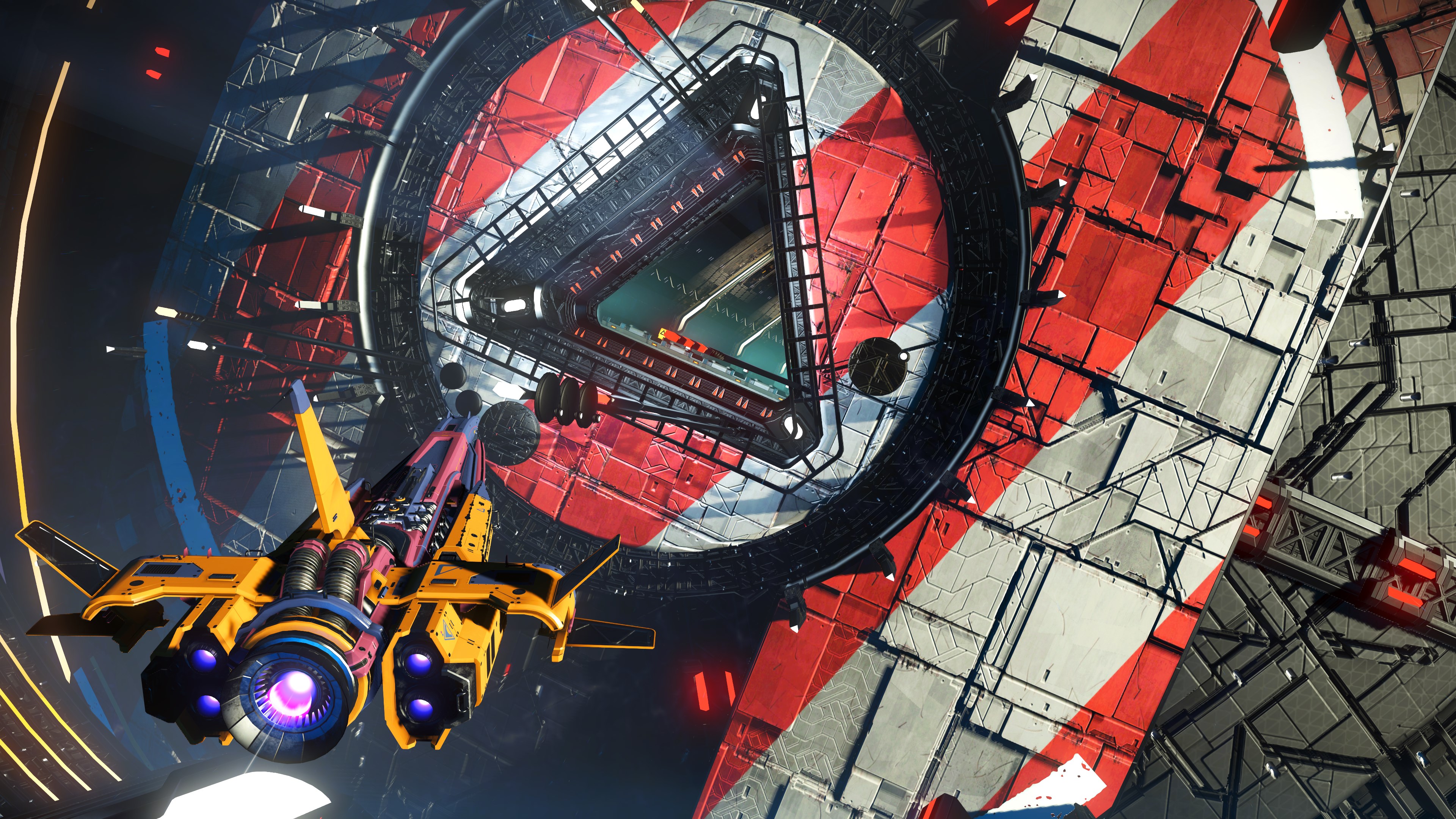 No Man’s Sky - nearly everything in this vast game is procedurally generated.
No Man’s Sky - nearly everything in this vast game is procedurally generated.
No Man’s Sky (2016) had a rocky start, but had somewhat of a legendary redemption arc over the past decade. Pitched with grand promises, it launched feeling empty and broken. Years of consistent, massive free updates have transformed it into a worthy space exploration and survival epic. You’re a traveler in a virtually infinite, procedurally generated universe: repair and upgrade your ship, jump between star systems, explore unique planets (each with its own flora, fauna, and hazards), mine resources, trade, build bases, and uncover the mysteries of the galaxy.
While procedural generation is the draw for many, I find oddly mashed together creatures or spaceships and massive randomly generated planets not as engaging - I like my content human-curated. Randomness is king here, I’ve spent the majority of my time with the game with a relatively basic multi-tool, but managed to bump into an S-tier (the highest tier there is) massive freighter ship very early into the game, which didn’t really feel earned. There are still engaging systems here - No Man’s Sky might be as deep as a puddle, but it really is as wide as the ocean and lets you live out your space fantasy.
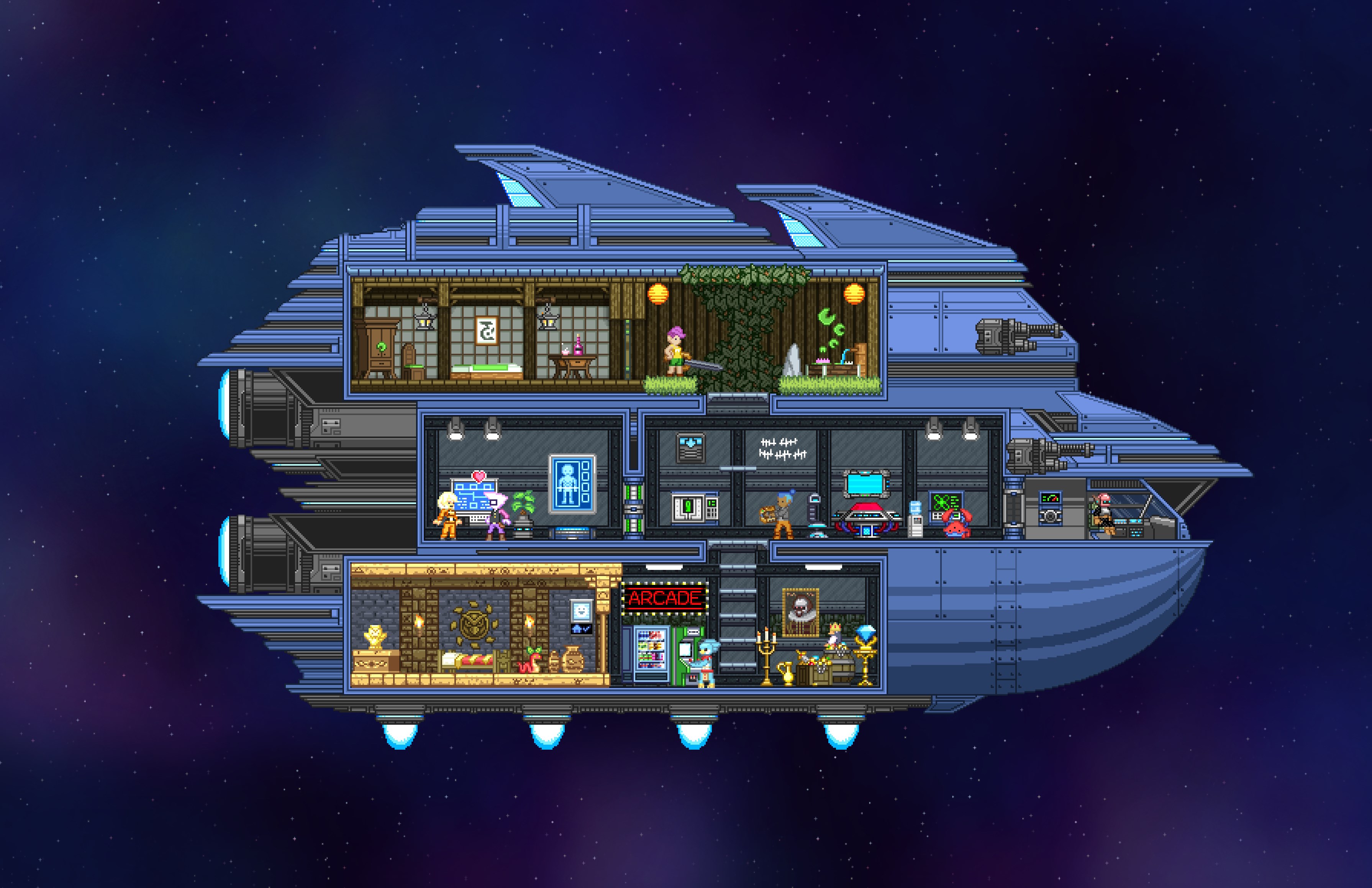 Starbound lets you expand and decorate your own space ship.
Starbound lets you expand and decorate your own space ship.
Starbound (2016) is a 2D, pixel-art take on the space sandbox genre, with a similar vibe to Terraria but with a strong sci-fi flavor and a more structured questline. While it has crafting, building, and survival elements akin to its inspirations, Starbound also features distinct playable races, customizable starships, and a main quest that guides you through sector after sector, culminating in boss fights. There are countless planets to explore, each with unique biomes, dungeons, and friendly or hostile inhabitants. It strikes a good balance between open-ended sandbox play and directed progression through its story missions and side quests.
I recommend playing Starbound with a must-have overhaul mod - Frackin’ Universe, which fleshes out many in-game mechanics, rebalances the game, introduces new equipment, new races, and new biomes. Even without mods though, it’s a jolly good time.
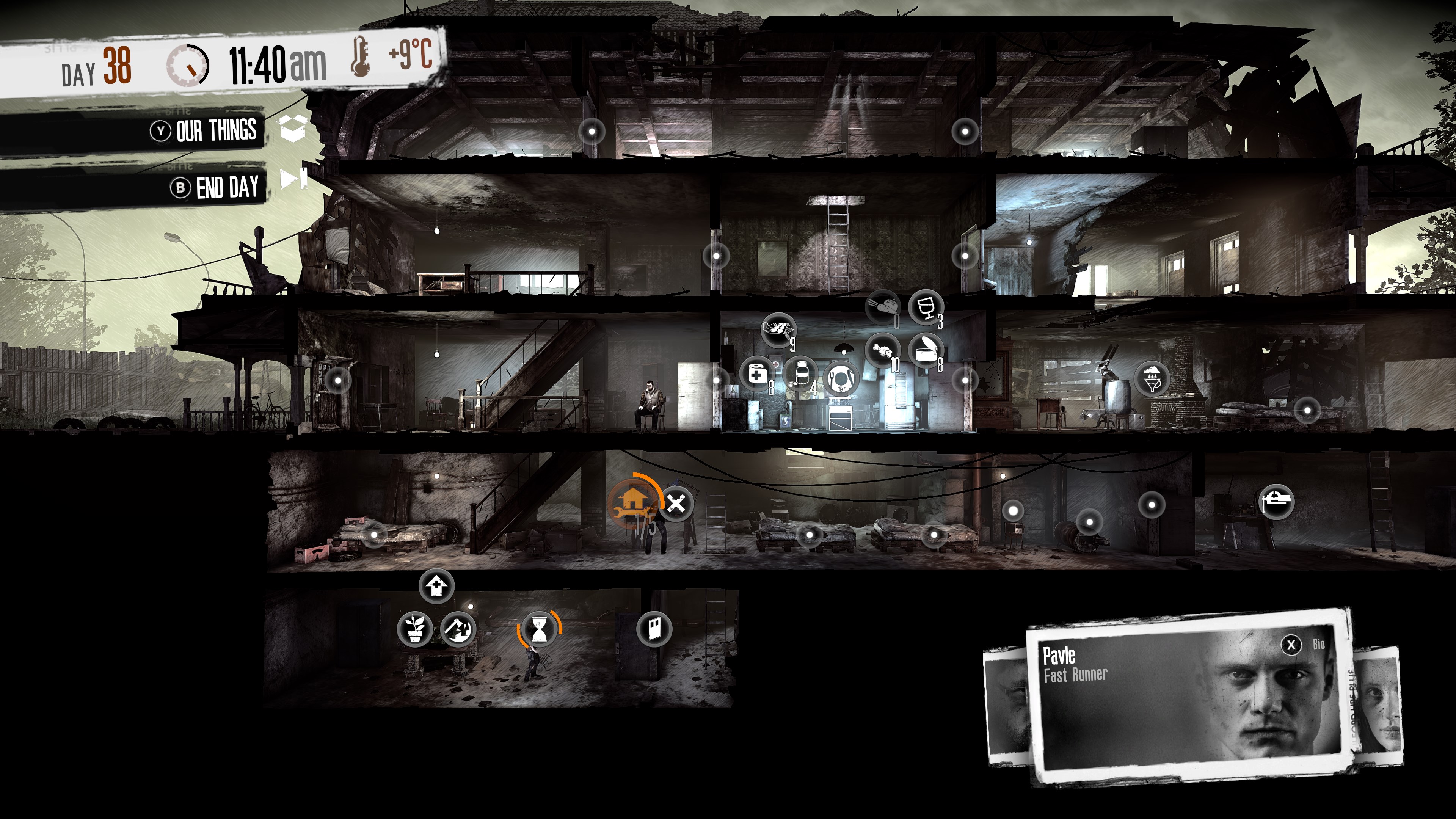 This War of Mine: Final Cut - dark, gritty, and depressing.
This War of Mine: Final Cut - dark, gritty, and depressing.
This War of Mine: Final Cut (2019) flips the script: instead of being a lone hero or a military operative, you’re managing a group of civilians trying to survive in a besieged city. It’s about scavenging for scraps in bombed-out buildings, making gut-wrenching moral choices (do you steal from the elderly couple next door?), and just trying to make it through another day. It’s grim, it’s emotionally heavy, and it’s a stark reminder that war isn’t just about soldiers. It’s a powerful experience, though definitely not a “cozy” one like some others on this list. Be warned.
If you haven’t played any of the survival games on this list, you owe it to yourself to pick up Minecraft. The freedom it offers is unparalleled, and you can truly have endless fun with the tools it gives you.
Action adventure
Onto action-adventure games. There’s a large selection - with many quality titles represented on PC Game Pass. I played a decent chunk of these, and want to talk about ones I haven’t yet played too. In no particular order:
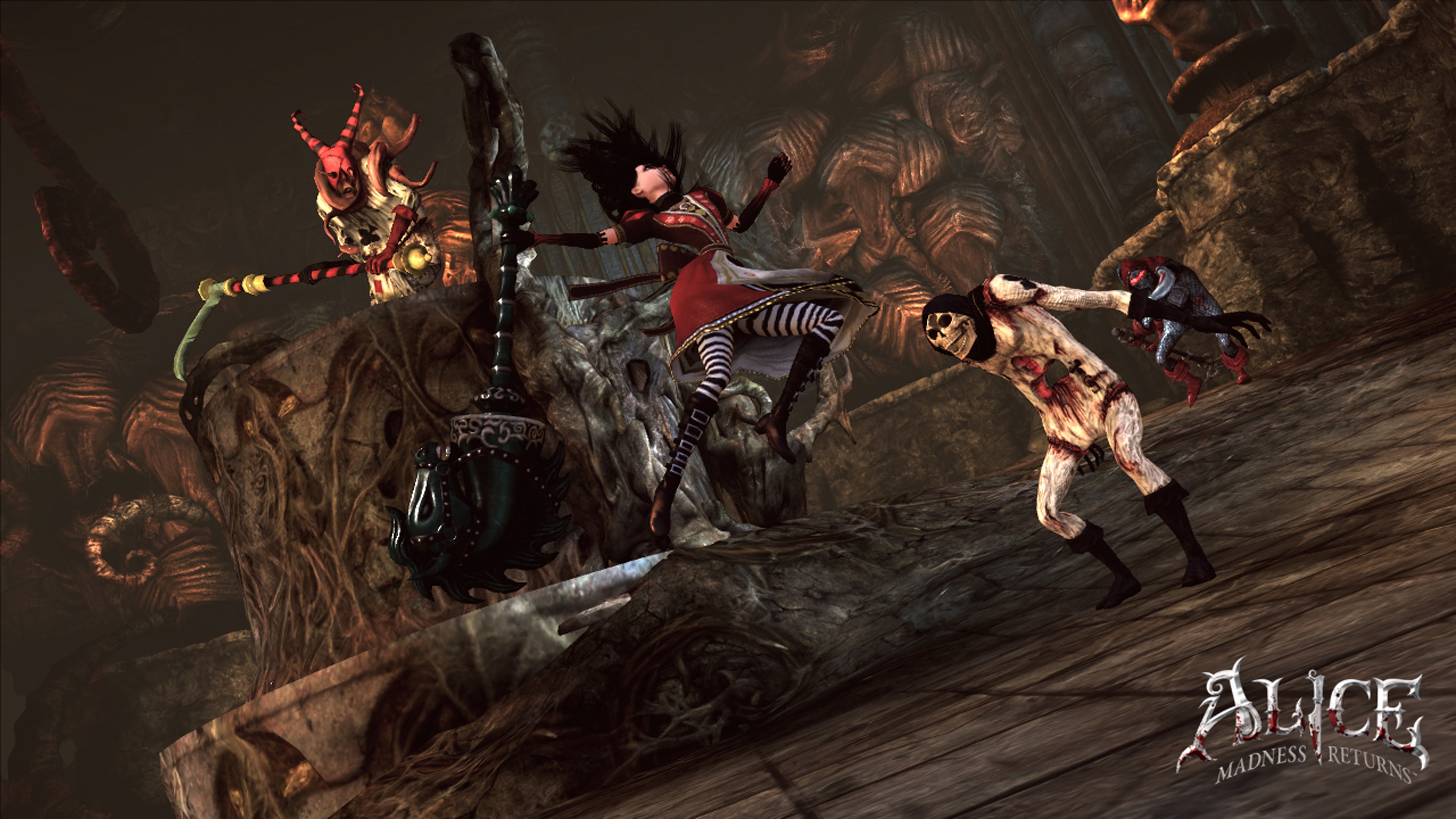 Alice: Madness Returns - I don’t know if that’s what Lewis Carroll had in mind when writing Alice in Wonderland.
Alice: Madness Returns - I don’t know if that’s what Lewis Carroll had in mind when writing Alice in Wonderland.
Alice: Madness Returns (2011) is a darkly imaginative action-adventure game with combat, platforming, puzzles, and a respectable amount of gore. It’s a darker twist on Lewis Carroll’s story: Alice is in a mental institution, and her adventures in Wonderland reflect her fragile mental state. It’s a delightfully weird, but also dark game - I mean Alice slashing denizens of Wonderland with a kitchen knife.
I used to be a huge fan of the Assassin’s Creed series starting back in 2007, with the release of the first game. It truly was revolutionary: Altair smoothly moving through crowds, parkouring his way through the city, and skillfully assassinating his targets. I even tolerated the neither-here-nor-there sci-fi elements the series insists on including. But a few games later - sometime after Assassin’s Creed 4: Black Flag, I lost interest in the series. It felt formulaic to the bone, moved towards essentially annual releases, and was more and more streamlined from entry to entry.
I haven’t meaningfully played Assassin’s Creed: Origins (2017) - it’s set in Ancient Egypt and introduces some RPG mechanics for the first time in Assassin’s Creed history. But I was just tired of the series by then.
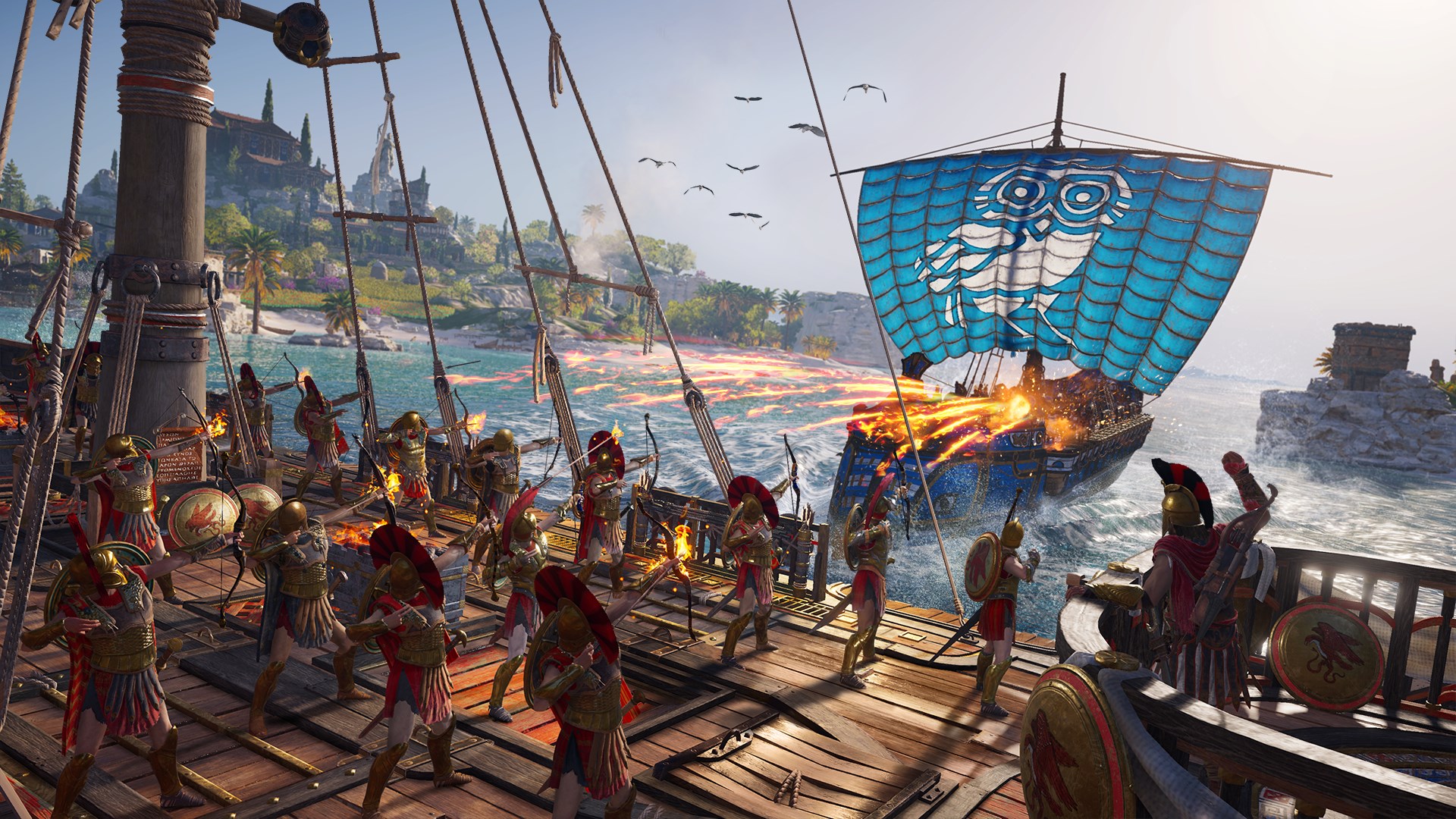 Assassin’s Creed: Odyssey - naval battles are often a spectacle; the sea shanties are included too.
Assassin’s Creed: Odyssey - naval battles are often a spectacle; the sea shanties are included too.
I did pick up Assassin’s Creed: Odyssey (2018) - set in ancient Greece, it offers a choice of a male and female protagonist, fleshes out RPG mechanics introduced in Origins, and implements ship combat much requested after Black Flag. What really helped is an option in the game to have some directions given in-game, slightly reducing the overabundance of map markers - which was really cool for a mainstream title to include, and what sold me on the title. I had fun, until I realized that I clocked in over 70 hours in the title and I wasn’t even halfway through - and it felt like I barely did less than half of the optional content presented to me so far. Yeah, for some the length of the game would have been a boon, but I prefer my epics to have a degree of focus - by then I was getting tired of the game’s systems and wanted to see something new or different - but it would’ve been another 70 hours of the same. No thanks, I’m okay.
After that experience, Assassin’s Creed Valhalla (2020) - a viking-themed sequel - posed no interest to me.
 Control revels in unnerving and unexplained phenomena.
Control revels in unnerving and unexplained phenomena.
Control (2020), on the other hand, was an amazing experience. A third-person shooter with a touch of the supernatural. The protagonist explores the Oldest House - an unassuming building in New York which houses the Federal Bureau of Control - a secret agency that deals with the paranormal. The thing is though, the Oldest House is much larger on the inside, and the rules of our world don’t exactly apply to it - it houses otherworldly entities masquerading as everyday objects: like a telephone that makes calls across realities, a gravity-altering TV, or even a refrigerator that must be watched at all times - without blinking - or something terrible will happen. If you’re familiar with the stories from the SCP Foundation, you’ll feel right at home. The gunplay and some supernatural powers are all there, but it’s the weird and unnerving objects and creatures that are the star of the show.
Grand Theft Auto V is one of the best-selling video games of all time, but, assuming unfamiliarity - it’s an open-world sandbox with a storyline centered around three characters: Michael - a retired middle-aged bank robber, Franklin - an ambitious young man mixed up in the wrong crowd, and of course Trevor - a volatile redneck drug dealer. You switch between characters depending on the mission (or at will between missions), and engaging bank robbing, street racing, cop shooting hilarity ensues. Grand Theft Auto gameplay always had the magic ability to devolve into chaos no matter what you do.
It’s got an online mode too, but between hacking and griefing - I wouldn’t recommend it.
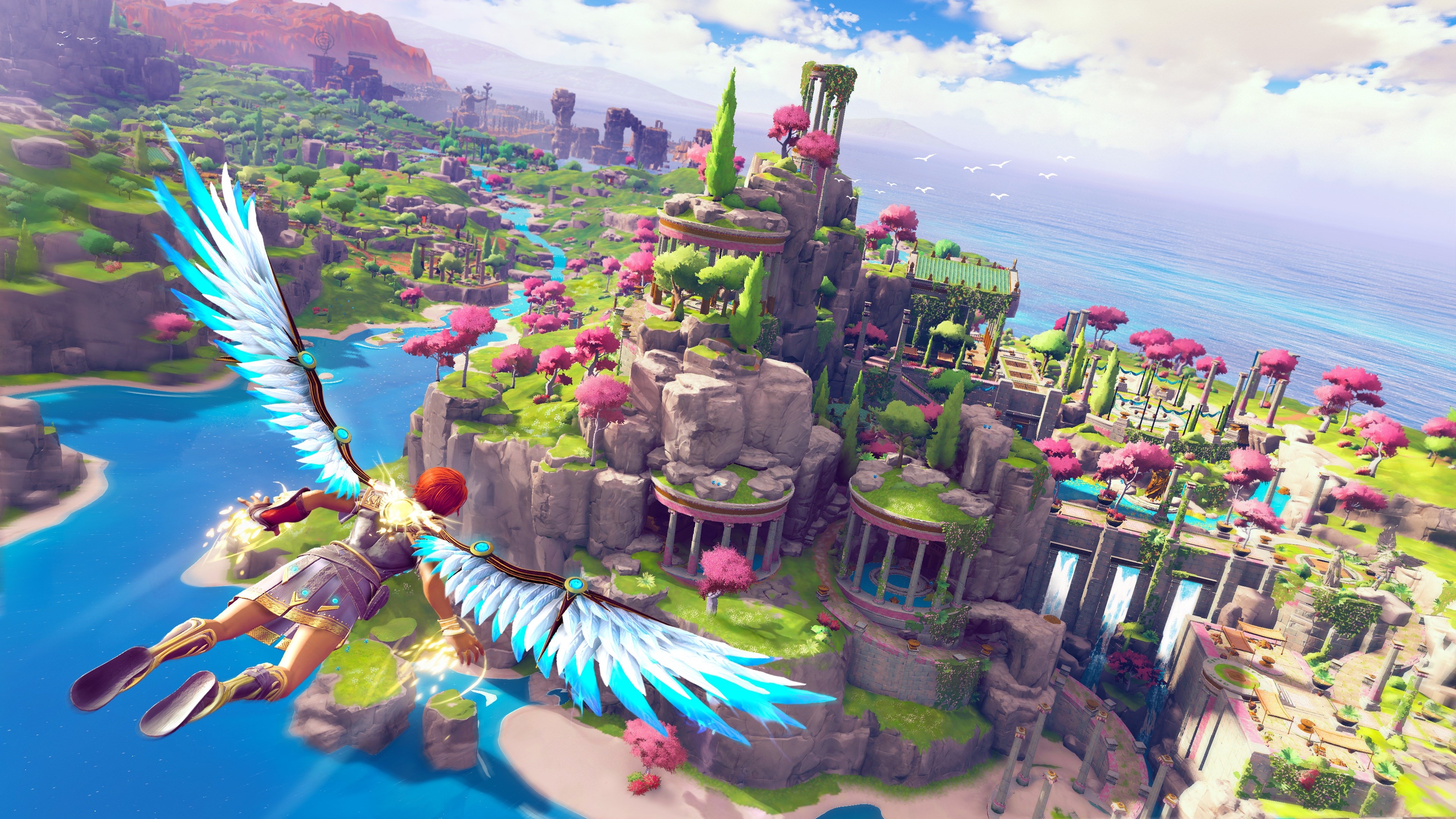 Immortals Fenyx Rising invited many comparisons to Legend of Zelda: Breath of the Wild.
Immortals Fenyx Rising invited many comparisons to Legend of Zelda: Breath of the Wild.
Immortals Fenyx Rising (2020) - originally titled Gods & Monsters - has you playing as a winged demigod on a quest to save the Greek gods from a curse. It’s got light puzzles, organic exploration (no map markers, yay), and arcade combat. It’s heavily inspired by Legend of Zelda: Breath of the Wild - I didn’t invest much time into the title as it felt too similar, but now that almost 9 years has passed since the release of Breath of the Wild, I might give Immortals Fenyx Rising another shot. It felt like a lovingly made game, despite being a Ubisoft title (yes, taste my vitriol).
I had fun with Journey to the Savage Planet (2020) - a vibrant first-person action-adventure game which has lots to say about corporations and consumerism as you explore an uncharted planet (for corporate gains, of course). The jokes are on the nose and the humor’s crude, but it all works together well. Progression is satisfying, exploration is engaging, and it’s fun to learn more about the planet as you progress. I haven’t finished this one because life got in the way - that’s a bummer.
A follow-up title, Revenge of the Savage Planet (2025) came out while I was writing this - so I haven’t played it yet. The reception is favorable, although I imagine a shift from first-person to third-person perspective can be jarring.
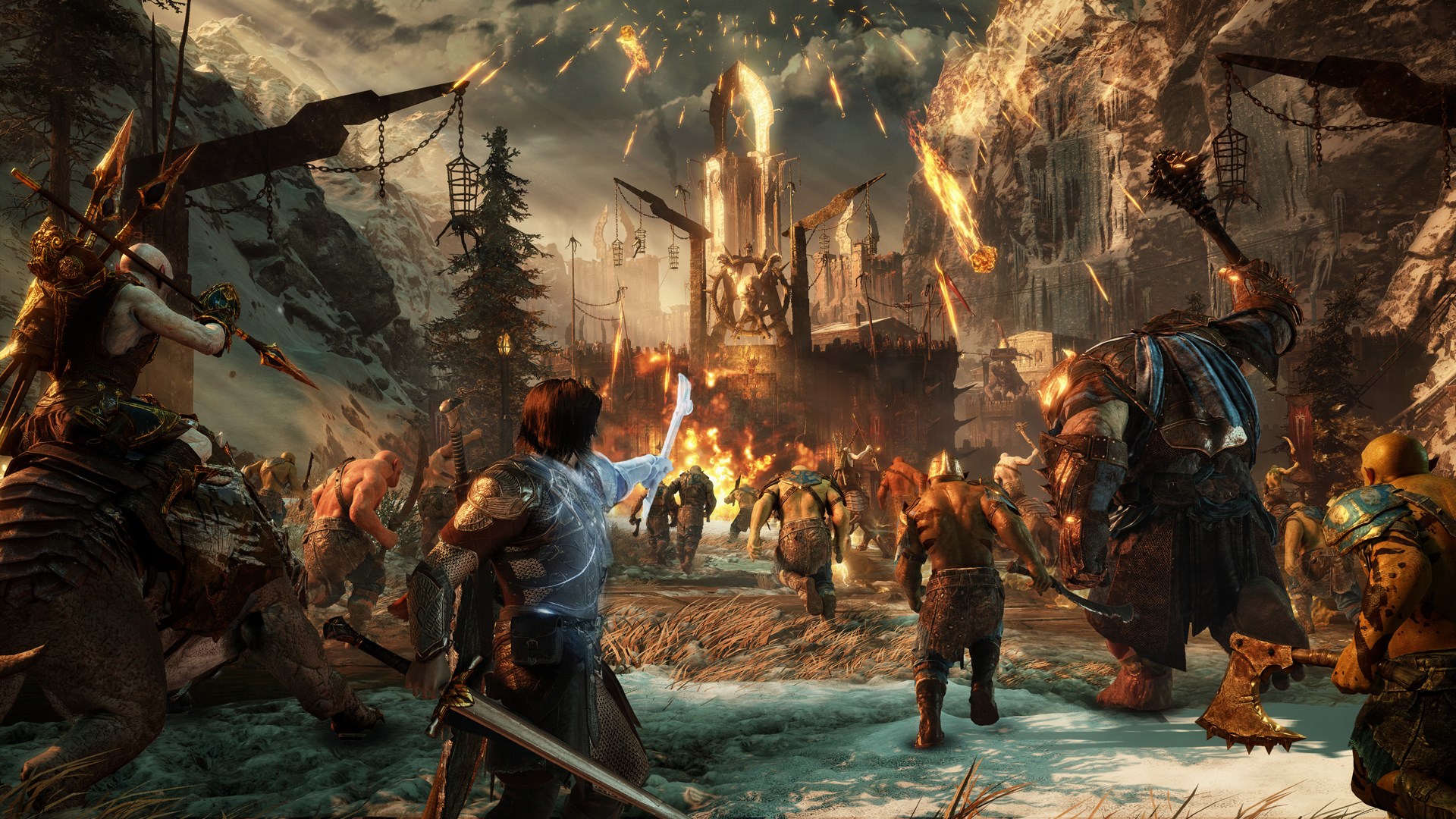 Middle-earth: Shadow of War - you even get to lead into battle hordes of mind controlled orcs.
Middle-earth: Shadow of War - you even get to lead into battle hordes of mind controlled orcs.
Middle-earth: Shadow of War (2017) - I enjoyed slashing my way through hordes of orcs, seamlessly switching between melee, ranged, and special abilities. The Nemesis system is the highlight of the game - orc warbosses you encounter each have unique traits and personalities, and will respond to your actions. Maybe you got killed by an orc boss, who got promoted for it and became stronger - he’ll taunt you now, and might chase you down for another kill. Or maybe you killed a particularly difficult foe, only to see him return time and time again - be it through sheer luck or necromancy - to be a constant thorn in your side. This is the second game in the series, but you don’t need to play the first to enjoy it.
I played The Saboteur (2009) back when it released, and I don’t remember too much about it other than the use of color: you’re a resistance fighter in Nazi-occupied Paris, and the occupied city blocks are black and white - with the city regaining color as resistance grows in strength. There’s stealth, combat, and some light parkour, although I’m not sure how well the game has aged.
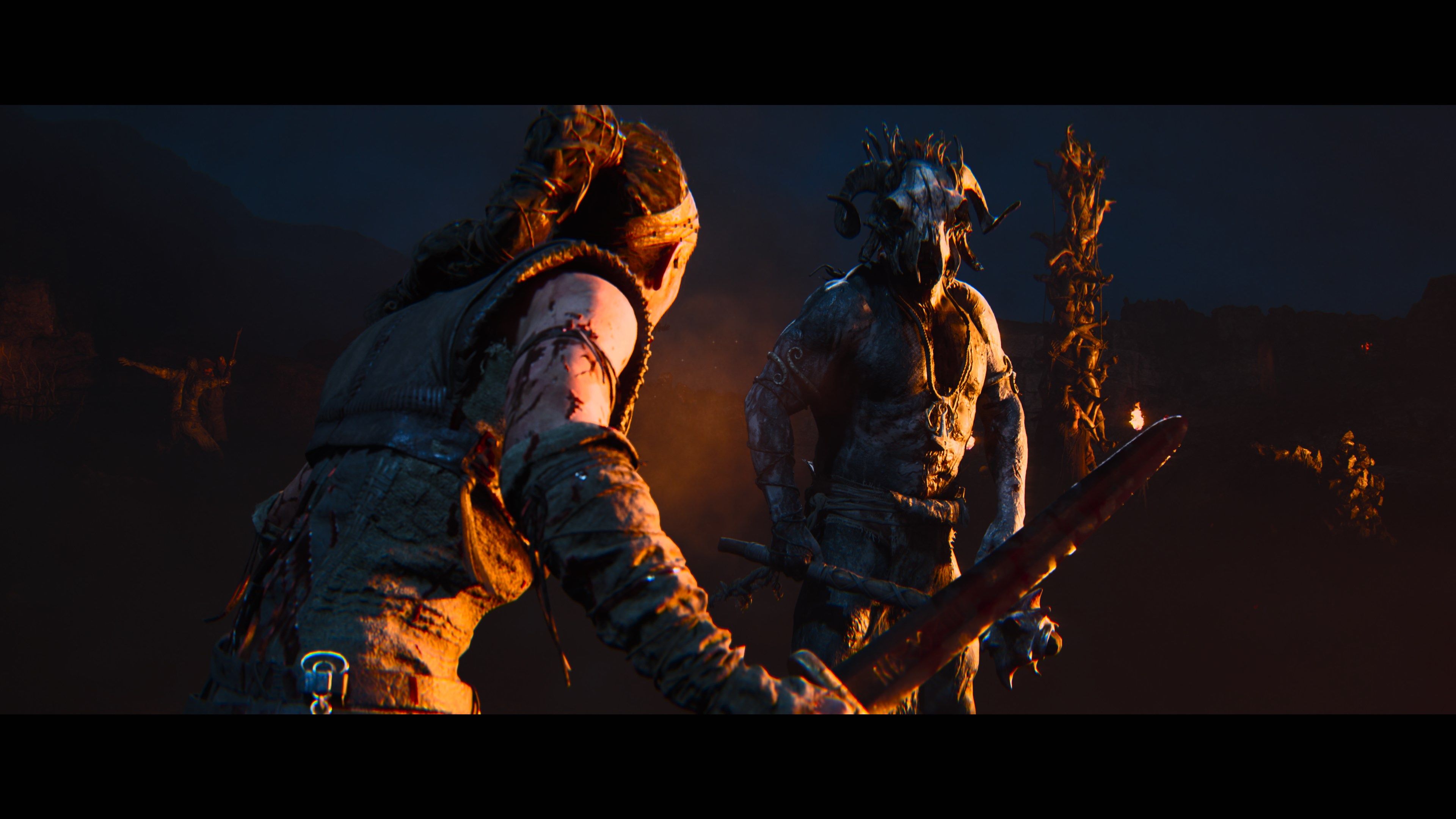 Senua’s Saga: Hellblade II, like it’s predecessors, looks incredible.
Senua’s Saga: Hellblade II, like it’s predecessors, looks incredible.
I’ll just go ahead and say that I didn’t like Hellblade: Senua’s Sacrifice (2017). It’s a beautiful action-adventure about Senua’s journey: haunted by voices, she is set on a quest to save the soul of her dead lover. The game is dark, gritty, and unsettling - and that’s by design. Senua’s fight against dark creatures and her communion with spirits is a metaphor for psychosis at a time mental illness was not understood. Maybe the depiction was too realistic for my sensibilities - I just didn’t enjoy my time with the title. A sequel I haven’t played - Senua’s Saga: Hellblade II - was released in 2024 to favorable reviews.
Despite my discomfort with the game, Hellblade: Senua’s Sacrifice felt like a true work of art, and it’s okay that it didn’t click with me. Voice acting and motion capture in particular are top-notch. I think it’s a love-it-or-hate-it title, and the only way to know is to play.
Tomb Raider (2014, remastered 2024) covers Lara Croft’s origin story: she has to fight for survival after being shipwrecked on a hostile island. Surprisingly brutal combat, linear but engaging exploration, with some tacked-on crafting and basic puzzles, and, naturally, tomb raiding. Although Lara does a lot more baddie and wildlife fighting than tomb raiding - the game is well-paced, and even has some emotional story bits.
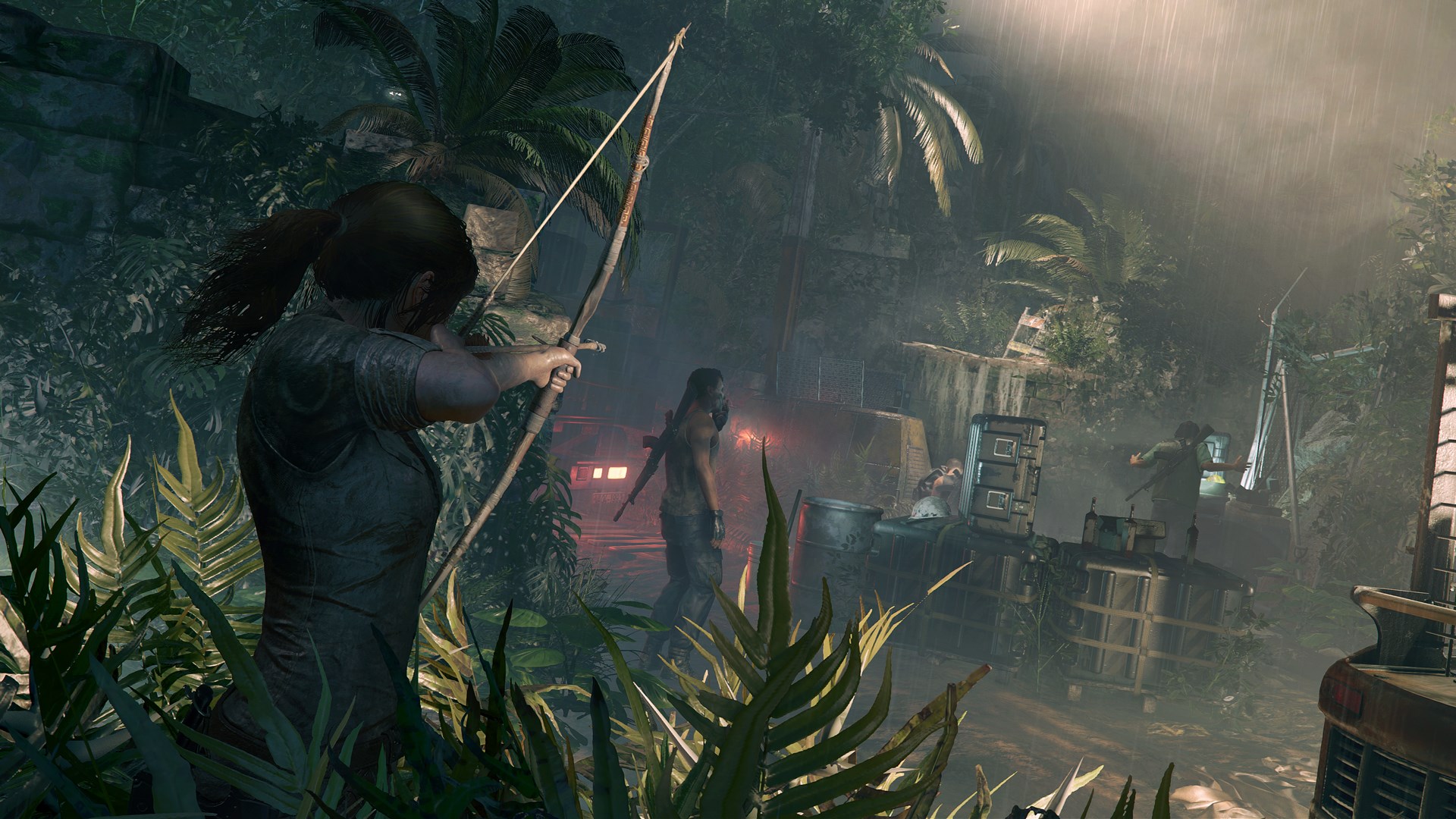 Shadow of the Tomb Raider - stealth gameplay and taking out enemy camps is a sizeable portion of the gameplay.
Shadow of the Tomb Raider - stealth gameplay and taking out enemy camps is a sizeable portion of the gameplay.
Oddly enough the second game (Rise of the Tomb Raider) isn’t on PC Game Pass, but the third - Shadow of the Tomb Raider (2018, remastered 2024) - is available. I wouldn’t skip the second game, so maybe just play through the first game, and if you like it - look for an opportunity to pick up Rise of the Tomb Raider elsewhere before proceeding to Shadow of the Tomb Raider.
Watch Dogs 2 (2016) is an action-adventure game set in a fictionalized San Francisco Bay Area, following a group of hackers fighting against the oppressive regime. You can “hack” passers-by’s cellphones, traffic lights, and even cars - lots of tools for causing mayhem. The tone of the game doesn’t sit well with the gameplay: the light-hearted and always joking freedom fighting DedSec in cutscenes are juxtaposed against gameplay - leaving them feeling more like a terrorist cell, racking up thousands of kills throughout the game, without any of it being acknowledged by the story.
Watch Dogs: Legion (2020) is set in a near-future London with a similar story premise, but it’s now all about recruiting people off the streets to be part of DedSec. The premise is cool - randomly generated characters have unique occupations, disguises, and talents: a construction worker can waltz into a construction site, a getaway driver might do well escaping the police, and a street performer can pretend to be a living statue… Yeah, it’s goofy - but it works. What doesn’t work is that for me the gimmick wore off somewhat quickly - there are only so many occupations that matter gameplay-wise, and without preset characters, the story feels flat.
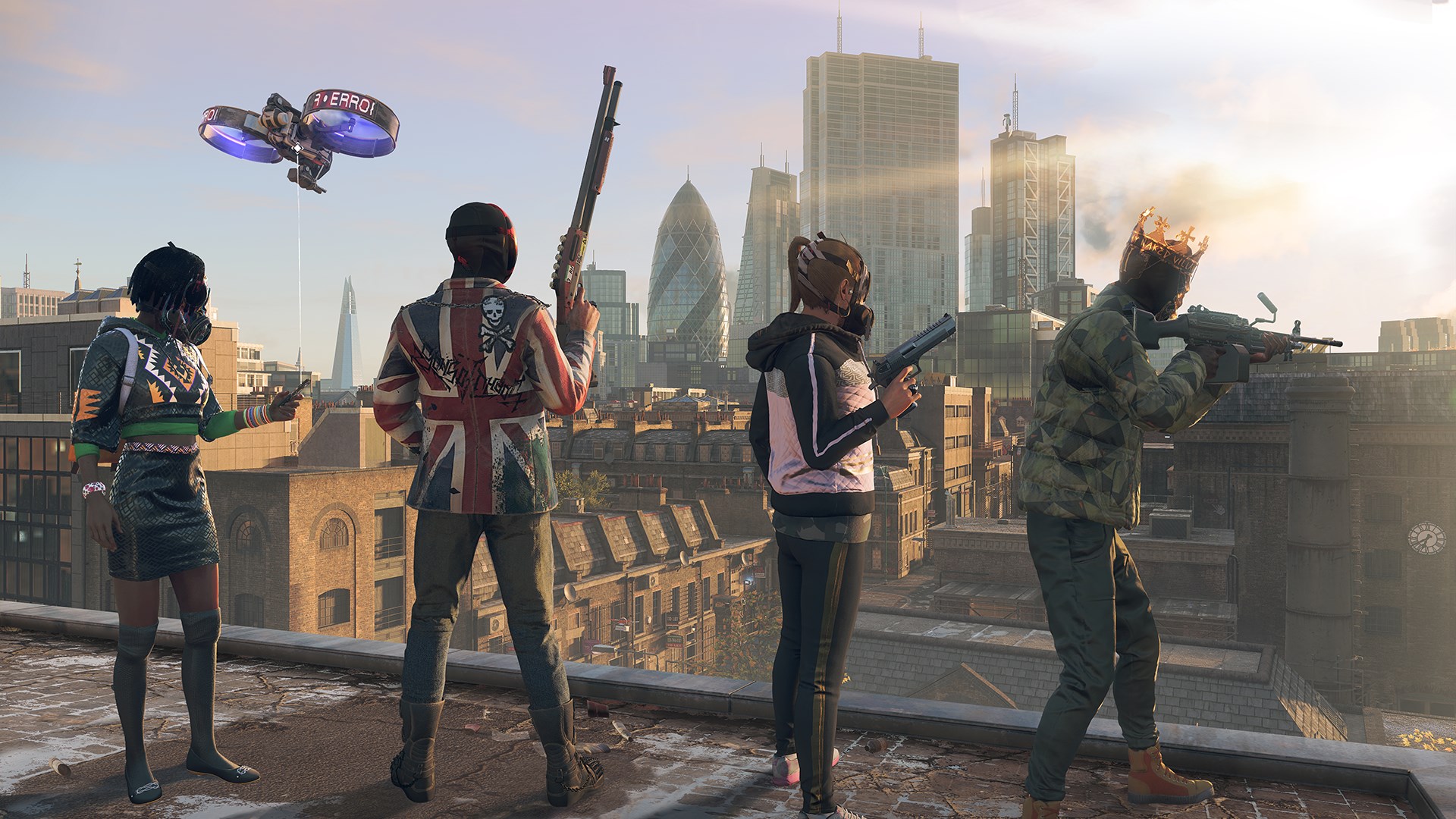 Watch Dogs: Legion - let the mayhem commense.
Watch Dogs: Legion - let the mayhem commense.
Watch Dogs: Legion really exposes how much I don’t love procedural generation. Well, I enjoy it in titles like Dwarf Fortress or Minecraft, but that’s like saying you don’t mind RPGs because you played Baldur’s Gate III - you’re looking at the best of the best, and it’s all downhill from there. Randomly generated NPCs in Watch Dogs: Legion are missing an oomph. They might have jobs, schedules, and friends - but it’s all surface level, and there’s not a lot of depth to the system.
To continue being a Negative Nelly, I preferred the first game (which, again, is not on PC Game Pass) - although, again, I had a very difficult time getting over the dissonance between the heartfelt vigilante protagonist you see in cutscenes and the mayhem with absolute disregard for human life that is the game. This is like when Avatar: The Last Airbender’s Aang says “I’ve never killed anyone” after we’ve seen the death toll clock in the hundreds throughout the series. But I guess off-screen deaths don’t count?
There are also two games I haven’t played yet, but I’d like to pick up - I’ve heard great things about them. These are:
- Indiana Jones and the Great Circle (2024) - seems to be a first-person action-adventure filled with exploration, whip-slinging, stealth, and puzzles. Reviews note that it captures the feel of the original Indiana Jones movies, which sounds cool.
- Mafia (2020) - I’ve played the 2002 original, and I’ve been looking forward to picking up the remake. The graphics look nice, the story’s expanded, and driving and combat are modernized. Can’t wait to play through.
These are all very different games I shoved under the “action-adventure” umbrella, so it’s particularly hard to narrow down and recommend only a few. So I won’t.
First person shooters
I don’t have a trove of experience with first-person shooters - PC Game Pass is filled to the brim with popular offerings, but I’m not a helpful reviewer here. I wish I could give a helpful recommendation for classic series like Battlefield, Call of Duty, Medal of Honor, Halo, Doom, Quake, Sniper Elite, or Wolfenstein - but I don’t know enough to share. In the 2000s I played and loved some of the (now) older entries in Wolfenstein, Medal of Honor, and Call of Duty - but I don’t recall much besides the fuzzy feelings of nostalgia. I’d love to recommend Return to Castle Wolfenstein or Medal of Honor: Allied Assault, but I tried booting these up - and these didn’t age well, even through the prism of nostalgia.
I did play Doom Eternal, but didn’t finish it, I don’t recall why. I finished Wolfenstein: The New Order, but I remember nothing about it. All that to say, I clearly turn off my brain when playing shooters - which probably is the point.
Now, onto the games I have at least a few things to say about.
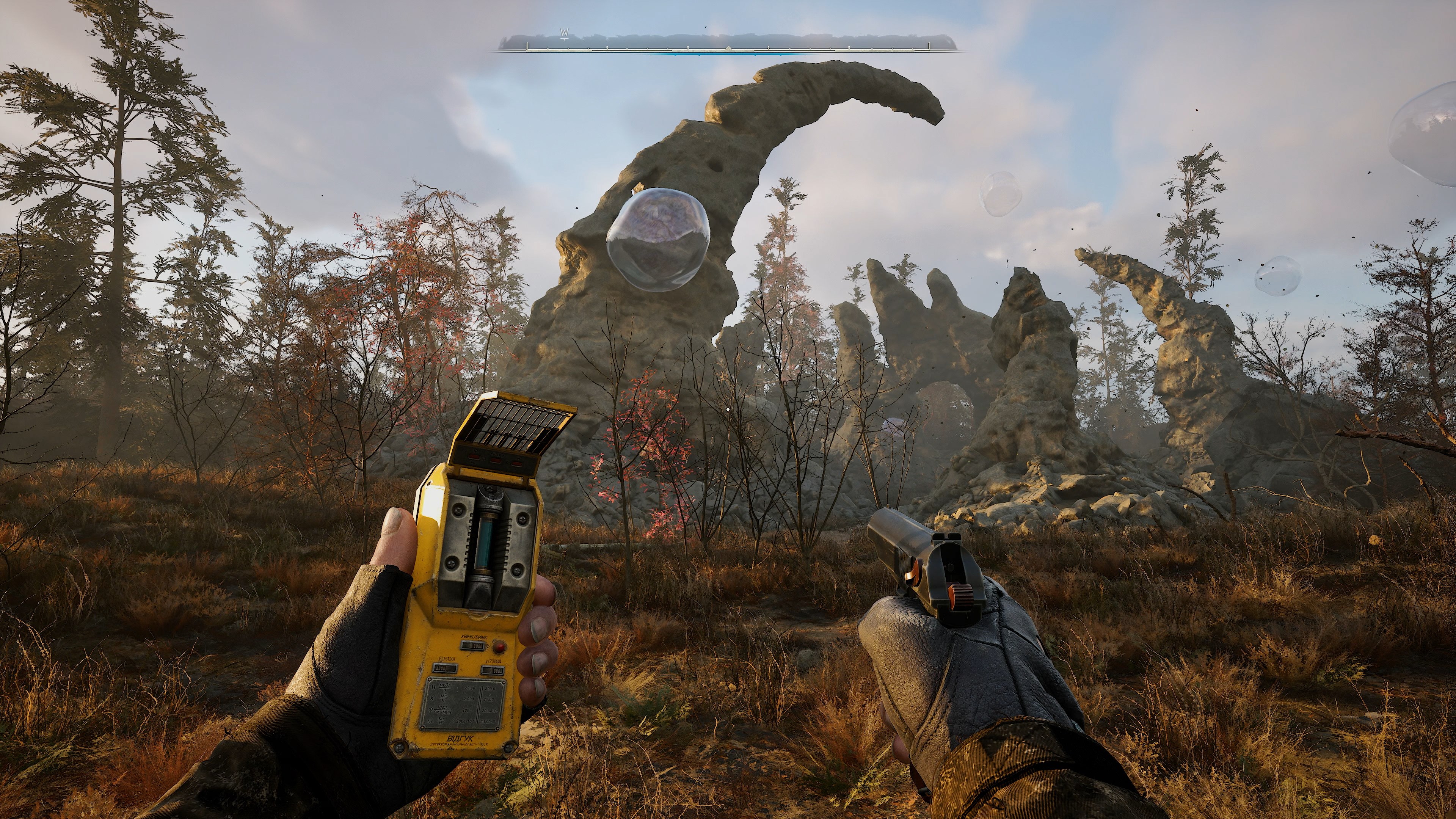 S.T.A.L.K.E.R. 2: Heart of Chernobyl - trusty anomaly detector in hand, ready to scavenge for artifacts.
S.T.A.L.K.E.R. 2: Heart of Chernobyl - trusty anomaly detector in hand, ready to scavenge for artifacts.
S.T.A.L.K.E.R. 2: Heart of Chernobyl (2024) is one of the key reasons I picked up PC Game Pass. I was intrigued but cautious about buying the title: reviews indicated major performance issues. It seems to run well on my NVIDIA GeForce RTX 4080, but I’m glad I was able to try the title on PC Game Pass.
If you’re not familiar with the premise, S.T.A.L.K.E.R. is set around the Chernobyl exclusion zone - it’s a hugely atmospheric depiction of a post-nuclear disaster in a Soviet country. Creative liberties taken, of course: you wander the zone armed to the teeth, fight off mutants, bandits, and military, and navigate your way around anomalies to scavenge otherworldly artifacts. The game can be quite scary at times too, especially as you dive into yet another bunker clearly inhabited by something terrifying and dangerous. Or you can ignore all that, sit at a campfire with fellow stalkers listening to guitar music and drinking vodka. You do you, boo.
I haven’t finished my playthrough yet, but it’s a worthy sequel - it’s been long enough since the release of the first three games (naturally, number 2 indicates that this is the fourth game in the series), and while the sequel doesn’t do anything groundbreaking - it looks amazing, the old formula still works well, and the game’s a lot less janky compared to its predecessors.
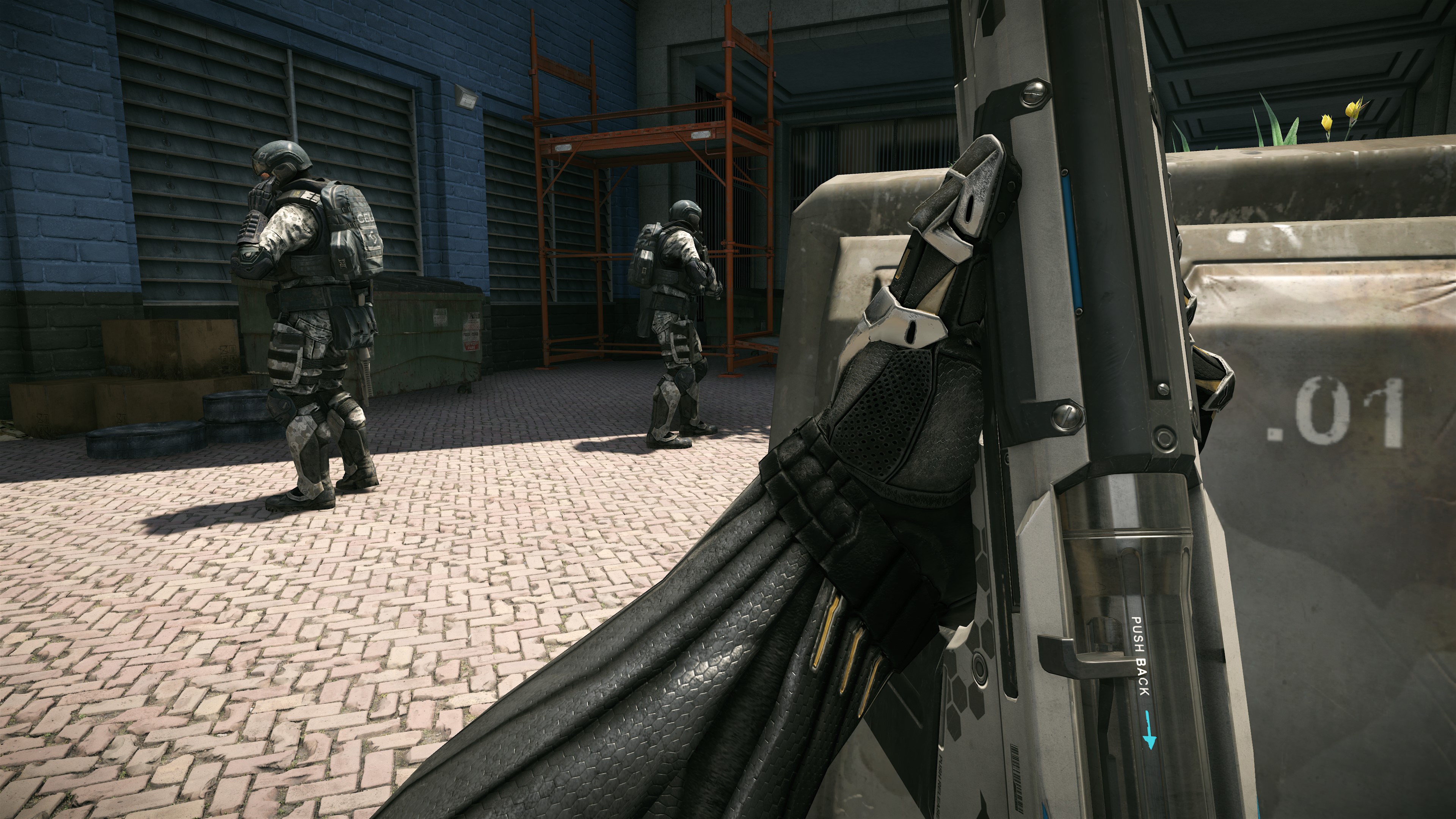 Crysis Remastered Trilogy - These goons won’t know what hit them.
Crysis Remastered Trilogy - These goons won’t know what hit them.
I did love the Crysis Trilogy. Outside of being a graphical wonder in 2007 (which still holds up today - even more so after the 2021 remaster), the shooting’s fun, and the nanosuit is what makes all the difference. Being able to become stronger, faster, tougher, or even turn invisible opens up so many tactical options, and feels fresh. I enjoyed the first game more than the sequels, but I think I played through the whole series back when it came out. If Crysis came out today, it’d take you the whole game to unlock your suit powers bit by bit. Oh no - you’re at full power from the get-go, and that’s because it’s a damn solid game even without any progression systems. Can you tell I’m annoyed by shoehorned progression systems?
As an aside, my personal favorite is Crysis: Warhead - which, unfortunately, isn’t on PC Game Pass - that’s a bit of a loss.
PC Game Pass offers Overwatch 2 (2022) - a multiplayer hero-based team shooter. I don’t have a burning hatred for many games on this list, but Overwatch 2 is one of them. Here’s the deal - there was a period of my life when I really got into Overwatch. The colorful larger-than-life characters and classic Blizzard animated shorts drew me in. I wasn’t close to being good, mind you - in fact I was stuck on the border of silver and gold elo the whole time, but I did sink close to 500 hours into the title over a couple of years - and, outside of occasional pockets of toxicity, I had a great time doing it. I even got excited and watched the Overwatch League when it was first announced - and that’s a first for me, I wouldn’t really call myself an e-sports fan.
Imagine my frustration with Blizzard after Overwatch 2 essentially tried to sell me half the game I already paid for multiple times over (yes, I even bought the lootboxes - that’s how deep I was in it, something that feels ridiculous to say out loud - I haven’t bothered with lootboxes before or after playing Overwatch). It just felt like a lazy cash grab, and, to kick you while you’re down, Blizzard shut down the first Overwatch. So, did I play Overwatch 2? No, I didn’t. Do I feel like I have the right to tell people it sucks? Yes, I do.
I think with the mass appeal of the first-person shooter genre, we’re getting into the territory of gaming controversies and things I don’t like about the industry as a whole.
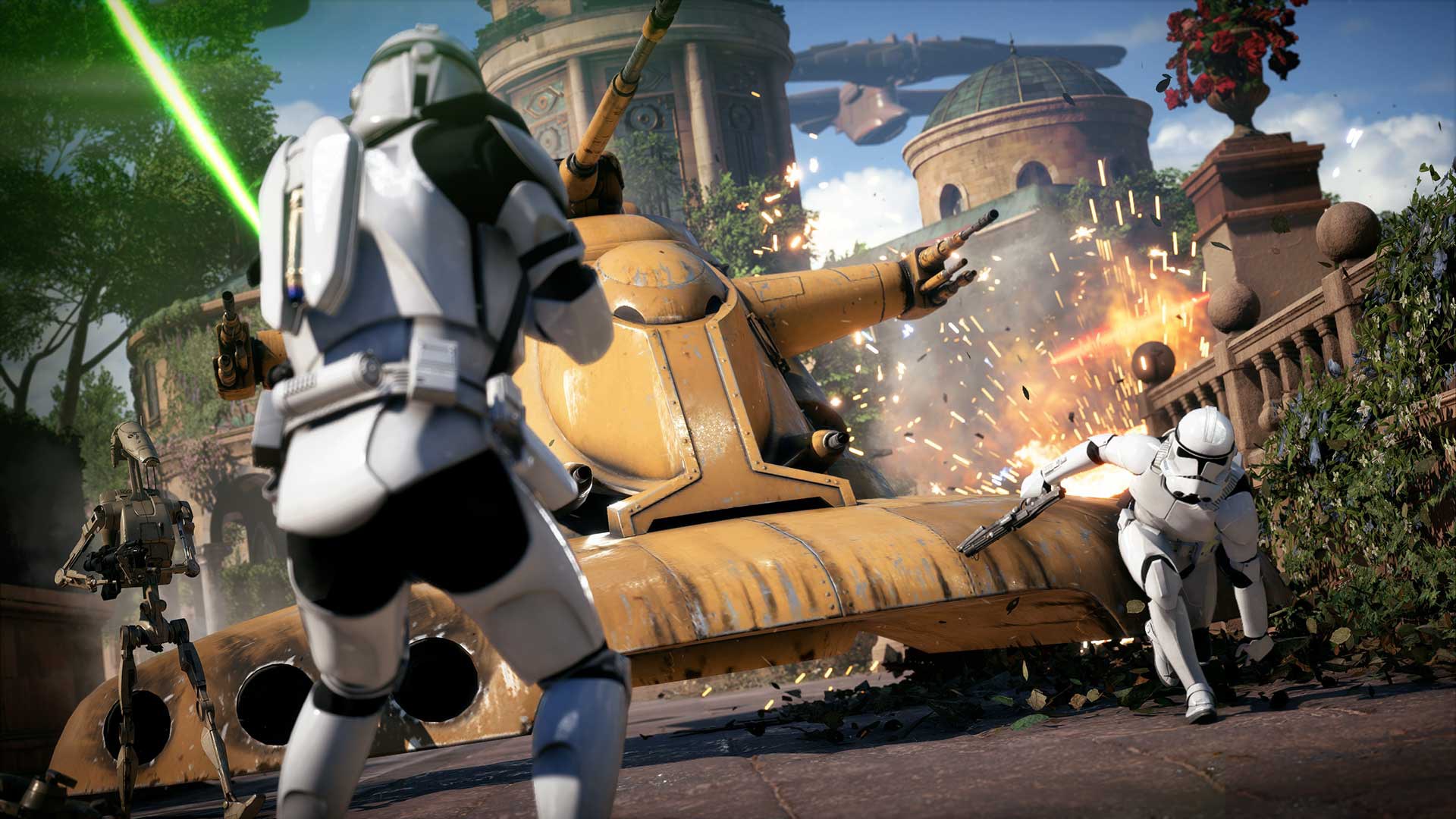 Star Wars Battlefront II - it’s hard to be a stormtrooper.
Star Wars Battlefront II - it’s hard to be a stormtrooper.
Let’s take Star Wars Battlefront (2015) and Star Wars Battlefront II (2019) with their massively multiplayer battles. By the way, these are technically the third and fourth entries in the franchise respectively. Isn’t game numbering fun? Maybe they don’t teach you to count that high in game design school. I grew up playing the first two games back in the mid-2000s - entirely offline, and I had the time of my life doing it. And then I got to witness the disaster that was the release of the latest installment Star Wars Battlefront. A big middle finger from EA executives, with their pay-to-win mechanics (these aren’t even microtransactions - that’s a full purchase within a game). With costs of $20-40 per hero like Luke Skywalker or Darth Vader. Or you can grind for 40 hours to unlock a new hero. And there are over 20 heroes, in a multiplayer game where heroes dominate the battlefield and easily swing the tide of battle.
After years of fine-tuning the in-game unlocks, Battlefront actually feels fine to play - the gameplay’s engaging, progression doesn’t feel punishing, and microtransactions are easy to ignore. But I just have a hard time forgetting how EA did us dirty at release because they thought they could get away with it. And guess what - they did win. Despite the initial backlash, Star Wars Battlefront has seen strong long-term performance - I didn’t comb through EA earnings reports, but some information from 2019 hints at over 30 million copies sold - and that’s six years ago. Greed pays, apparently.
Since I haven’t played many important titles here, I don’t think I can make a meaningful recommendation for one or two must-play titles - I’d say you should pick up S.T.A.L.K.E.R. 2: Heart of Chernobyl (2024), but that’s probably recency bias and my love for the franchise talking. So I’d say if there’s only one first-person shooter you can play - pick up Crysis Remastered Trilogy (2021). I liked it.
Horror
I played the original Resident Evil 2 back at my uncle’s house on a PlayStation 1. I was quite frankly too afraid to play by myself, and I wasn’t good enough to make it past the first couple of levels. I mean it’s a scary game - you have zombies, some body horror, tense cramped spaces, and generally a heavy atmosphere. Your ammo is always running out, you barely have enough healing items, and the enemies only get tougher as you progress through the game. Oh, and you have to juggle fending off zombies and solving puzzles to progress. Raccoon City is the epicenter of the zombie outbreak, and you’re right in the middle of it all.
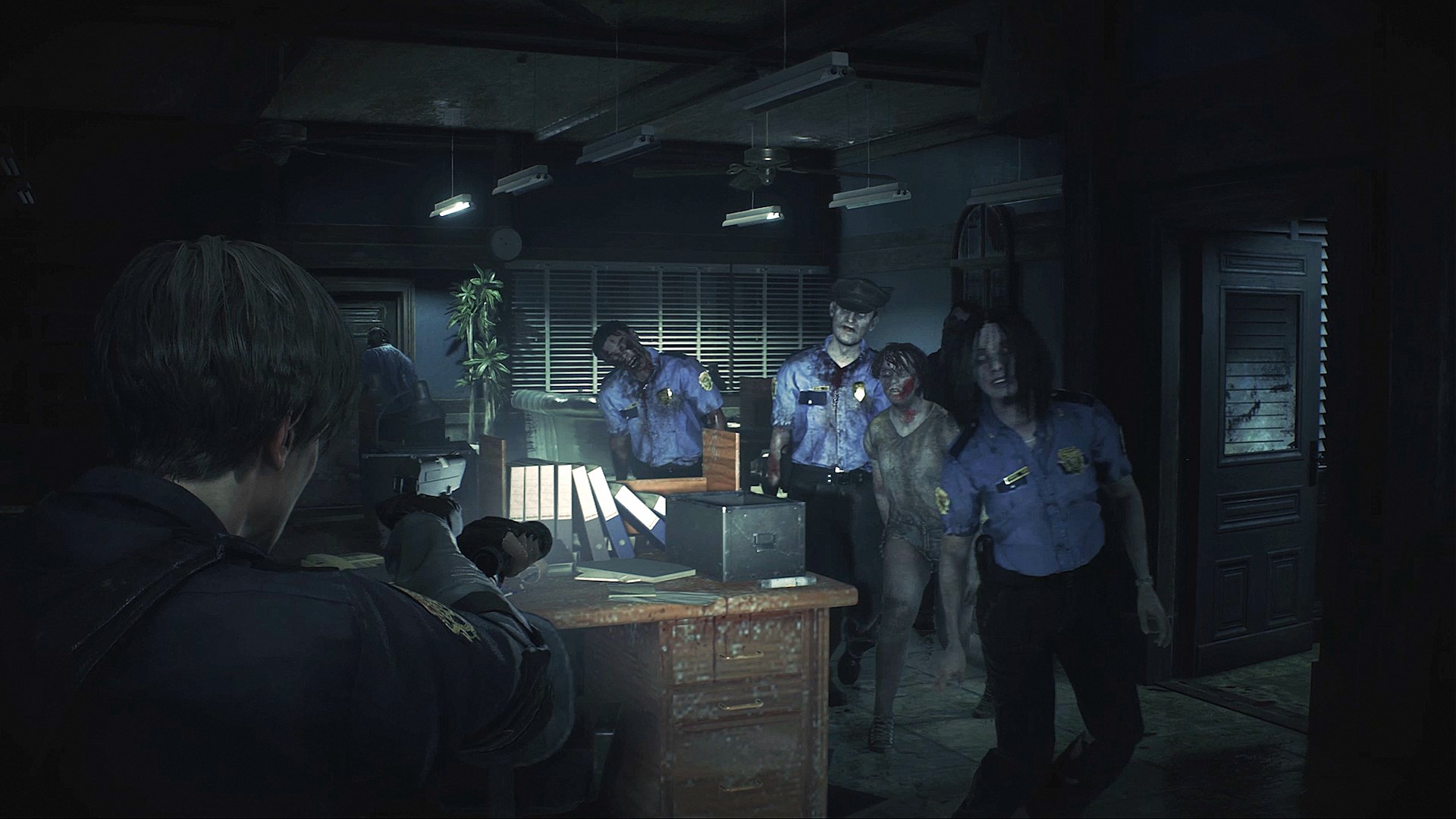 Resident Evil 2 (2019) - welcome to Raccoon city.
Resident Evil 2 (2019) - welcome to Raccoon city.
The Resident Evil 2 (2019) remake is what the original would’ve been if not for technological limitations of 1998. It ditches the fixed camera in favor of a modern over-the-shoulder perspective. Tank-like character controls get improved, but the enemy aggressiveness is dialed up to match. That’s what it felt like to play this game twenty years ago, and the remasters have done a great job at that. It plays great regardless of you having experienced the original. PC Game Pass also includes Resident Evil 3 (2023), but I haven’t played it yet - I’ve added it to my backlog since the game’s on PC Game Pass.
It’s a bummer that PC Game Pass doesn’t include Resident Evil 4 (2023), which is widely recognized as one of the best games in the series, and the remake is just incredible. Oh well.
The Dead Space series is another third-person action horror game. More combat-oriented than the Resident Evil games, the game pits you against necromorphs - zombies, really - mindless, but fast, dangerous, and brutal, with elongated bones and serrated blades for hands. And you can dismember the creatures as they rush at you, and they’ll continue crawling trying to reach Isaac - the protagonist of the game. All while Isaac’s slowly becomes more and more mentally unstable over the course of three games.
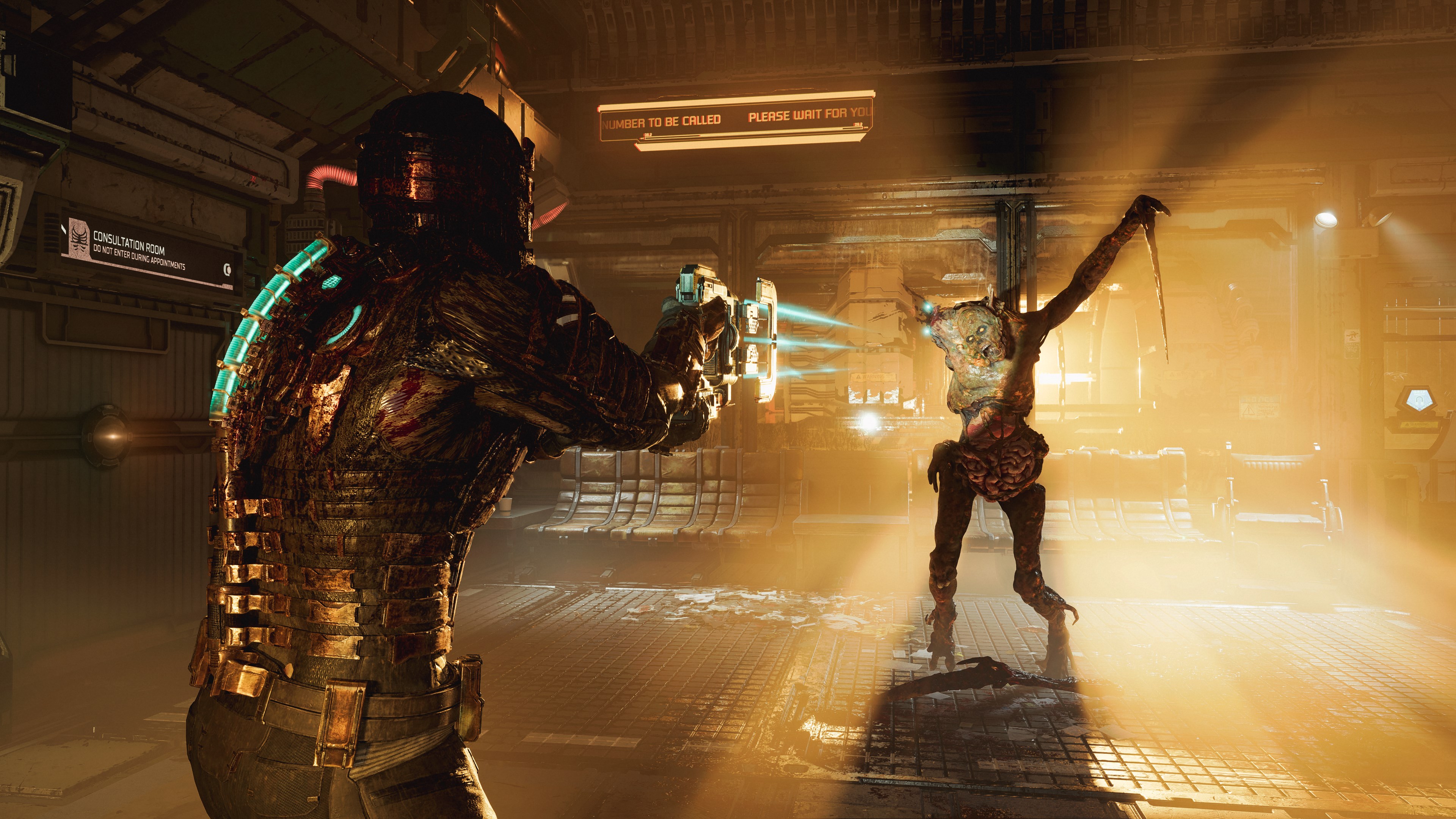 Dead Space (2023): necromorphs are terrifying, even with some limbs missing.
Dead Space (2023): necromorphs are terrifying, even with some limbs missing.
It’s the first game I’ve experienced with a completely in-universe heads-up display: the health bar is part of the protagonist’s suit, your inventory is projected from a holographic device, and your ammo counters pop up straight from the weapons. Oh, and since the main character is an engineer - all the weapons are sci-fi tools of the engineering trade.
Dead Space (2023) is a remake of the original Dead Space, but I don’t believe it met sales expectations and Dead Space 2 (2011) and Dead Space 3 (2013) will not be getting a remake. I think the latter two games are beginning to show their age, and I think the first Dead Space remake is the way to go.
If you were to pick one game from each major horror series, I’d strongly recommend picking up two remakes - Resident Evil 2 (2019) for its pacing, tension, and balance of puzzles and combat, and Dead Space (2023), for its scary monsters and nail-biting combat.
Space and driving sims
We’ll continue a trend of increasingly loose genre categories. This is a bucket for piloting space ships and driving trucks through the mud.
That’s where I would put Microsoft Flight Simulator if I played it, but I didn’t, so I won’t. I do like my space sims though, I even have an entry-level HOTAS - a throttle and a joystick I mostly use for occasional Elite Dangerous sessions.
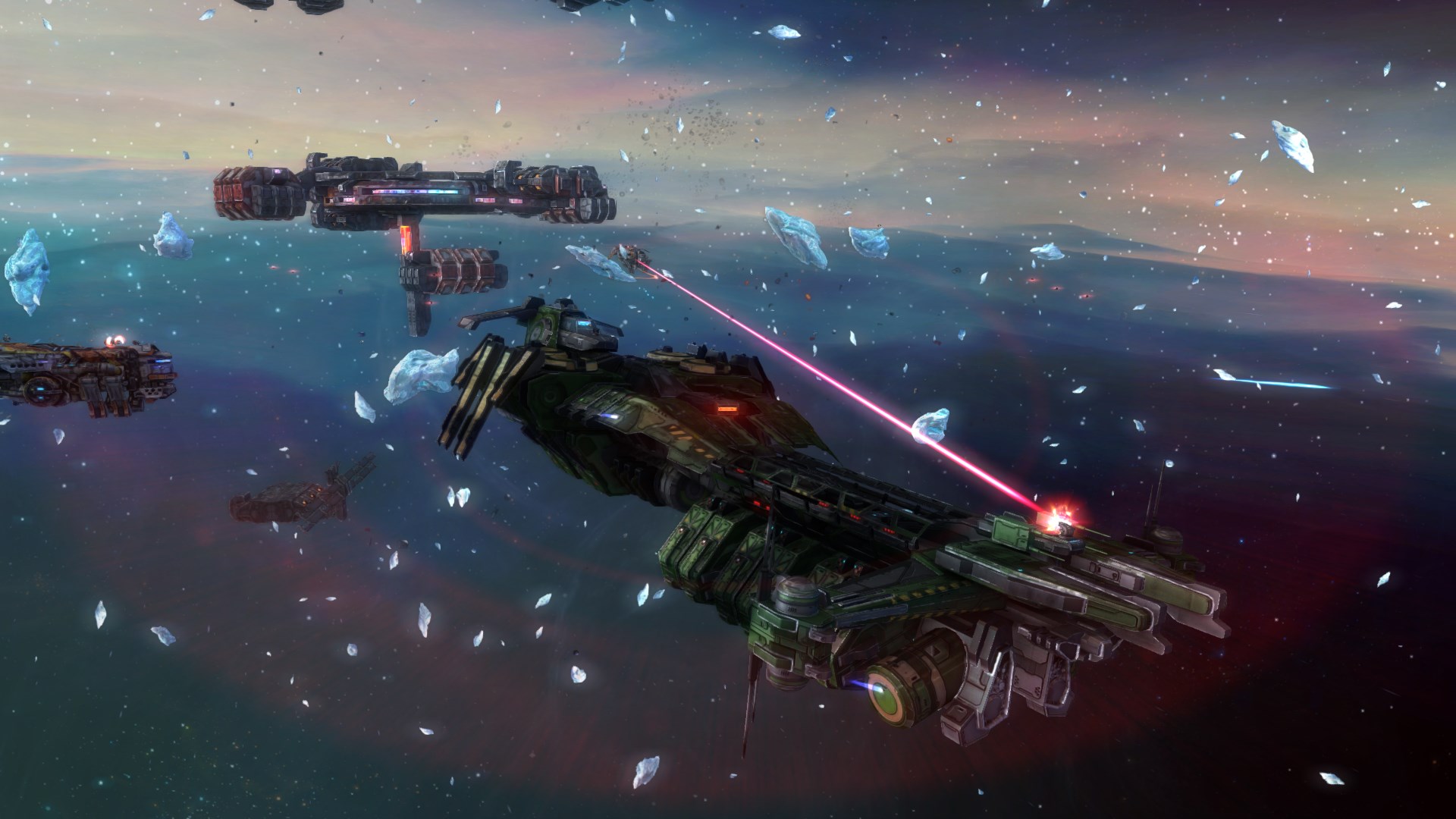 Rebel Galaxy - these are more of naval battles in space than the dogfights you might expect.
Rebel Galaxy - these are more of naval battles in space than the dogfights you might expect.
Rebel Galaxy (2015) is an arcadey space sim dripping with Americana vibe - it’s like setting a foot on a set of Firefly. If you ever drove across the United States and interacted with vibrant gas stations and rest areas common throughout the Eisenhower Interstate System - you’ll be hit by waves of nostalgia. If you haven’t - that’s okay too, I’m sure you’ve seen older American films - and you’ll feel right at home without stepping a foot in these spaces.
The movement is limited to a 2D plane, which simplifies the combat quite a bit (closely mimicking naval combat with its reliance on broadside cannons). It’s a highly atmospheric title focused on combat, exploration, and trade throughout a largely lawless space sector. Its sequel, Rebel Galaxy: Outlaw, ditches the 2D plane in favor of freeform movement, which I enjoyed much better. As seems to be the theme though, the sequel isn’t on PC Game Pass.
SnowRunner (2020) is a slow and methodical driving game focused on navigating difficult terrain: trailblaze a path through dirt, mud, and snow, and then follow that path with increasingly heavy machinery as you deliver construction goods from point A to point B. It’s a relaxing slow-paced game which puts you in the zone - perfect for decompressing after a particularly stressful day or listening to an audiobook while gaming.
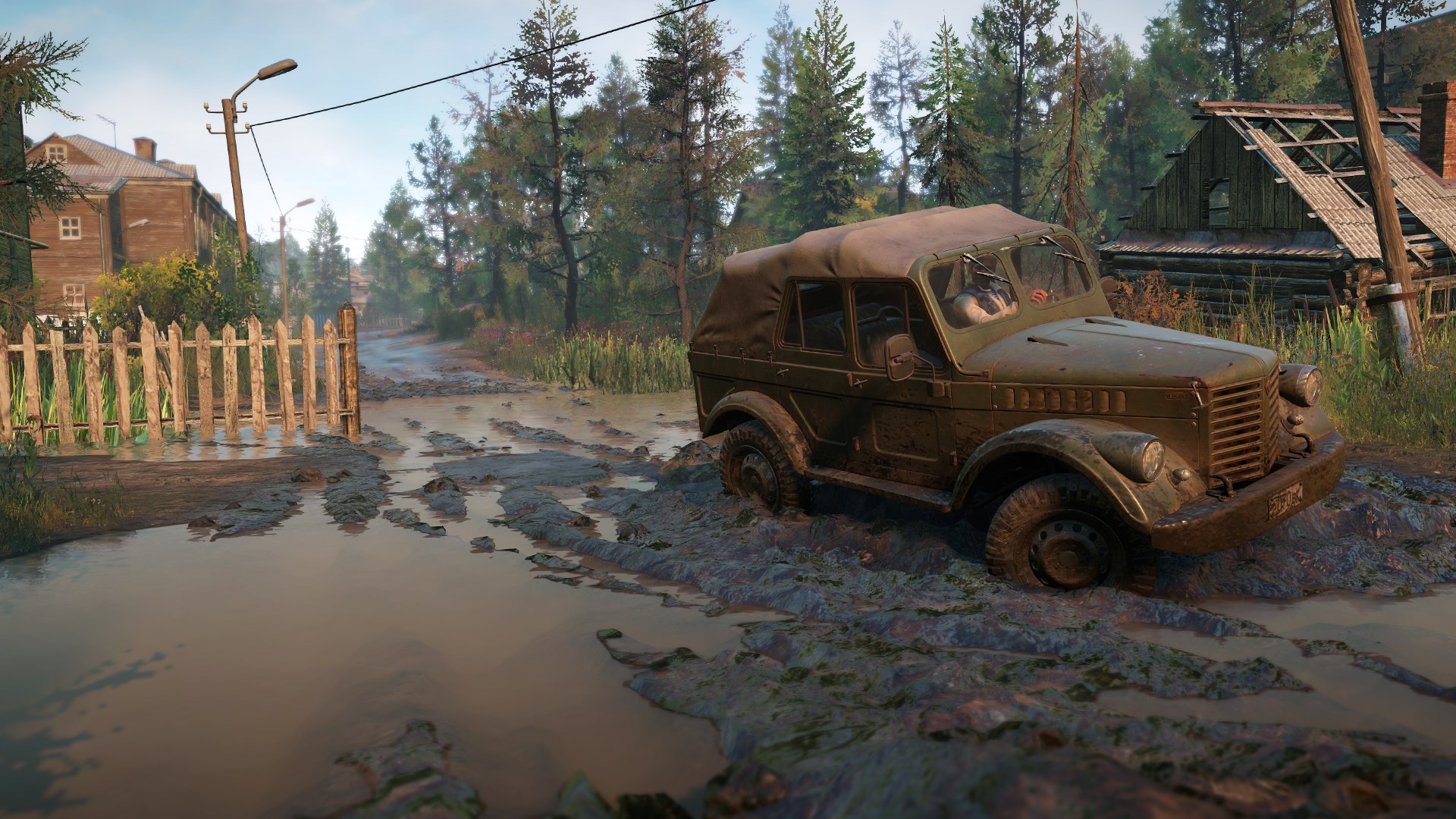 Snowrunner - mud simulation is on point.
Snowrunner - mud simulation is on point.
I enjoy the navigation challenges - you have to carefully map out your route, pay close attention to the terrain, and get familiar with vehicle behavior. Unfortunately, it’s one of the games where the progression (better tires, higher suspension, stronger engines) trivializes the best aspects of the game - navigating difficult terrain. I prefer the early game here, but it’s a good time.
A follow-up to SnowRunner, Expeditions: A MudRunner Game (2024), focuses a lot more on exploration and an expanded arsenal of tools - like radar, drones, or echo sounder. There isn’t much ferrying goods here, it’s all about trailblazing. I’m yet to play this one - it’s sitting somewhere in the middle of my backlog.
Personally, I’m really excited for Focus Entertainment’s next game: RoadCraft (although the studio confirmed that RoadCraft will not be on PC Game Pass from day one). Building roads after natural disasters sounds fun. RoadCraft should be out May 20th 2025, which may have already passed depending on how long it takes me to finish this post.
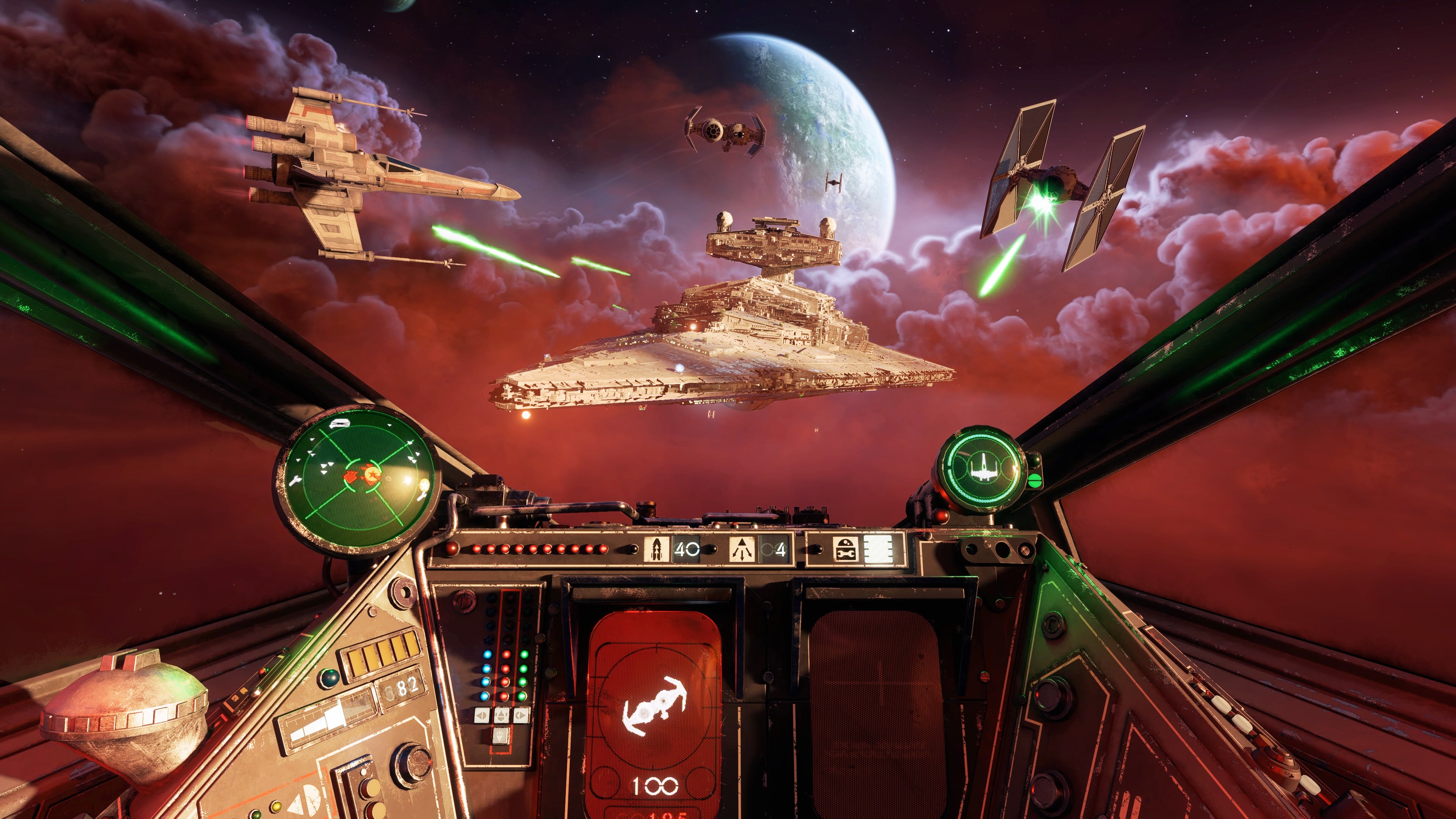 Star Wars Squadrons - every button and screen in the cockpit has a purpose.
Star Wars Squadrons - every button and screen in the cockpit has a purpose.
I played space combat game Star Wars Squadrons (2020) with a HOTAS - the cockpits are tactile, fighters are responsive, the sounds are taken straight from the films, and the dogfights keep you at the edge of your seat. It’s a largely arcadey title, and you don’t need HOTAS to enjoy it (although a controller might be strongly recommended).
I also have my eye on Star Trucker (2024). It’s a silly premise (yeah, these are your American 18-wheelers, in space), but I’m a sucker for Americana aesthetic, and I like the idea of maintaining my space truck. Star Trucker is high up on my backlog.
Platformers and metroidvanias
I’m not very good at platformers. I’m especially bad at side-scrolling 2D games, don’t ask me why - reduce the number of dimensions and watch me stumble. Lo and behold, this is a fairly short category, despite a sizable number of PC Game Pass offerings in the genre.
For the next few games, we’re again going back to my uncle’s house. There, in a corner of the master bedroom, sat a PlayStation 1 - with many great titles on it - including Spyro the Dragon and Crash Bandicoot.
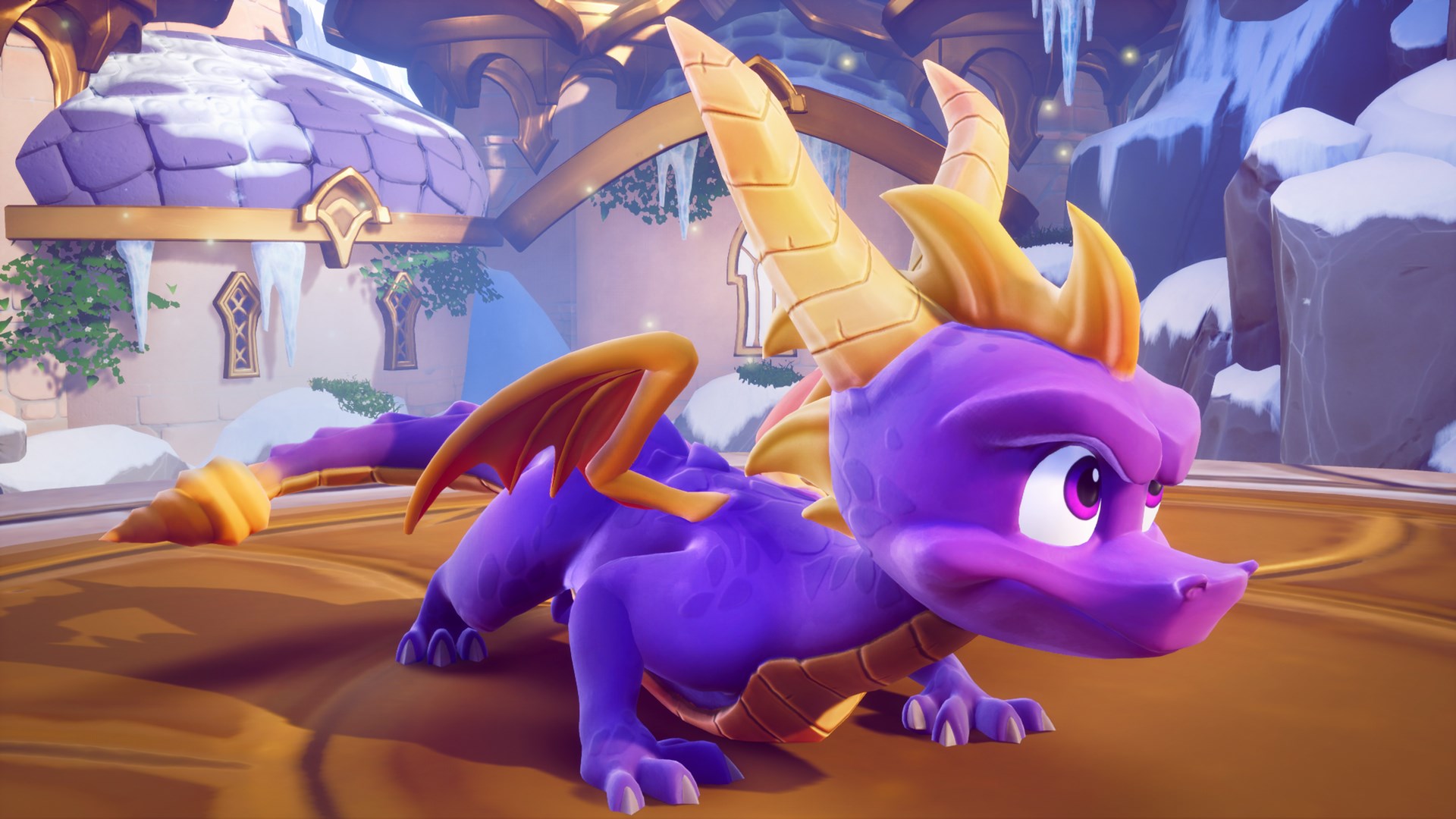 Spyro Reignited Trilogy - originally Spyro was supposed to be green, but he kept blending in with grass during development.
Spyro Reignited Trilogy - originally Spyro was supposed to be green, but he kept blending in with grass during development.
Spyro Reignited Trilogy (2018) is a faithful remake of the original Spyro games from 1998 to 2000 - Spyro the Dragon, Spyro 2: Ripto’s Rage, and Spyro: Year of the Dragon. Spyro is a third-person platformer starring a charmingly late nineties titular protagonist. The worlds are colorful, the collectible gems are plentiful, and the movement feels right. Spyro’s too young to fly (outside of some specific levels), but he can glide. It’s hard for me to look at Spyro without the rose-tinted glasses of nostalgia, but it’s good old PG-rated fun - and the remake makes it hold up to modern titles.
Crash Bandicoot N. Sane Trilogy (2017) is a remake of the 1996-1998 beloved 3D platformer: Crash Bandicoot, Crash Bandicoot 2: Cortex Strikes Back, and Crash Bandicoot 3: Warped. Bandicoot is a type of marsupial native to Australia and New Guinea - it looks a bit like a large mouse. Crash doesn’t much look like a bandicoot, but he is undoubtedly cool - sporting jeans and leather jacket energy, without needing to wear the latter. You run through various linear levels filled with thematic obstacles - be it during prehistoric times chased by a dinosaur, dealing with the mummies of ancient Egypt, or being attacked by UFOs in the far future. There’s pure platforming, but also racing and flying mini-games - many levels have a unique gimmick that keeps the game fresh.
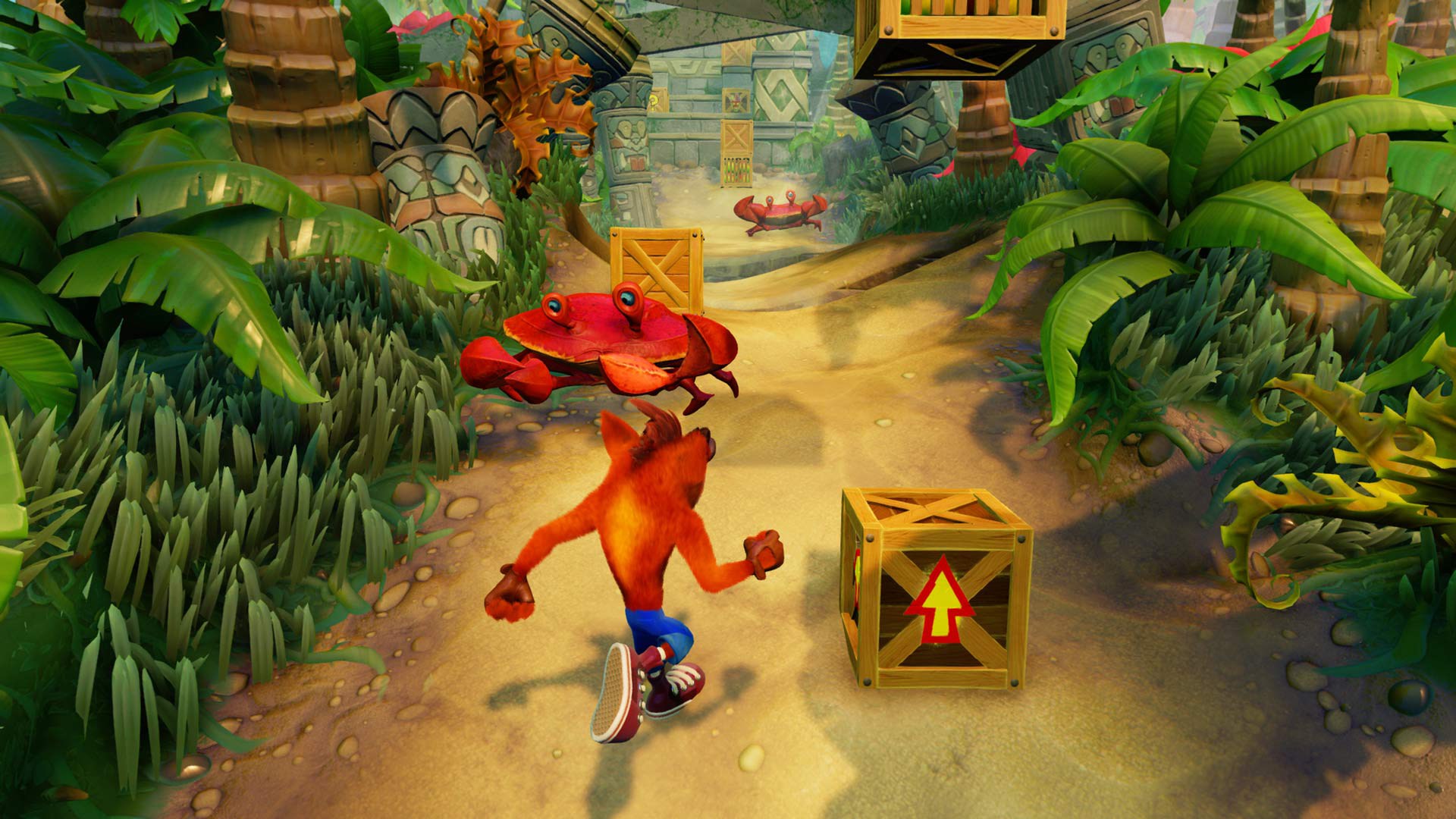 Crash Bandicoot N. Sane Trilogy - run ever forward, jump on the boxes, avoid the crabs - it’s a simple life.
Crash Bandicoot N. Sane Trilogy - run ever forward, jump on the boxes, avoid the crabs - it’s a simple life.
Again, this is one of those titles I have a hard time looking at without nostalgia, but the game feels great to play - be it for long play sessions, or just as a quick pick-me-up.
Now, let’s talk about 2D side-scrolling and platforming games. There’s something about a 2D side view that doesn’t sit well with me - and these are games I generally haven’t played through far enough. These games look exciting, they seem like something I should enjoy, but something just doesn’t click. And that’s fine, and I still want to share my experiences.
A smaller 2D title on this list is Carrion (2020) - this one is a reverse horror game - you’re the monster, and it isn’t scary - although filled with gratuitous gore. You play as a constantly mutating ravenous piece of flesh, and employees and security at a secret facility are locked in with you. You grow as you eat people, which gives you new abilities, and sometimes you might need to shed biomass to slip through smaller spaces or remain undetected. It’s a cool premise, but I got bored after a couple of hours - it’s a tightly controlled, linear experience, with often one right way to approach each encounter.
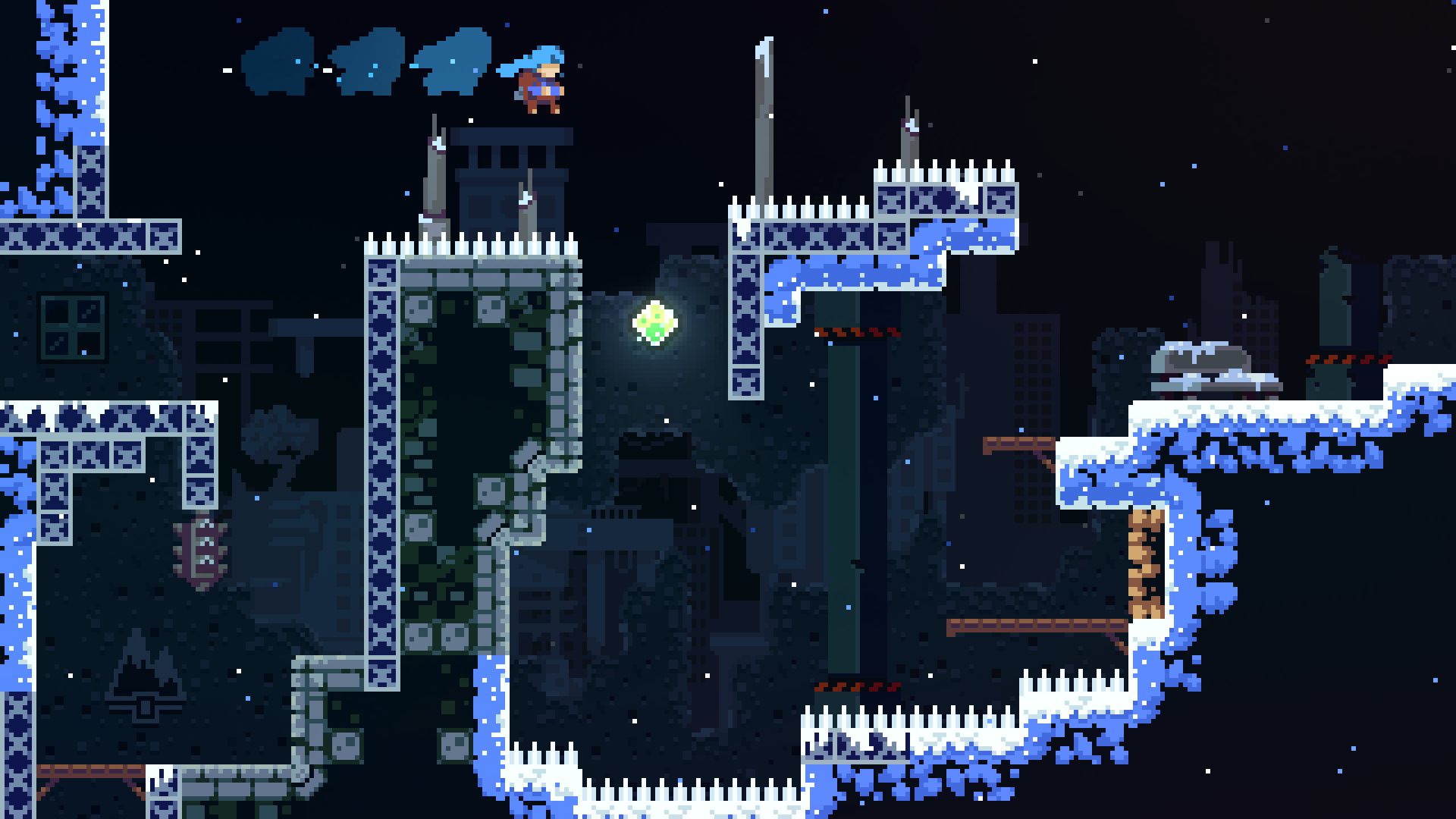 Celeste - not every game is for me, but I still know a good game when I see one.
Celeste - not every game is for me, but I still know a good game when I see one.
Celeste (2018) is a precise, focused, difficult 2D platformer, widely recognized for fluid movement and an emotional story. Playing Celeste confirmed my lack of interest in side-scrolling platforming games - here I could see a quality game that wasn’t for me. I put it down after an hour of playing. I don’t have much useful to add here, I guess I just wanted the world to know that I didn’t much care for Celeste.
I spent noticeably more time than that with Dead Cells (2017): a 2D side-scrolling roguelite metroidvania focused on fast-paced combat. I enjoyed how punchy the combat felt, but I eventually lost interest - while it was fun to watch my arsenal build up with each death, I generally don’t like games that get easier as you play them - no, as I get better - I want the difficulty to stay the same or even go up, not trend down because of all the items I have. But that’s my own pet peeve with the roguelite formula.
I spent the most time with Hollow Knight (2017) - a charming 2D scrolling metroidvania, complete with a melancholic atmosphere, exploration, and nail-biting difficulty. You’re some kind of an insect knight exploring a fallen kingdom plagued by a disease. I did eventually hit a wall when it came to my own abilities - stuck between what felt like an unbeatable boss and an impossible (for me) platforming challenge - I am bad at 2D platforming and combat, so this isn’t surprising. Still, I enjoyed my time with Hollow Knight, even if not everything in it is my cup of tea - and it’s the furthest I’ve ever gotten in a 2D side-scrolling adventure of any sort.
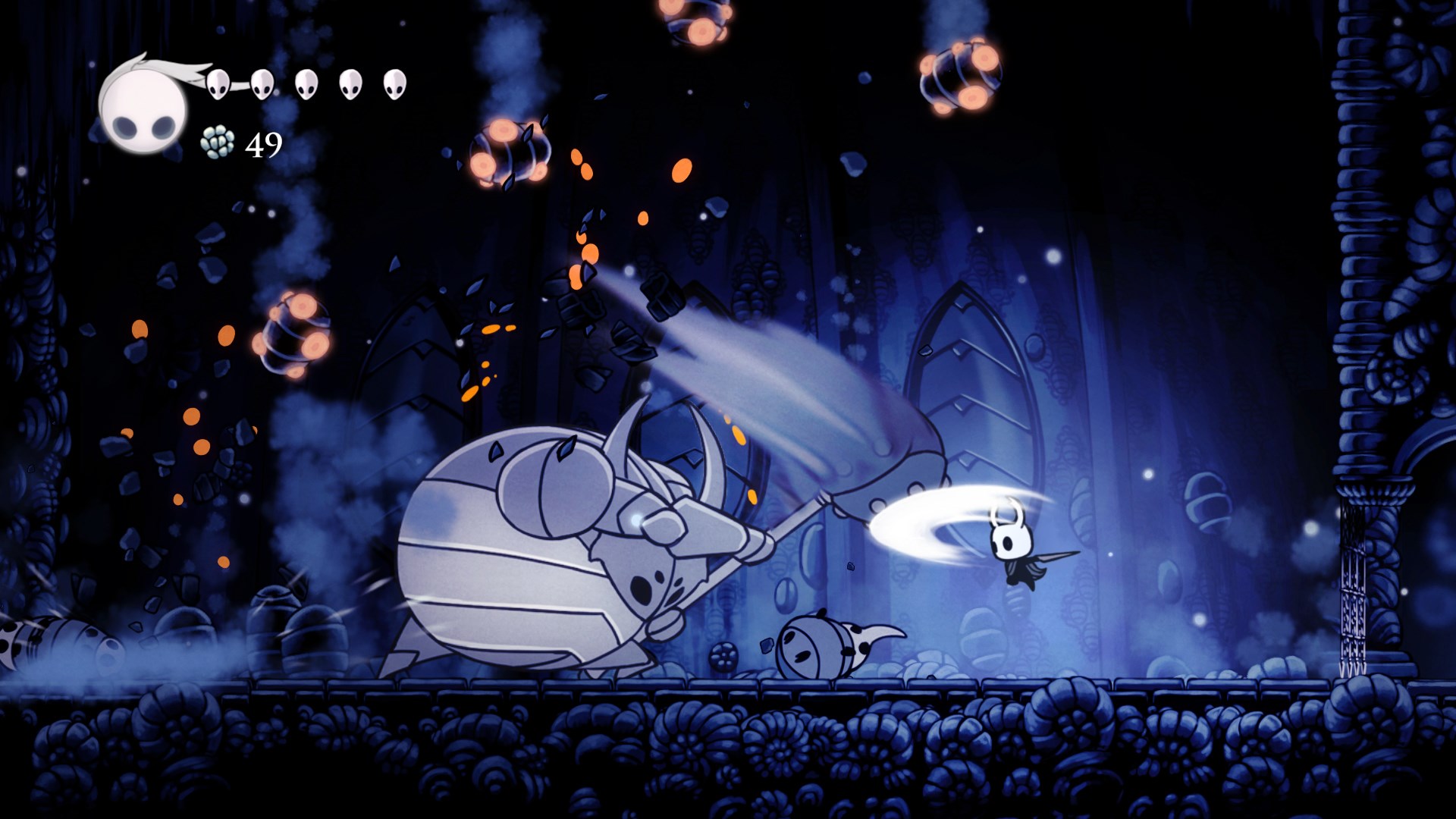 Hollow Knight - you’re about to be smashed to pulp.
Hollow Knight - you’re about to be smashed to pulp.
Going back to three-dimensional space, Mirror’s Edge (2008) and Mirror’s Edge Catalyst (2016) are stylish first-person free-running platformers set in what at first glance appears to be a utopian city. But not all is as it seems: the protagonist Faith is a runner - an underground courier who uses the power of parkour to deliver messages, evade authorities, and fight against oppression. The story isn’t particularly memorable - I had to look it up on Wikipedia when writing this - and it’s already out of my mind. But the mechanics easily make up for it - this is the best first-person parkour game I know of, and running through the (linear) levels puts you in a state of flow.
While I can’t speak as authoritatively about platformers as I can about role-playing games, I would recommend picking up Spyro Reignited Trilogy (2018) if you’re looking to scratch that platforming itch. It’s colorful, not punishingly difficult, but includes optional challenges and contains many mini-games to break up the platforming gameplay.
Puzzles
I haven’t played too many puzzle games available on PC Game Pass: but tit does include a few games I deeply enjoyed.
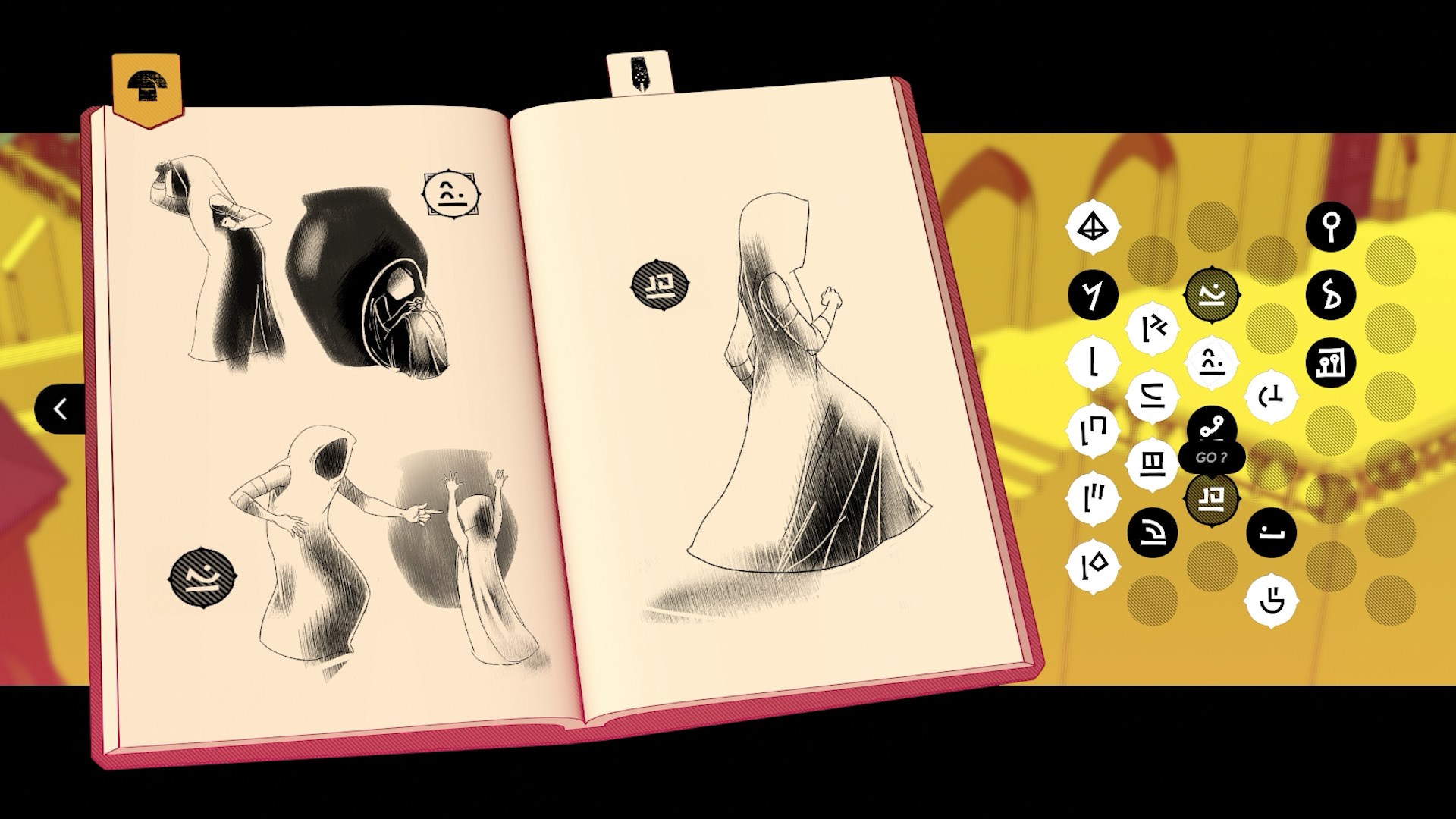 Chants of Sennaar - a handy journal helps in mapping out alien characters to concepts behind them.
Chants of Sennaar - a handy journal helps in mapping out alien characters to concepts behind them.
Chants of Sennaar (2023) is a fictional language deciphering puzzle game. You navigate your way through segregated tribes who all speak different languages - and each language has unique lexical and syntactic quirks; you have to figure out what words mean to learn more about each tribe and uncover the game’s mystery. It’s that type of puzzle game that isn’t particularly difficult or obtuse - but makes you feel smart for figuring things out nonetheless.
Superliminal (2019) is a first-person surreal puzzle game focused on optical illusions and forced perspective. The premise was interesting, but there wasn’t that much of a story here, and I haven’t finished Superliminal. But the puzzles felt particularly well-tuned.
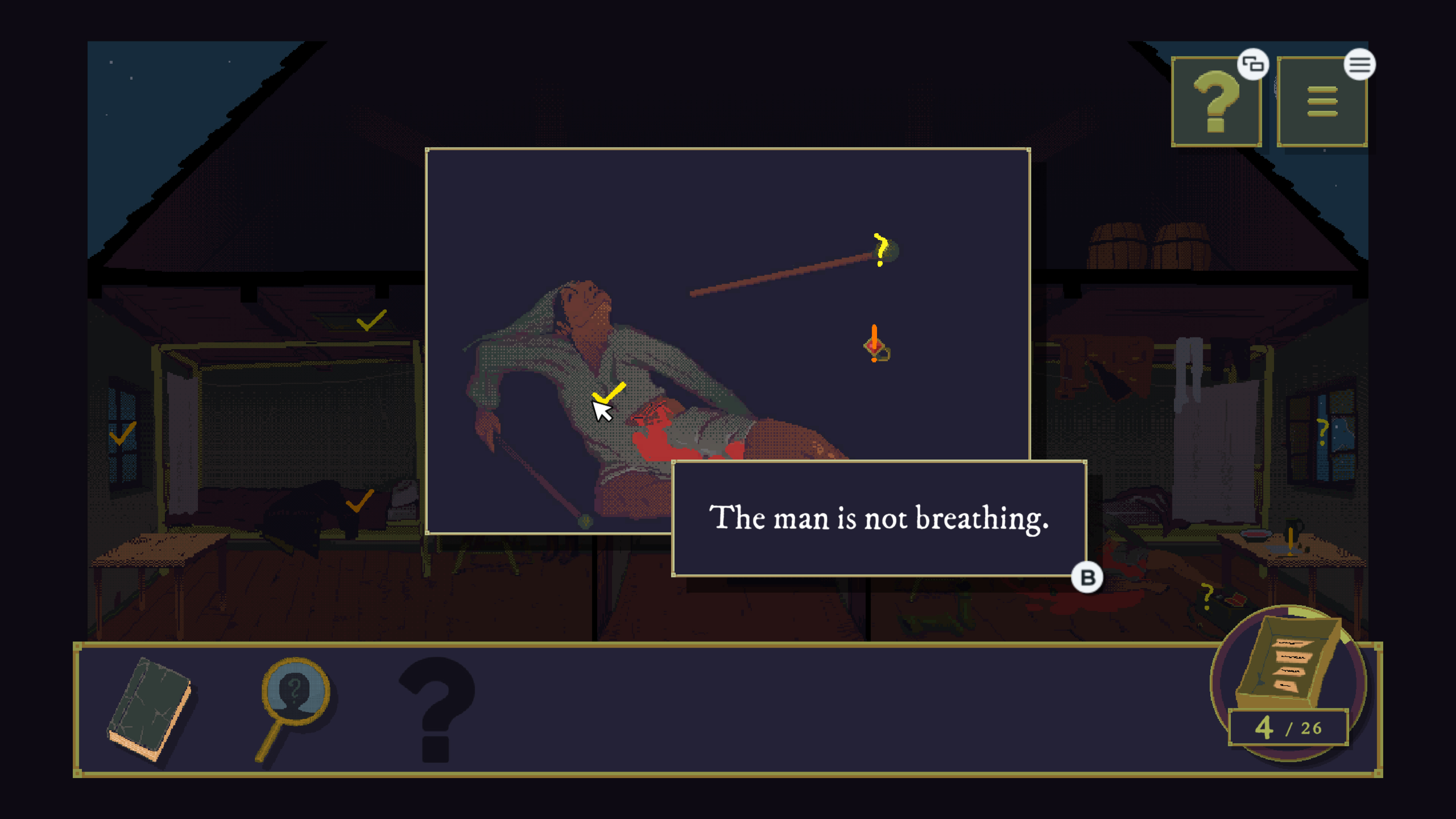 The Case of the Golden Idol - it took me good half an hour and a dozen environment clues to figure out who killed this man.
The Case of the Golden Idol - it took me good half an hour and a dozen environment clues to figure out who killed this man.
The Case of the Golden Idol (2022) is a who-done-it puzzle game where you explore still stylized pixel art vignettes. It reminds me a lot of Return of the Obra Dinn - the mysteries are hard to decipher, but offer enough bite-sized puzzles contained within to eventually lead you to a solution. The scenes tell a fun story, and each solved stage fills out a new piece of the narrative.
If I had to recommend one game from this admittedly short list - it’d be easily Chants of Sennaar (2023). This was one of the top games I played last year: translating alien languages and diving into each tribe’s culture is extremely engaging, and figuring out the mystery behind the game was satisfying.
Miscellaneous indie darlings
Look, categorization is hard. These games just do unique and fun things that are hard to put in a box - or maybe there’s nothing unique about them - and the box is just too small in relation to other titles on PC Game Pass. This is pretty much a catch-all for games from smaller studios, games that might be slightly less formulaic than their brethren.
Among Us (2018) became particularly popular throughout the pandemic - you play with real people, and one of you is a traitor. You must figure out who by voting, all while the traitor gets rid of players one-by-one. I only included it on this list because I want more people to know that it’s inspired by Space Station 13 (2003, still updated), a much more complex and detailed game I spent countless hours in. It’s awesome, it’s free, you should check it out - see you in a few months.
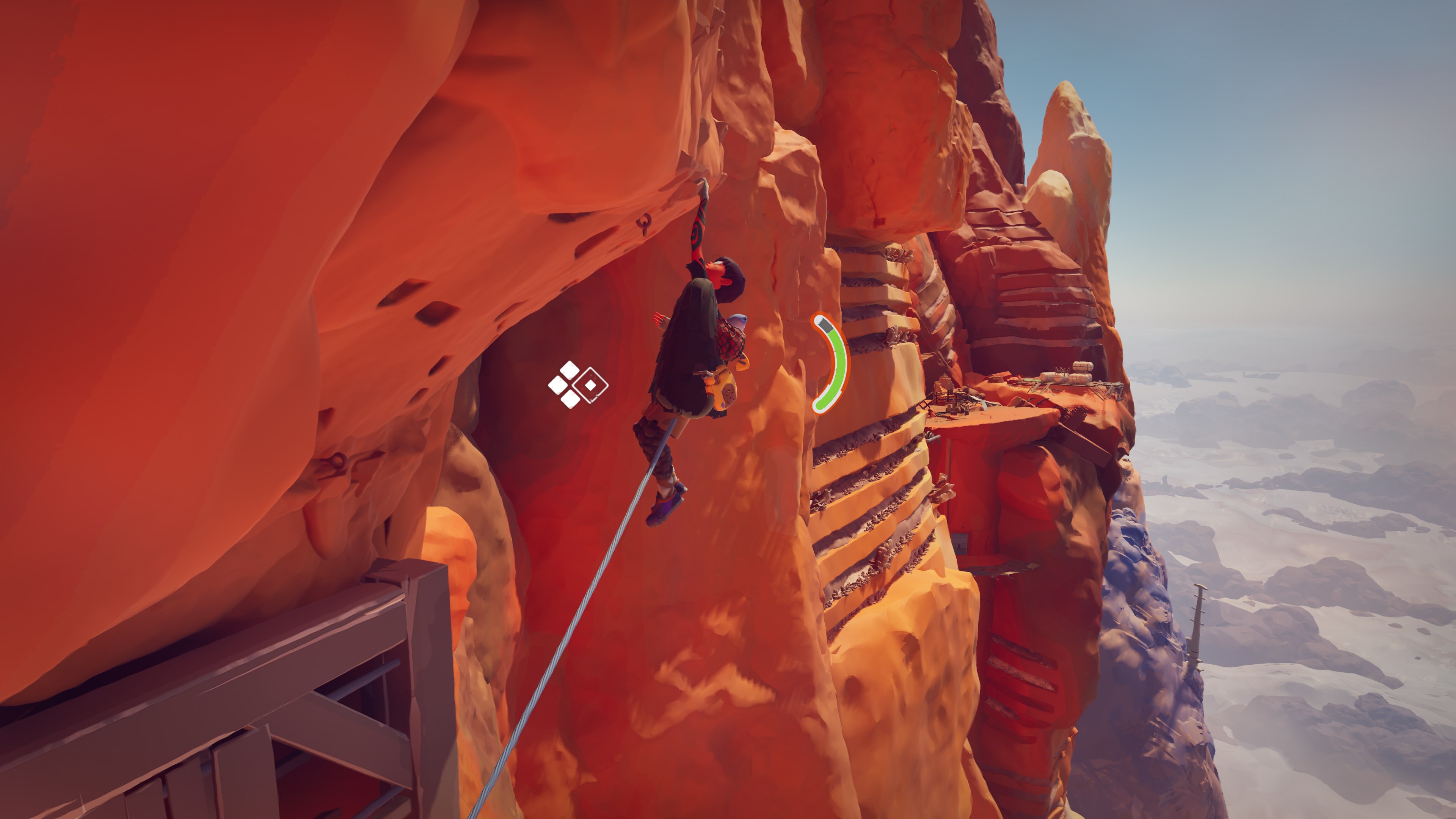 Jusant - climbing isn’t particularly difficult or complex, and can be meditative. Unfortunately I found myself dozing off.
Jusant - climbing isn’t particularly difficult or complex, and can be meditative. Unfortunately I found myself dozing off.
In Jusant (2023), you climb a mountain as you explore abandoned settlements carved into the cliff faces. It’s a cool premise, but I didn’t get pulled into the stories - I felt like I’ve experienced better-presented dead worlds in other titles. Still, a lovingly crafted title, and maybe slow-paced gameplay could be up your alley.
Balatro (2024) rightfully took the world by storm. I bought this for my wife who isn’t much of a gamer - but loves Solitaire - and lo-and-behold, sometimes I’ll jump in for a session or two. It’s a single-player poker game, but what makes it special is the jokers - some might increase your score if you use a certain type of card, some might change the way cards behave, and some… wait, that’s not a joker - that’s a driving license. Yeah, it gets silly at times, but the gameplay loop is satisfying and the best kind of addicting: offline and without microtransactions.
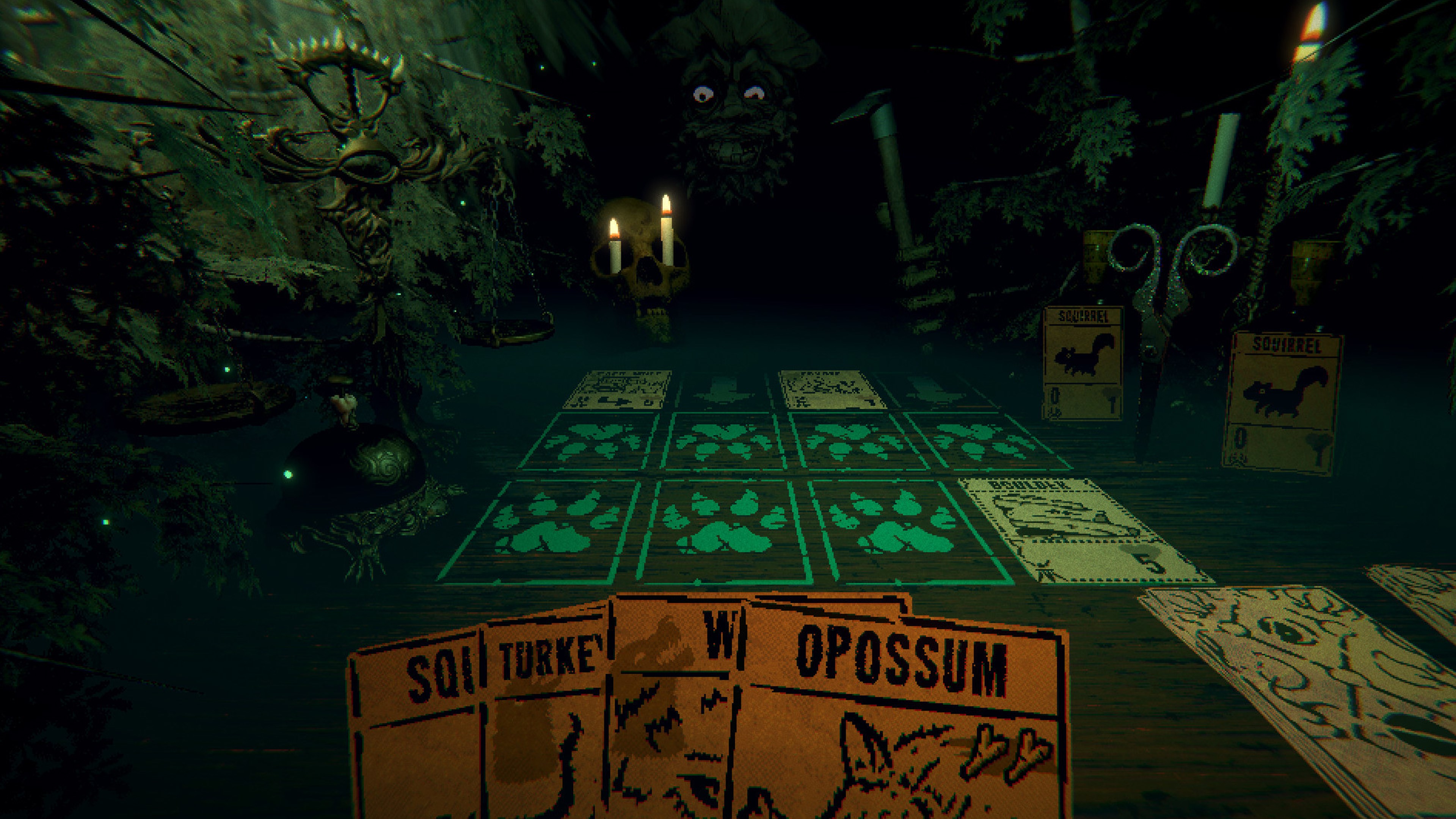 Inscryption both looks and plays weird - you never know what to expect.
Inscryption both looks and plays weird - you never know what to expect.
Inscryption (2021) is a deeply weird deck-building roguelike that’s full of surprises. I, for one, don’t generally like card-based games, but Inscryption is unique, and the less you know about it - the better.
Firewatch (2016) is a first-person mystery adventure game. Life happens, and Henry, the protagonist, finds himself escaping into the wilderness to spend the summer at a fire lookout. There’s another lookout on the horizon - too far to walk there, and a woman named Delilah is on the other end of the radio - you often end up having conversations. It’s a grounded, heartfelt, emotional, slow-paced adventure as Henry explores his surroundings after eerie things begin to happen near the lookout.
Fun fact, I remember reading somewhere that the US Forest Service saw a meaningful uptick in inquiries for fire watch positions. Full disclosure - a quick search didn’t turn up any evidence, but that’s a rather odd fact for my memory to make up. That’s exactly how misinformation starts to spread, doesn’t it?
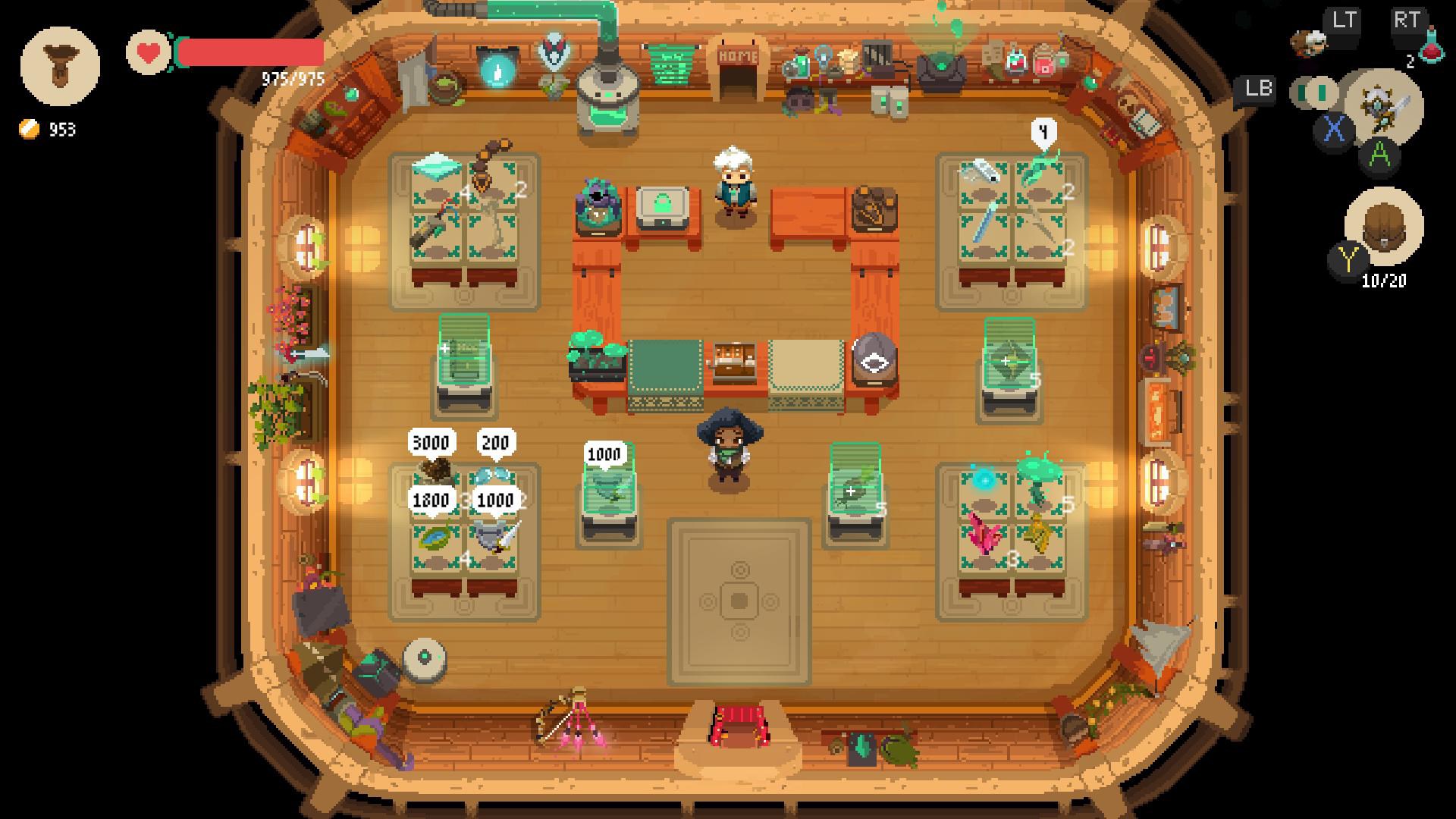 Moonlighter - your shop is cozy, and figuring out the price to sell the items is a simple but fun mini-game.
Moonlighter - your shop is cozy, and figuring out the price to sell the items is a simple but fun mini-game.
In Moonlighter (2018), you manage a shop during the day, and go dungeon delving by night. There are fun shop-based mechanics around trying to guess the price of items and controlling supply and demand, and isometric dungeon delving is serviceable (although it does surface my perhaps genetic inability to play 2D games well). I had a good time with this one, but the gameplay felt somewhat repetitive after the first couple of hours - and one day I just didn’t open the game back up.
Spiritfarer (2020) is a cozy management game about death. As the name implies, you ferry spirits in the afterlife - you make room for them on your ship, you learn about their stories, grow vegetables and cook food they like, play mini-games, and complete small quests for them. Once the spirit’s happy (and often after you become friends with them), they cross over to the afterlife.
In Stardew Valley (2016) you quit your corporate job to take care of your late grandfather’s farm. It’s a quintessential cozy and relaxing game: you spend the day farming and homesteading, building relationships with the townspeople, and occasionally exploring and spelunking in caves. Your energy limits how much you can do each day, and the game lends itself to short bursts. What I find funny is how many guides there are online about maximizing profits, fast-tracking relationships, and unlocking all there is to unlock - which feels like it defeats the purpose of the game.
 Unpacking - intimate, personal environmental storytelling at its finest.
Unpacking - intimate, personal environmental storytelling at its finest.
Unpacking (2021) is a cozy, at-your-own-pace environmental storytelling game. You follow the life of the unnamed and unseen protagonist right after each move into a new place - starting in their childhood bedroom, following them to a college dorm, and so on. You unpack the boxes: placing some familiar and some new items throughout the stage. It’s relaxing, the pixel art’s cute, and the music is calming. There are a few surprisingly emotional beats which I won’t spoil - but it’s a great example of gameplay and narrative working together.
Tunic (2022) is a beautiful Legend of Zelda-inspired isometric puzzle action-adventure game. Or something like that, it’s hard to properly categorize Tunic. One of the best parts about Tunic is that knowledge is the primary progression system in the game: most game mechanics must be discovered. You see, Tunic comes with an in-game manual - except that it’s in a (made-up) foreign language, pages are scattered throughout the game, and there are notes and marks on the margins. There are many puzzles here, and some are significantly harder than others - there are a number of optional puzzles I just couldn’t grok (but chose not to look up - I guess these will stay a secret forever).
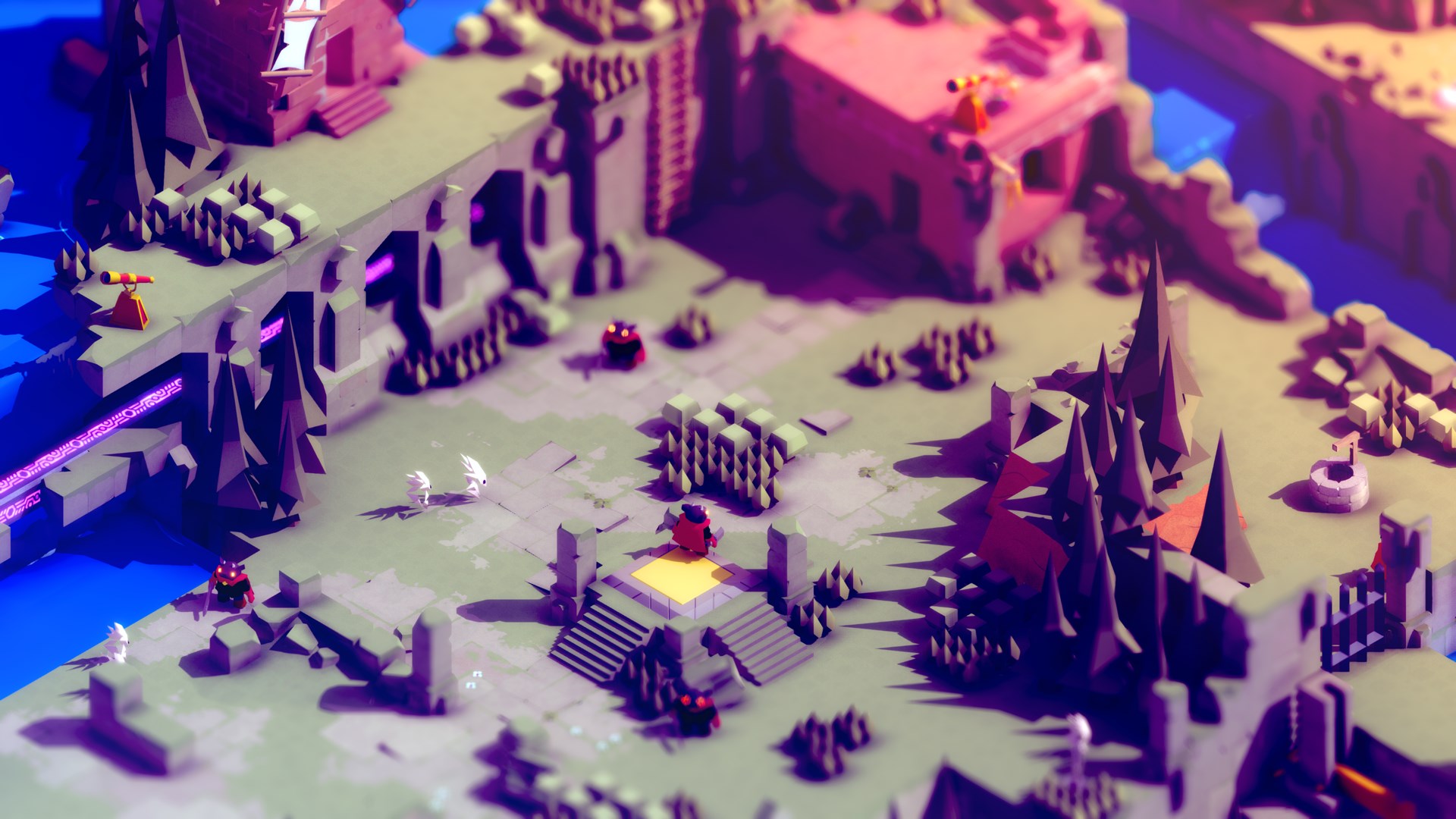 Tunic oozes charm, and this screenshot alone contains half a dozen of secrets I didn’t know were there at first.
Tunic oozes charm, and this screenshot alone contains half a dozen of secrets I didn’t know were there at first.
Tunic is the type of game you could only truly experience once. It’s like The Outer Wilds in that regard, and because of that I highly recommend diving in.
Superhot: Mind Control Delete (2017), is a first-person shooter. Then why is this game not with other shooters? That’s because of a core mechanic of the game: time moves only when you move. It’s genius, really - you get placed in seemingly unwinnable situations, and, since you have all the time in the world (including infinite retries) to figure your way out of one. What’s cool is that after you succeed, you get a playthrough of the action - which always looks undeniably cool, like the scenes from The Matrix. The game tries to have a story, but falls flat - it’s all about the puzzle-action-combat here, and that’s fine.
These are all such different games, and recommending only a couple wouldn’t do these “Miscellaneous indie darlings” justice. Now, if there was only one game on this list I could recommend, it would be Tunic (2022). The way it handles teaching the player about both the game world and the game rules is fresh and exciting – it’s an experience you’re unlikely to find elsewhere.
Couch co-op
I do have a non-gaming wife, who I love very much, but whose taste in games is limited to solitaire and sudoku. While I’ve had some success getting into more “proper” gaming titles (I’m still planning to write about that - spoiler alert - Diablo III local co-op rules), we did play some co-op games that I see on PC Game Pass. We haven’t finished any of these, but had some fun nonetheless.
Rapid fire notes, since most games are good if you play them with people you like.
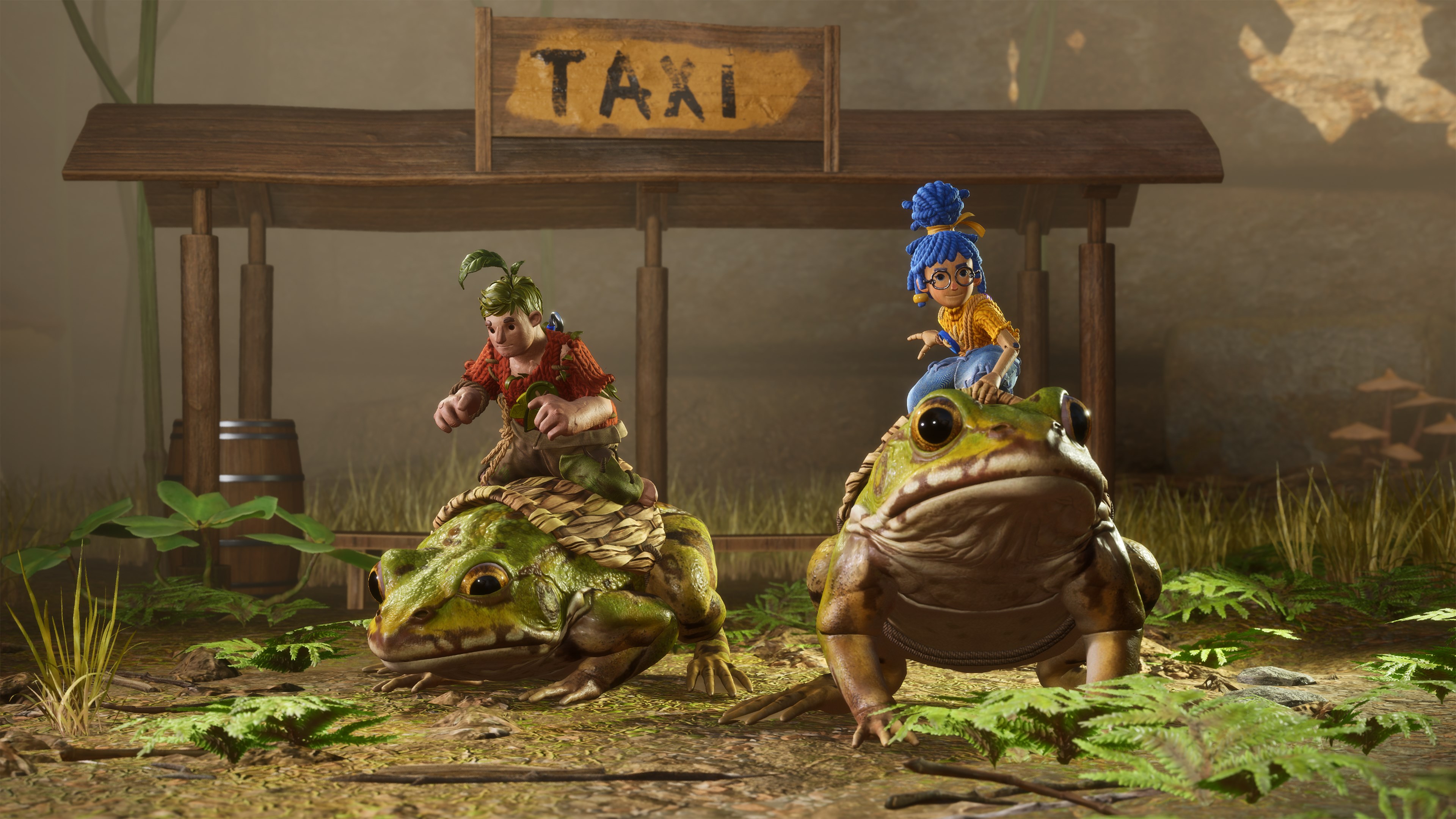 It Takes Two - all aboard the toad taxi service.
It Takes Two - all aboard the toad taxi service.
- Human: Fall Flat (2016) - a light-hearted physics-based platformer. Your doughy little people are trying to complete various light puzzle and platformer stages.
- It Takes Two (2021) is awesome - it’s a modern high-budget co-op only game about
the power of divorcecoming together as a couple after being trapped in dolls’ bodies. Platforming, light puzzles, and plentiful mini-games all in split-screen. - Overcooked! 2 (2018) - have you ever tried cooking with your partner in a cramped kitchen under time pressure? It’s like that, but the tables keep moving around and there are cars occasionally driving through the middle of the kitchen. Ridiculous and engaging.
- Unravel (2016) is a puzzle platformer with a main character made of yarn, and it doesn’t support co-op. However its sequel - Unravel Two (2018) - is built with co-op in mind, and it’s fun to use the yarn the characters are made out of to solve simple puzzles together.
Honorable mention here should go to LEGO Star Wars: The Skywalker Saga (2022) - I haven’t played this one (but I do own it on Steam, with a hope to sometime pick it up), but the LEGO games are always a great time for co-op.
If you’re looking for an easy to pick up and engaging couch co-op game, look no further than Overcooked! 2. It’s silly, the games are fast, and your cooking sessions will always devolve into glorious chaos.
Racing and sports games
I don’t play many racing and sports games (as indicated by me lumping those into the same bucket). When I was a teenager I spent my fair share of time with the Need for Speed series, with the most time spent on Need for Speed Underground - and that’s not even on game pass. So here we are, out of over 50 series and titles I recognize to be racing or sports games on PC Game Pass, I haven’t played a single one. There’s nothing particularly wrong with that, I just think that’s weird and worth highlighting.
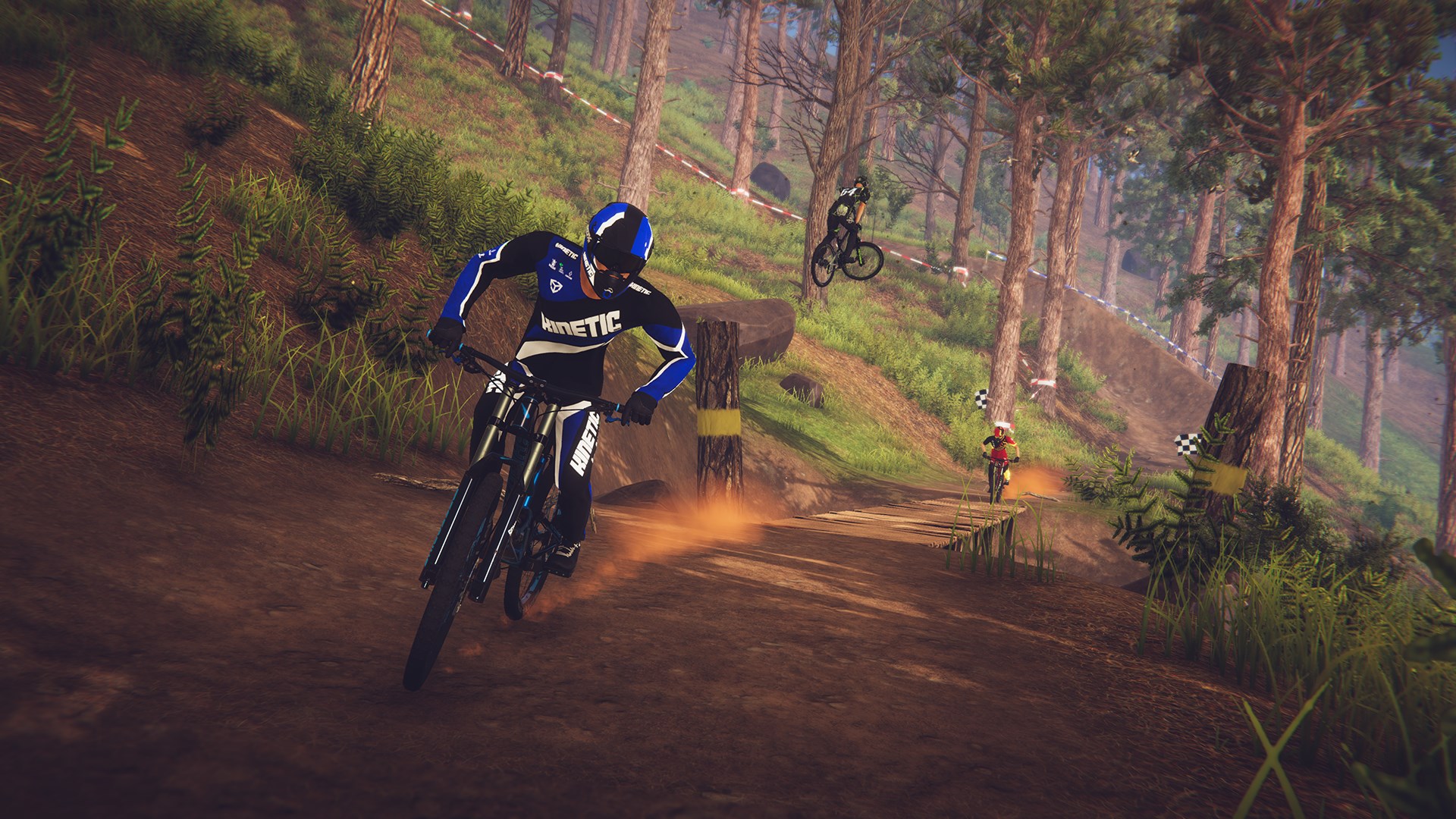 Descenders - there - I tried both a sports and a racing game all in one package, and I was terrible at it.
Descenders - there - I tried both a sports and a racing game all in one package, and I was terrible at it.
After outlining this section I decided to try out at least one game: Descenders (2018). A roguelike downhill mountain biking game. The roguelike concept seemed interesting, and I gave this a shot for an hour. Big surprise - going downhill fast was fun, but I’m terrible at steering a digital bicycle, and I don’t think I’ll be touching digital handlebars any time soon.
And with that, I think I’ve gone through all the titles I’ve spent a meaningful amount of playtime on. Dobby is free!
Closing thoughts
Writing this up turned out to be a tremendous undertaking. You might be wondering, who the hell am I writing this 15,000-word word salad for? Myself, mostly. I love video games, and I love hearing what people think about video games, so having a lore dump of surface-level thoughts about over a hundred titles felt like a fun thing to do. And it was cool to see that throughout my tenure as a hobbyist gamer I’ve played through a sizable portion of games available on PC Game Pass.
Originally I intended to cover every PC Game Pass game - even the ones I haven’t played, but that turned out to be a monumental task, and it just didn’t feel like I could write up something meaningful for those games. I did complete the majority of the research for games I wasn’t familiar with though, and it’s cool to know what a good 95% of PC Game Pass games are generally about.
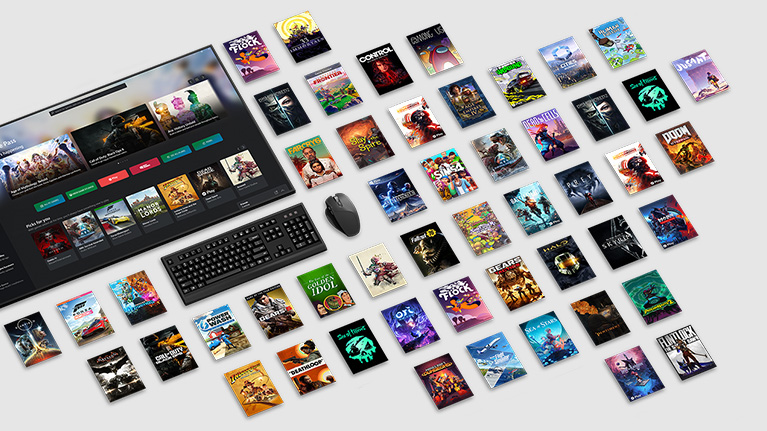 Over 400 titles (although probably less if you don’t double count re-releases)… Still, that’s ridiculous.
Over 400 titles (although probably less if you don’t double count re-releases)… Still, that’s ridiculous.
There’s a sizable number of series with either a first, last, or middle game missing. For instance, modern Lara Croft games are missing the second entry, the first Watch Dogs isn’t featured, Crysis: Warhead isn’t included. That’s surprisingly common, and can put a major damper on playing through a series if a game grips you.
Then, of course, many titles included on PC Game Pass don’t include DLCs, with the hope to lure you in for more purchases. I guess that’s fine given the price of PC Game Pass, but it’s something you should probably keep in mind if you’re signing up for PC Game Pass for a specific couple of games.
After this exercise, I plan to keep my PC Game Pass subscription for a couple of months while I catch up on some key backlog titles. I have complicated feelings when it comes to game ownership, and I might choose to purchase games outright if I like them – especially if a DRM-free version is available for purchase.
Comments
Respond directly on Bluesky (threads shown below) or Medium (view comments there).
 Rooslawn's Unmapped Worlds
Rooslawn's Unmapped Worlds